

How to enjoy sustainable tourism in Mallorca: 21 ecotourism experiences for every traveller to enjoy
Mallorca & Ecotourism might not be two words you’d immediately put together – but they will be soon.
Better known for its countless dreamy beaches and its enviable climate, Mallorca isn’t the kind holiday destination you might associate with responsible travel.
In fact, it’s best known as exactly that: a classic holiday destination.
And, while Mallorca boasts all the usual sun, sea and other tourist attractions, it’s an island that’s very much taking a proactive approach to making its booming tourism industry as sustainable as can be.
It’s a welcome – albeit somewhat surprising – transition for the island better known for its nightlife (hey, Magaluf) than its nature.
But Mallorca isn’t a destination that nature lovers will want to overlook. In fact, it’s one of the best Mediterranean destinations you can visit if you’re looking to travel responsibly in Europe.
Just to let you know… This post (probably) contains affiliate links, including Amazon Associates links, and I may receive a small commission if you click one. This is at no extra cost to you and allows this site to keep running.
Why sustainable tourism in Mallorca is a big deal
The best things to do in mallorca, mallorca tips for responsible travellers.
There’s a reason why hearing about ecotourism in Mallorca sounds more surprising than, say, elsewhere in Spain .
Simply put, the odds are generally stacked against any kind of sustainable tourism in Mallorca. And a lot of that comes down its geography.
The effects of tourism in Mallorca
As an island, Mallorca’s geography poses a number of challenges. Resources, waste disposal and the increased threat of climate change are all issues that are amplified by the increased population that tourism brings.
More than 14 million people visited the Balearic Islands in 2019 – most of whom would have had to travel by air.
As the largest and best known of the Balearic Islands, Mallorca receives the vast majority of tourists to the region.
To put it into perspective, Mallorca receives more than 3 times as many tourists as Ibiza , which is the next most popular island, and around 10 times as many tourists as Menorca .
Add to this that both Ibiza and Menorca are arguably better known for their natural landscapes, outdoor adventures and numerous eco-resorts, it’s easy to overlook Mallorca’s as a destination for eco-conscious travellers.
But that’s also why the push towards sustainable tourism in Mallorca is so significant.

The sustainable tourist tax in Mallorca: what you need to know
Despite the obvious challenges, the Balearic Islands shouldn’t be written off by responsible travellers. Far from it, the region is an awesome destination for anyone looking for a sustainability-conscious getaway.
The Balearic Islands are extremely proactive in making tourism on the islands as sustainable as possible.
The sustainable tourism tax (also sometimes called the ecotax) is one of the ways in which the islands continue to enjoy a thriving tourism industry – only in a way that’s much kinder to the environment.
Introduced in 2016, the sustainable tourist tax in Mallorca and its neighbouring islands is collected from every visitor to the region. It varies between 1-4 Euros per day based on the type of accommodation you stay in.
This ecotax is usually included within the price of the hotel, so you may not even notice it! However, its effect on the islands is unmissable.
At the time of writing, 165 projects – 62 of which are in Mallorca – have been funded by the 261 million Euros collected so far. Of this, the large majority has gone to environmental projects.
If you’re curious, you can read more on the Islas Sostensibles website (in English) .
While many of the projects funded by the ecotax in Mallorca happen behind the scenes, there are also plenty of projects that are already open (or reopen) to the public.
Even if you don’t come across any projects funded by the tax during your Mallorca travels, you can know that you are contributing to future projects on the island just by being there. Pretty cool, huh?

Why responsible travellers will enjoy Mallorca
Aside from Mallorca’s sustainable tourist tax and the incredible impact its having on the island, there are plenty of reasons why sustainable travellers will love Mallorca.
For a start, there is no shortage of fresh, local produce . After a week of eating my way across Mallorca’s vegan restaurants, this became even clearer when I checked into The Body Camp.
All of the food at camp was 100% vegan, 80% organic and sourced almost entirely from local farms. Mallorca is a destination where eating local isn’t just possible – it’s a way of life.
Despite the availability of fruits, vegetables and other great produce on the island, plastic waste is becoming a thing of the past. Mallorca brought in a ban on all single use plastics in March 2021. This ban will extend to water bottles soon.
More than anything, though, Mallorca is a beautiful island with so much nature to enjoy .
Now that Mallorca’s eco credentials have given it the seal of approval, let’s take a look at what there is to do while you’re there.
Here are some of the best things to do in Mallorca if enjoying and protecting nature is your priority.
Mallorca Ecotourism experiences
1 – hiking in mallorca.
There are too many hiking trails in Mallorca to possibly list them all, but many of them can be found in the impressive Serra de Tramuntana mountains.
This book alone lists 50 of the possible routes to explore. And, with the building of new refuges (thanks to the tourism tax!), multi-day hikes will be made even easier starting in 2022.
Even if you’re not an experienced hiker, there are plenty of shorter hikes to enjoy.
- The Castell d’Alaró hike offers beautiful views throughout and a little slice of history at the peak.
- Add a local touch and learn about the area on this guided hike in Pollensa .
- For something a little different, this mindfulness hike offers mindfulness training while enjoying bay views.

2 – Shop local brands
Mallorca is a vibrant island in many ways, not least because of the people. And many of its people are doing incredible things.
There’s no shortage of sustainable Mallorquin brands for fashion, footwear, cosmetics and more. Not only do they make for awesome souvenirs, but you’ll be giving back to both the planet and the local community by choosing them.
Some of them are available online – check out Nakawe for gorgeous, eco-friendly and ethical swimwear – but there are many more to discover while you’re there.
3 – Visit Cabrera
Situated just off Mallorca’s southern coast, the island of Cabrera is the only National Park in the Balearic Islands.
As well as having some of the bluest waters and some of the best-preserved marine life in the Mediterranean, the island is now largely powered by solar panels that were funded by the sustainable tourist tax in Mallorca.
The restoration of the famous Cabrera Castle is also another project that was funded by the Balearics sustainable tourism tax.
The only way to get there is by boat and, with limited numbers of tourists allowed on the island per day, you’ll want to book your ticket in advance .

4 – Enjoy Mallorca’s many Nature Reserves & Parks
Although Cabrera is the only National Park in the Balearics, there are plenty of ways to enjoy nature on the island of Mallorca itself.
Some of the best natural parks include Parc s’Albufera in the north east, Mondragó in the south east and the Serra de Tramuntana mountains that snake across the north.
It’s possible to get to many of Mallorca’s parks – or at least close to them – by bus. However, if you want to make the most of your time and see the best bits, you’ll want to rent a car.
5 -Sample Mallorca’s vegan cuisine
Spain might not be a country you associate with vegan food, but you may be surprised just how easy it is to find (good) vegan food in Mallorca.
There are some incredible vegan restaurants in Mallorca, as well as an abundance of health food, zero waste and vegan-friendly takeout stores.
My absolute favourite was Donna Vegana . Even if you’re not vegan, it’s worth making a trip here for lunch!
6 – Drink the local water
If there’s one downside to travelling Mallorca, for me it’s the fact that tap water across isn’t always potable.
That doesn’t mean you need to go through excessive amounts of plastic, though. The water from the Serra de Tramuntana mountain range is sold in glass bottles across the island and just happens to be some of the best-tasting bottled water I’ve tried.
When you can, stick to drinking locally source water in recyclable packaging to minimise waste during your Mallorca travels.
7 – Soak up Mallorca’s natural beauty
If you thought Mallorca’s beauty spots ended at the beaches and natural parks, think again!
There truly are countless spots on this island that will make you marvel at nature. These include a number of naturally scupted underground caves that are worth adding to any Mallorca itinerary.
The most famous caves are the Caves of Genova in Palma and the Caves of Hams in Porto Cristo , but there are plenty of others.
If you have access to your own vehicle, I recommend making a trip to the lesser known Caves of Campanet . Even in July, I had them all to myself for at least 15 minutes – an experience that was both magical and a little bit creepy!
The surrounding area makes for a relaxing drive, too. Plus there’s a café with awesome views to stop for a break.

Ways to ethically enjoy the Mallorca wildlife
While it may not have the abundant wildlife of a safari destination , Mallorca is home to over 300 endemic species of flora and fauna.
Here are several of the best things to do in Mallorca to spot some of the island’s animal inhabitants in their natural habitat.
1 – Spot a black vulture
Mallorca’s colony of black vultures isn’t just the only one of its kind on an island, but it’s also the only colony that is growing at a promising rate.
It makes seeing the once-endangered scavenger soar over the Serra de Tramuntana mountains an even more special sight, but it’s still quite a rare occurrence.
If you want to maximise your chances of a sighting, the Fundación Vida Silvestre Mediterránea runs vulture watching tours where the chance of sighting is high (but never guaranteed, of course!). The 4-6 hour excursion will take you deep into the Serra de Tramuntana mountain range and also includes a local snack.
Click here to find more information, contact the FVSM and book.
2 – Spend a day on Dragonera
Dragonera Island – or Sa Dragonera, if we use its full Catalan name – doesn’t get its title from its reptile inhabitants, but from its shape.
It’s just a coincidence that this dragon-shaped island off the north west coast of Mallorca also happens to be home to a lot of lizards!
The Lilford’s wall lizard is endemic to the Balearic Islands, making it a pretty special sighting for fellow wildlife lovers. Fortunately, it’s not hard to see them at all – the hard part is not accidentally standing on them!
Even if you’re not a huge lizard fan, Dragonera makes for an incredible day trip. Along with four hiking routes of varying levels (each with epic views!), it’s a unique spot to enjoy the beach, go snorkelling or soak up a little bit of nature in Mallorca.
Getting to Dragonera is easy, especially if you have a car. There are regular ferries from Port Sant Elm and the return trip costs 15 Euros per person (including a 1 Euro contribution to the ecotax).
If you prefer a more active adventure, you can also book a guided tour that includes both kayaking and snorkelling .

3 – Go bird watching in the south
Es Trenc Natural Park is a stunning area on the southern coast of Mallorca that’s home to a number of migratory birds throughout the year (and flor de sal all year round – but more on that later!).
The birds found here varies a lot with the season, but throughout the year you can spot flamingos, marsh harriers, Kentish plovers, yellow wagtails and osprey, among many others.
4 – Explore the ocean
As an island destination, spending time in or by the ocean is pretty much a given when visiting Mallorca.
The seas around Mallorca aren’t just beautiful to look at, either. Underneath their picture-perfect shades of blue lies a whole bunch of (highly protected) marine life.
Depending on how active you want to be, there are numerous ways to observe some of the local marine life yourself, from scuba diving and snorkelling , to sunrise dolphin watching tours .
RELATED READ: How to enjoy nature in Gran Canaria
Mallorca Agritourism
Farming is a vital part of the Mallorca economy. While the coast’s endless beaches – the part that most visitors see – keeps the tourism industry thriving, most of the interior of the island is dedicated to farming.
That doesn’t mean that these two industries never collide. In fact, some of the best ways to enjoy ecotourism in Mallorca can be found where these two worlds meet.
1 – The salt flats of Es Trenc
As iconic as the Maspalomas Dunes in Gran Canaria, Es Trenc is one of the most famous beaches on the island of Mallorca and also provides the ideal conditions for extracting quality sea salt.
The flor de sal is harvested in a sustainable way that uses natural filtration, uses no extra resources and protects the biodiversity of the nature reserve, making it a very special place.
It is possible to tour the salt flats and learn all about the harvesting process, and I highly recommend a visit.
At the very least, visiting the Flor de Sal d’Es Trenc shop to see the salt flats, try a flor de sal ice cream or pick up some flor de sal to take home is a must!

2 – Always eat local
With so much fresh produce grown right on the island, it’s not hard to eat local while you’re travelling Mallorca.
There are a number of restaurants across the island that pride themselves on using locally sourced, seasonal produce. These span a wide range of cuisines and include Es Pati, Es Fum, Can Beneit, Marc Fosh and Ocre.
Not all restaurants outwardly advertise their focus on local produce, so don’t be afraid to ask about ingredients while you’re there or to ask locals for recommendations. In my experience, everybody is very happy to share!
3 – Stay in a finca
Given how important agriculture is to the island of Mallorca, it’ll come as no surprise that there are a lot of farms.
If you want to enjoy a quintessential Mallorquin experience, you can stay on one of the many fincas that cover the island’s countryside.
Many guest houses are located inside converted farms, but others are still fully operational farms. If you choose the latter, there’s a good chance you will be able get involved with planting, harvesting or some other part of day to day operations.
4 – Sample award-winning honey
Mel Caramel is an organic and ethical honey farm that puts the welfare of the bees first. By focusing on small-scale production, they are able to produce honey to the highest quality while keeping to the strictest ethical standards.
If you are lucky enough to find some of this limited edition honey, it makes for a fantastic (and delicious!) souvenir.
5 – Learn about local produce
Why stop at simply trying the local produce when you can dive a little deeper?
There are several farms in Mallorca that offer guided tours and tastings so you can learn more about how the produce is grown and harvested.
With everything from olive oil to oranges to wine , there’s something for every palate.

Before you go, here are a few more travel tips to help you travel sustainably in Mallorca…
Bring a bottle and filter : While it’s easy to find locally sourced water in recyclable packaging such as glass, it’s better to skip the waste altogether. Pack a water bottle with a filter such as this one to minimise the need for single-use bottles.
Use reef-friendly sunscreen : If you plan to make the most of the refreshing Mallorquin sea, make sure you pack some reef-friendly sunscreen to keep you protected from the sun. This one is vegan, reef-friendly and free of nasties.
Choose a hybrid hire car : Hiring a car is pretty much essential if you want to see the best parts of Mallorca. Admittedly, i’s not the most eco-friendly way to get around, but a hybrid car will get you surprisingly far on very little gas. I drove for around 4-6 hours a day for a week and used less than half a tank of fuel!
Select your hotels mindfully : With millions of tourists visiting every year, the number of hotels needed to accommodate them all can be overwhelming. While there are plenty of amazing hotels to choose from, Mallorca has some very special places that are worth seeking out.
Head away from the obvious resorts and you’ll find some hotels that won’t just surprise you, but may well be the highlight of your trip. That was the case for me when I stayed at Es Picarol Sineu , and I simply can’t recommend this totally unique hotel enough!
Take home souvenirs that support Mallorca’s sustainable initiatives : Whether you’re into food or fashion, Mallorca is an awesome place for shopping sustainably. With so many brands giving back in some way, it’s almost rude not to take a little something home with you…
Visit Mallorca in the low season: Mallorca is an island that is blessed with warm weather year-round. However, summer still remains the busiest season by far, especially for tourists who want to soak up the sun on the island’s enviable beaches. You can help reduce the less positive impacts of tourism on Mallorca by visiting in the autumn, winter or spring. Not only will you be travelling more sustainably, but you’ll be able to enjoy Mallorca’s nature at its best – without suffering in the summer heat!
About Jodie Marie Dewberry
Jodie has been travelling the world full time since 2017, sharing the most unique places in the world along with tips for living as a digital nomad. She is a passionate wildlife photographer and has worked with a number of prominent travel brands, including airlines, tourism boards, hotels and tour operators.
1 thought on “How to enjoy sustainable tourism in Mallorca: 21 ecotourism experiences for every traveller to enjoy”
Great article Jodie! Thanks for the tips, will definitely check out some of them when I am back on the island next year. I almost go every year to Mallorca. I went on a boat trip this summer, starting from Santa Ponsa and it was so great. They offer as well veggie and vegan options for the catering. And as they have a sail boat we almost did not had to use the engine, I like that very much! Better than these big excursion boats ;-) Cheers, Johan
Leave a comment Cancel reply
Save my name, email, and website in this browser for the next time I comment.

- South Africa
- Czech Republic
- United Kingdom
- United States
- Vegetarian Food
- Wildlife Travel
- Eco-friendly Accommodation
- Work With Me
- My Favourite Travel Products
Eco-friendly Accommodation , Ethical Travel , Spain , Vegetarian Food
Eco mallorca: how to have a sustainable (and enjoyable) trip to the balearic islands.
There’s a lot of positives to Mallorca – hours of sunshine, spectacular scenery and beautiful stretches of coastline, but sustainability? It’s not something you would normally associate with the Balearics. Until now.
The largest of the Balearic islands, Mallorca is an outdoor and responsible traveller’s dream. It offers responsible outdoor activities, vegetarian-friendly restaurants, sustainable accommodation and eco transport too.
So if you’re looking for advice on how to have a sustainable and eco Mallorca break, you’re in the right place.
Please note: This post is part of a paid campaign to promote the Balearic and Canary Islands, as part of their #SpanishIslands Campaign. However I’ve not been told what to write and all views are my own.
Responsible activities and natural sights on Mallorca
There’s a plethora of natural sights on Mallorca that are often overlooked in place of the island’s more adrenaline-filled, commercial attractions. Here’s my pick of the bunch to keep you entertained on your eco Mallorca visit.
Cuevas Drach
The Drach Caves are a huge network of caves close to Porto Cristo. They extend for 1.2km underground at a depth of 25 metres. Following the steps down into the caverns, you’ll pass stalactites and stalagmites at your own pace until you reach one of the largest underground lakes in the world – Lake Martel. Once everyone has made it down to this point, they entertain visitors with a short underground classical music concert to demonstrate the unique acoustics of this chamber, played on a boat that rows past you.
While the caves are worth a visit any time of year, they’re especially popular during the summer to escape the heat in the most natural way possible – underground!
>> Discover more of the best towns and villages to visit on your next trip to Mallorca !
S’Albufera Nature Reserve
S’Albufera Nature Reserve is a must-visit for wildlife lovers and those looking to explore the more natural aspects of this Balearic island. It’s an area of wetland on north-west Mallorca that’s very popular among birdwatchers thanks to its population of birds that visit throughout the year. It’s also considered to have the greatest biodiversity of anywhere in the Balearics.
You can explore the park by foot or by bicycle, but you must leave your car in a nearby car park. Alternatively, you could join a guided tour that runs every Saturday. This is a great way to enjoy the park whilst learning about the wildlife that call it home.
Tramuntana Mountains and the surrounding villages
Serra de Tramuntana, or the Tramuntana Mountains, is a UNESCO protected mountain range, covering around 30% of Mallorca. Whether you explore them by hiking, cycling or driving, you can’t say you’ve been to Mallorca unless you’ve chosen one of these.
There are small Mallorca towns dotted across the mountain range, that all boast exceptional views, picturesque alleyways and pretty houses. Valldemossa is one of the prettiest villages in Spain. No trip to Mallorca would be complete without this on its itinerary. Its rolling hills, sandy turrets and the recognisable monastery are like something out of a fairytale.

Selva is another village, located at the foot of the Tramuntana mountains. While there’s not much to do in the village itself other than wander, the views of the mountain range from here are incredible. Choose to stay somewhere nearby and leave your curtains open for one of the most beautiful wake up calls in the world.
Cap de Formentor is the most northerly point of the island, and one of the highest too. The drive up here isn’t for the faint-hearted; To reach it, you’ll navigate along hairpin bends and brave steep cliffs either side of you, but the views from the top are well worth it. And if you’re incredibly lucky, you may even spot the mountain goats that call this rocky terrain their home.
Mondrago Natural Park
Mondragó Natural Park can be found on the south east coast of Mallorca, and is famous for its white sandy beaches, crystal clear waters and reef-like deposits. There are a number of different walking routes you can take to explore the area, and a good variety of animals to spot while you’re there. Look out for birds, reptiles and even the Mediterranean tortoise which was reintroduced after its resident population died out.
>> For more advice on how to travel sustainably, check out my ethical travel tips next
Sustainable places to stay in Mallorca
Agricultural tourism has grown in popularity on the Balearics, but Mallorca especially. A finca, which translates from Spanish to ‘estate’ in English, is a rural piece of land with farmhouse accommodation where tourists can stay away from the crowds. Many fincas are inherently sustainable places to stay, with swimming pools filled with spring water from the mountains, ethically sourced food and furniture made using local materials.
The Son Net hotel is set within the Tramuntana mountains and is one of the island’s most eco-friendly and luxurious hotels. The hotel champions ecological farming practices and has a strict recycling programme too.
The Monnaber Nou is another example of a rural hotel that is committed to reducing its impact on the environment. It uses solar power, serves food grown on the estate and is planting trees to support reforestation.
In Palma, opt to stay in a hotel that places focus on social responsibility rather than an all-inclusive resort. The Melia chain is well-known for its ethical practices, and has even been named as the most sustainable hotel company in the world in 2019. The chain has 7 hotels in Palma, both in the centre and along the city’s beautiful coastline too.
Vegetarian/vegan-friendly restaurants in Mallorca
Though Spain is a land of meat-lovers, there are more than enough vegan and vegetarian-friendly restaurants in Mallorca to keep your belly full whilst keeping your footprint low.
My favourites include:
- Ziva To Go serves healthy plant-based food from their hipster-style cafe in central Palma. All ingredients are organic or locally sourced, and even the takeaway food is served in biodegradable, compostable or recyclable packaging.
- Bon Lloc was the first vegan and vegetarian restaurant to open on Mallorca in 1978, serving up food made with fresh ingredients from the market. Dishes include pasta, salads, soups and burgers, all presented beautifully in the friendly and atmospheric restaurant.
- The clue is in the name, but everything at Vegan & Raw in Palma is vegan and raw. The menu is full of vegetables, nuts, sprouted seeds, cold pressed juices and green smoothies that maintain all their natural enzymes that are normally eliminated during cooking.
- Temple Natura Cafe Garden is a vegetarian and vegan restaurant with a beautiful garden. As well as the fresh and healthy food, you can also come here for yoga and pilates classes.
- Pizzeria Sa Cova is set in the heart of Palma’s old town. Alongside a traditional Italian menu with meat dishes, it also serves the largest selection of vegan pizzas in the city. The vegan menu has all your favourites, from a margarita served with soya bean cheese, to a four seasons pizza made with seitan ham.
- Sa Vida serves tapas and a huge variety of wines in a trendy restaurant in the Santa Catalina neighbourhood. While there are a number of vegetarian dishes on the menu, the friendly staff may be able to offer something special off the menu for you if you don’t fancy what’s available. When we were there, I got chatting to the waiter who served me a fantastic falafel dish that was as good as any I had in Jordan .
- El Neo is a tapas and cocktail bar just a few minutes’ walk away from the cathedral in Palma. There’s a good choice of vegetarian dishes, all presented beautifully in its bohemian and trendy restaurant with a great atmosphere.
- Despite being a steakhouse, vegetarians will be able to find something suitable in Foc i Caliu in Selva. The pizzas are delicious, as are the selection of cheese bruschetta.

Palma’s eco markets
Beyond the restaurants, there are plenty of markets in Palma to give you even more choice. Mercat de s’Olivar, Mercat de Santa Catalina and Mercat de Pere Garau are typical Spanish indoor markets, with various fruit and vegetable stalls, bakeries and cheese mongers too.
But the Ecological Market on Plaza Bisbe Berenguer de Palou, open on Tuesdays and Saturdays, is your best bet. This market is full of small, ethical vendors that offer organic, local and seasonal products at a fair price. Here, you’ll find organic fruit and vegetables, ethically sourced meat and local souvenirs, like senalla, wicker baskets made from palm leaves.
Eco-friendly ways to travel in Mallorca
Mallorca’s capital Palma is a breeze to get around on foot or bicycle as it’s so comfortable. You can use Bicipalma to hire bikes from various spots across Palma, or there are plenty of private companies from which you could hire segways too.
You can also use the EMT bus network within the city. Route number 1 runs from the airport, around central Palma and then out to the port. The mobile app MobiPalma will help you keep an eye on fares, timetables and routes across the city.
While there’s plenty to do on the island, it’s sadly not all that easy to get around it without a car. There are buses run by AEROTIB that will take you from the airport to other parts of the island, but if you’re visiting any other time than summer, they’re not very regular. Have a look at the TIB website for more information.
Alternatively, mountain biking is popular, but if you’re not relatively fit already (the mountains are TOUGH) consider reducing your carbon footprint by hiring an electric or hybrid vehicle on the island. There are car charging stations positioned across Mallorca, but it’s best to plan your itinerary in advance so you know you won’t run out of charge. For an up to date list of the car charging stations in Mallorca, visit the Open Charge Map .
Other sustainability considerations for your trip to Mallorca
Beyond the attractions, accommodation, food and transport in Mallorca, you might want to consider the following to make your trip to the Balearic island as sustainable as possible:
- Unless you already live on Mallorca, flying there is unavoidable. Consider offsetting your flights through programmes such as Gold Standard , where you can donate the cost of your carbon offsetting to projects including reforestation, installing solar panels and giving third world countries clean, safe water
- The Balearics are facing a water shortage, and in the summer of 2019, water reserves were on average 51%, with some being placed on drought pre-alert. Preserve it as much as possible by taking short showers rather than baths, turning off the taps while soaping or brushing your teeth and switching to a meat-free diet to reduce your indirect water consumption
- Pick up a local wicker basket called a ‘senalla’ instead of using plastic bags while on the island. You’ll have a wonderful souvenir whilst saving the planet!
- While it’s not considered safe to drink the tap water on Mallorca, you can fill a reusable bottle with a filter with water from a tap in place of buying bottled water every time you get thirsty.
- Consider visiting during the off-season to ease the pressure on the island’s resources. For example a visit to Mallorca in winter when it’s warm enough to not need the heating on, but cool enough to not need the air conditioning is more sustainable than a trip in the height of summer
>> Find out more reasons to visit Mallorca during the winter
Thanks to its natural sights, eco-friendly accommodation and sustainable places to stay, responsible travellers will find a new but unexpected destination. In Mallorca, it’s not just the trees that are green.
Pin me for later >>
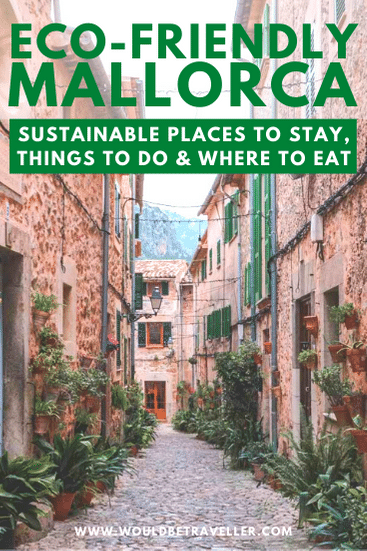
Leave a Reply Cancel reply
Your email address will not be published. Required fields are marked *
Save my name, email, and website in this browser for the next time I comment.
Currently you have JavaScript disabled. In order to post comments, please make sure JavaScript and Cookies are enabled, and reload the page. Click here for instructions on how to enable JavaScript in your browser.

- Townhouses&Bungalows
- New Build Homes
- Seaview Property
- Luxury Property
- Building Plots
- Commercial Property
- Costa de la Calma
- Mallorca Southwest
- Palma de Mallorca
- Port Andratx
- Santa Ponsa
- Sol de Mallorca
- Property for rent
- Apartments for rent
- Villas Mallorca for rent
- Houses for rent
- Fincas for rent
- Useful Information
Experience Mallorca Sustainably: Eco and Agri Tourism Guide 2024
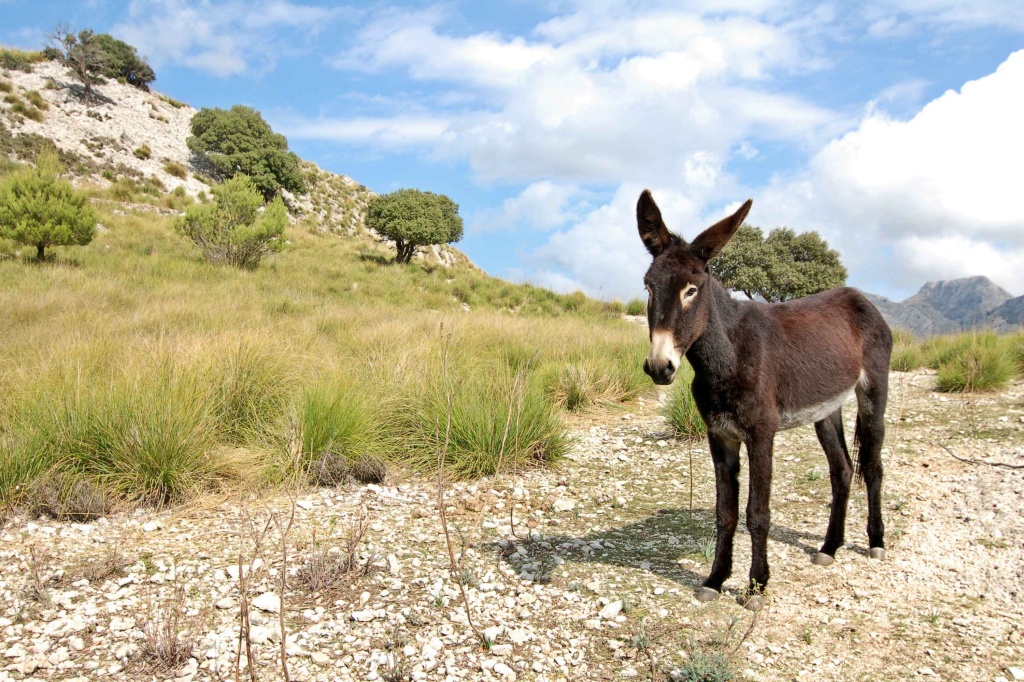
Why is Eco-Tourism Possible in Mallorca?
Mallorca, Spain's largest island in the Balearic archipelago, is a prime destination for eco-tourism. Renowned for its rich culture, history, and breathtaking natural beauty, Mallorca offers a variety of attractions that cater to travelers seeking a sustainable and nature-focused holiday experience.
Here are the reasons why eco-tourism is possible and flourishing in Mallorca:
Developed Infrastructure: Mallorca boasts a well-developed infrastructure, including high-quality roads, airports, hotels, restaurants, and a reliable transportation system. These amenities ensure the comfort and convenience of eco-tourists during their visit.
Abundant Natural Heritage: The island is blessed with a diverse and pristine natural landscape, encompassing majestic mountains, lush forests, picturesque beaches, and the sparkling Mediterranean Sea. This rich natural heritage serves as a magnet for eco-tourists seeking to immerse themselves in the island's unique ecosystems.
Nature Conservation Efforts: Mallorca places a strong emphasis on the protection and conservation of its natural wealth. The establishment of numerous nature reserves and national parks demonstrates the island's commitment to preserving its delicate ecosystems. These conservation initiatives not only safeguard the environment but also create opportunities for eco-tourism experiences.
Environmental Awareness: The local population of Mallorca displays a heightened awareness of the importance of environmental conservation. Many residents actively participate in environmental initiatives and practice sustainable use of natural resources. This shared consciousness contributes to the overall favorable climate for the development of eco-tourism on the island.
Growing Popularity of Sustainable Travel: The global trend towards eco-friendly travel has significantly influenced the rise of eco-tourism in Mallorca. Travelers are increasingly conscious of the need to preserve the environment, promote sustainable practices, and support local communities. Mallorca's commitment to eco-tourism aligns with this growing demand, attracting environmentally conscious travelers from around the world.
In conclusion, Mallorca's combination of developed infrastructure, abundant natural beauty, strong conservation efforts, environmental awareness among locals, and the increasing popularity of sustainable travel has created a favorable environment for the flourishing eco-tourism industry on the island. Travelers seeking an eco-friendly holiday experience will find a wealth of opportunities to connect with nature and contribute to the preservation of Mallorca's remarkable environment.
Sustainable tourism is on the Rise in Mallorca
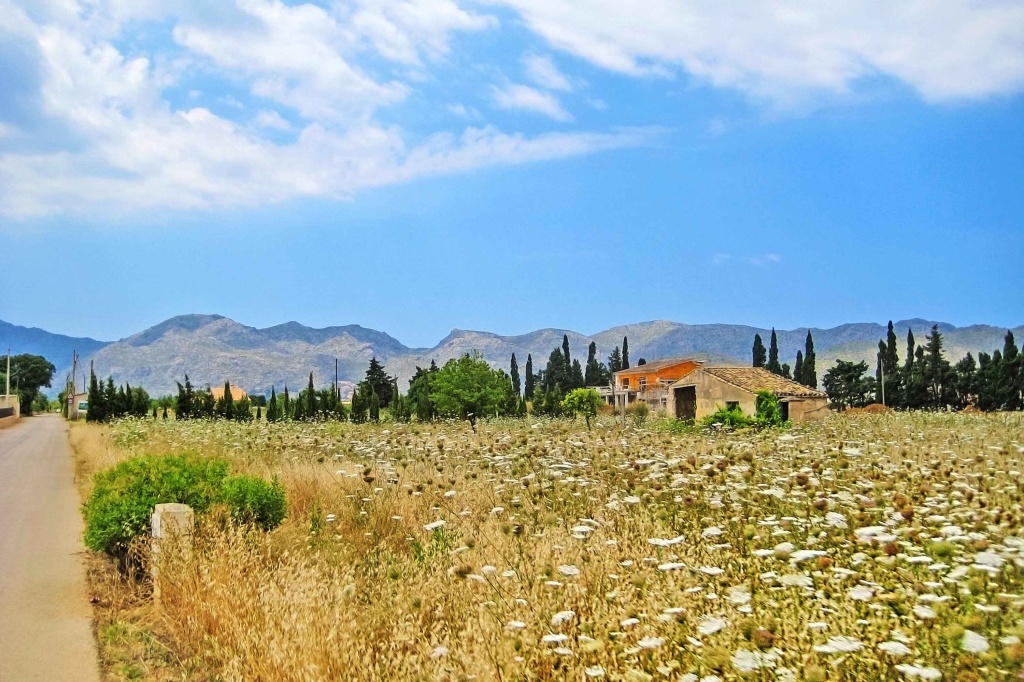
With increasing global awareness about the importance of conservation and sustainability, eco-tourism in Mallorca is experiencing a significant upswing in popularity. According to a 2019 survey conducted by GlobalData, there has been a notable rise in demand for eco-friendly tours in Mallorca. Approximately 80% of respondents expressed their interest in visiting destinations where they can enjoy nature without causing harm.
Mallorca has responded to this growing trend by offering a range of eco-tourism activities. Many local companies now specialize in nature awareness and conservation trips, providing visitors with the opportunity to explore the island's remarkable natural beauty while learning about environmental preservation. Additionally, some tour operators organize sustainability-focused activities like recycling workshops and sustainable agriculture experiences.
As eco-tourism gains momentum worldwide, Mallorca has positioned itself as a top destination, attracting a substantial number of visitors. Travelers are increasingly conscious of the environmental impact of their journeys, and they actively seek out eco-friendly accommodations. This article will examine the nature reserves and parks in Mallorca that appeal to eco-conscious tourists, as well as highlight hotels that excel in providing exceptional eco-tourism experiences.
As the demand for sustainable travel continues to rise, Mallorca is well-positioned to meet the needs of environmentally conscious visitors. The island's commitment to preserving its natural resources, coupled with the availability of eco-tourism activities and accommodations, makes Mallorca an ideal destination for those seeking an eco-friendly and nature-centric travel experience.
Why is agritourism gaining popularity in Mallorca?
Agritourism is experiencing a surge in popularity in Mallorca due to the growing demand for genuine and sustainable experiences that connect visitors with the island's agricultural heritage. Mallorca offers a range of opportunities, including olive oil and wine tastings, farm tours, and cooking classes, allowing tourists to immerse themselves in the local food and farming culture.
In 2020, a study revealed an 8.5% increase in eco-tourism in the Balearic Islands, to which Mallorca belongs. This growth can be attributed to the rising number of tourists seeking nature-based activities with minimal environmental impact.
Mallorca possesses exceptional potential to become a hub for agritourism within the Balearic Islands due to several factors:
Authentic experiences: Agritourism provides visitors with an authentic glimpse into the genuine side of Mallorca, away from the typical tourist areas. They have the opportunity to witness the local way of life and gain insights into the island's agricultural heritage.
Sustainable tourism: Many tourists today actively seek sustainable tourism options that minimize their ecological footprint. Agritourism aligns perfectly with these values by promoting sustainable agricultural practices and supporting local communities.
Local gastronomy: Mallorca is renowned for its delectable food and beverages, and agritourism enables visitors to sample and learn about local products such as olive oil, wine, cheese, and charcuterie.
Hands-on experiences: Agritourism allows visitors to engage in hands-on activities on the farms, such as harvesting, vine pruning, or grape stomping. These interactive experiences are not only enjoyable but also educational.
Cultural immersion: Agritourism provides a unique opportunity to immerse oneself in Mallorca's local culture and traditions. Through the lens of agriculture, visitors can learn about the island's history, customs, and way of life.
Family-friendly activities: Agritourism is an excellent choice for families with children, offering entertaining and educational experiences suitable for all ages. Children can learn about animals, plants, and farming techniques while enjoying outdoor activities.
Unique accommodations: Many agritourism farms offer distinctive accommodations such as farmhouses, fincas, rural houses, cottages, and glamping tents. These rustic and charming lodging options provide a one-of-a-kind experience not typically found in traditional hotels.
Overall, the rise of agritourism in Mallorca can be attributed to the desire for authentic, sustainable, and immersive experiences that showcase the island's agricultural traditions and natural beauty.
Where to Visit as an Eco and Agritourist in Mallorca?
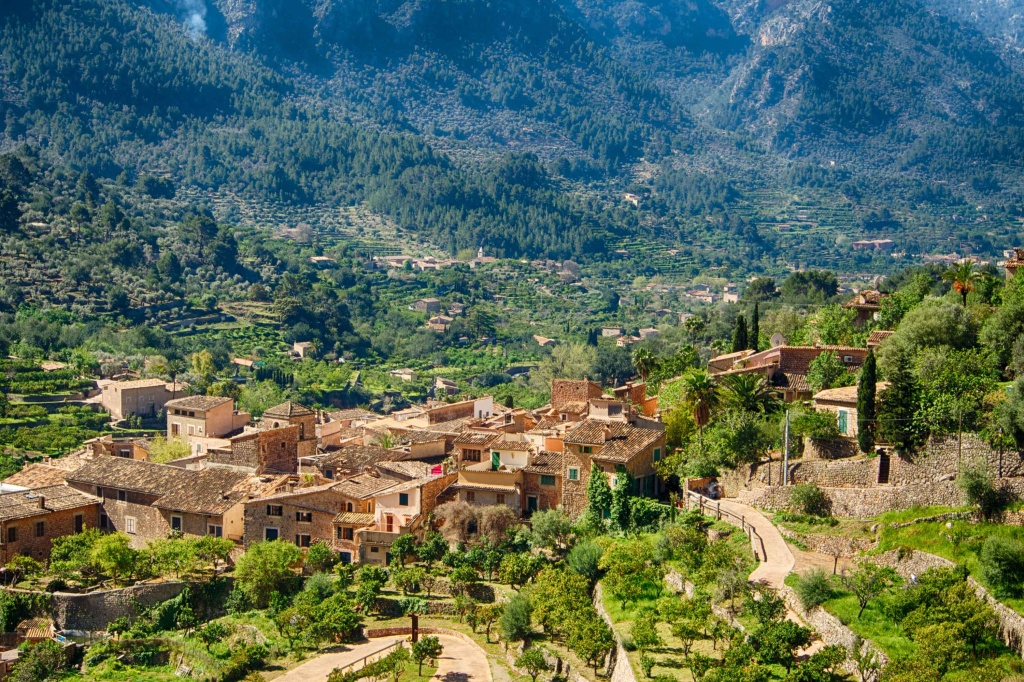
Mallorca is home to several captivating nature reserves and parks that offer exceptional experiences for eco-tourists. Among the island's many natural wonders, the following locations stand out:
Serra de Tramuntana: This nationally important mountain range extends across the northwest of Mallorca. It is a rugged and relatively unexplored region boasting diverse flora and fauna, including rare bird species and animals. The untouched beauty of Serra de Tramuntana attracts nature enthusiasts seeking an immersive eco-tourism experience.
Mondrago Park : Situated in the southeast, near the renowned beaches of Cala Mondrago and S'Amarador, Mondrago Park is a treasure trove of natural beauty. It features enchanting coves, picturesque pine and scrub forests, and is known for hosting local bird species such as black and red kites. Visitors can enjoy hiking trails and witness the rich biodiversity of the area.
S'Albufera Nature Reserve : Located in the heart of Mallorca, S'Albufera is the largest nature reserve on the island. This wetland sanctuary comprises lakes, marshes, groves, and forests, providing a habitat for numerous threatened animal and plant species. Exploring S'Albufera allows eco-tourists to witness the delicate balance of nature and conservation efforts.
Levante Park : Positioned on the eastern coast, Levante Park is a favored destination for eco-tourists. The park showcases a remarkable array of bird species, diverse vegetation, and small animals such as hedgehogs, rabbits, and gophers. Visitors can embark on nature walks and appreciate the beauty and tranquility of this coastal sanctuary.
Ormit Nature Reserve : Nestled in the southern part of Mallorca, Ormit Nature Reserve is a haven for wildlife and flora. It features an abundance of vegetation, including orchids and beech forests. Explorers can witness the thriving biodiversity and immerse themselves in the serene ambiance of this natural oasis.
Cala Mesquina Nature Reserve : Situated in the northeastern region of Mallorca, Cala Mesquina is a unique and captivating nature reserve. It captivates visitors with lush vegetation, enchanting pine and oak forests, and the presence of unique animals such as salamanders. This reserve offers an extraordinary opportunity to connect with nature's wonders.
By venturing into these remarkable nature reserves and parks, eco-tourists in Mallorca can experience the island's pristine natural landscapes, encounter diverse wildlife, and appreciate the importance of conservation. These destinations provide immersive and enriching experiences for those seeking an eco-friendly and nature-centric exploration of Mallorca.
The benefits of eco-tourism in Mallorca
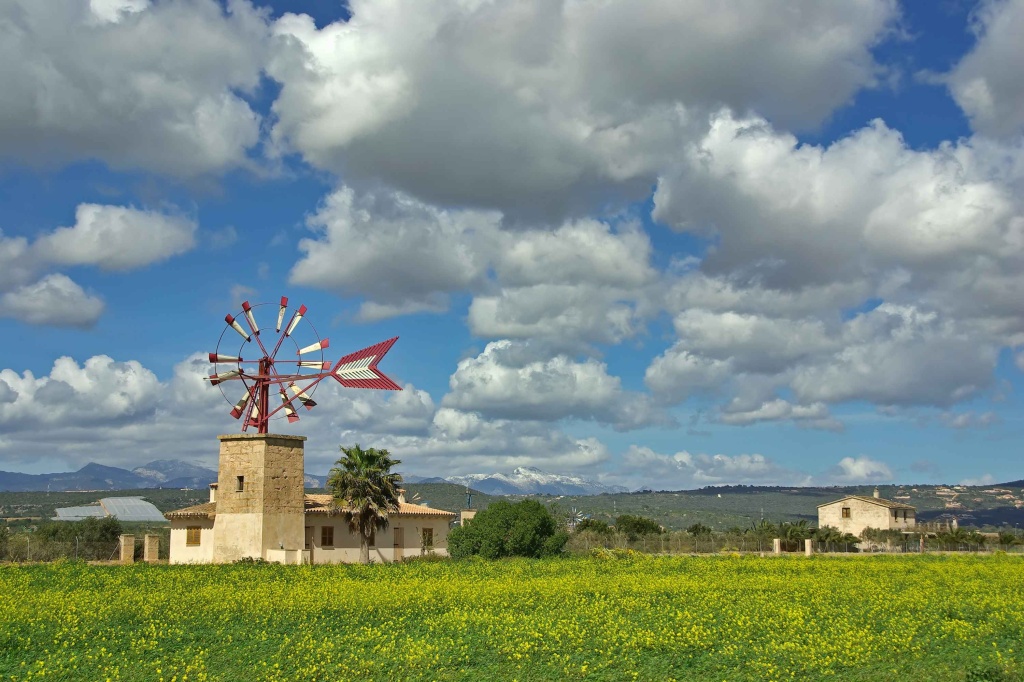
Eco-tourism in Mallorca allows tourists to enjoy the island's beautiful nature but also has many other advantages.
Firstly, eco-tourism contributes to the conservation of the environment and the maintenance of biodiversity in Mallorca. Tourists visiting nature reserves and parks contribute to nature conservation by being more environmentally aware and observing the rules of conduct in natural areas. In addition, eco-tourism creates new jobs in nature conservation and sustainable development in Mallorca.
Secondly, eco-tourism in Mallorca allows tourists to experience local traditions, culture and customs. Many eco-tourism activities in Mallorca include visits to local farms, museums, markets and other places to learn about traditional local life and culture.
Find out where to buy the farm and organic products in Mallorca in this detailed article: Best Markets in Mallorca: locations, opening hours, prices, advice.
- Thirdly, eco-tourism in Mallorca is a source of income for the local population. Many of Mallorca's eco-tourism businesses and hotels are local, which preserves jobs and sustains the region's economic growth.
Investing in Mallorca Real Estate for Eco-Tourism
Investing in Mallorca real estate can prove to be a profitable venture, particularly when considering its potential as an eco-tourism investment project. Additionally, purchasing property in Mallorca can be an appealing choice for individuals contemplating a permanent relocation to the island.
Mallorca's burgeoning eco-tourism industry contributes to the attractiveness of investing in its real estate market. The island's growing popularity as a sustainable travel destination ensures a steady stream of eco-conscious tourists seeking accommodation that aligns with their values. By acquiring property in Mallorca, investors can tap into this thriving market and capitalize on the increasing demand for eco-friendly accommodations.
Moreover, buying a property in Mallorca extends beyond investment opportunities. For individuals considering a permanent move, the island offers a high quality of life, with its breathtaking natural landscapes, vibrant culture, and favorable climate. With a diverse range of properties available, from picturesque countryside retreats to coastal residences, prospective homeowners can find their ideal eco-friendly haven in Mallorca.
By combining the potential for financial gain with the island's commitment to eco-tourism, investing in Mallorca real estate presents an enticing proposition. Whether seeking to generate rental income from eco-conscious travelers or establishing a permanent residence in a sustainable and environmentally rich setting, Mallorca offers a promising opportunity for those interested in eco-tourism and the real estate market.
What should eco-tourists consider when planning a holiday in Mallorca?
Like any other industry, eco-tourism in Mallorca also has challenges and issues to consider when planning a trip.
One of the main challenges is the conservation of nature and the island's biodiversity. Although Mallorca has many nature reserves and parks, protecting ecosystems is still a significant challenge. Some tourist activities and entertainment can harm the environment, so tourists should be aware of and take care of the island's natural resources.
Another challenge is balancing eco-tourism and commercial tourism on the island. Conserving Mallorca's nature and ecosystems is necessary for the sustainability of eco-tourism. Still, the economic interests of the region must also be considered. One way to address this challenge is to encourage eco-tourism on the island and support local producers to balance nature conservation and economic development.
Despite the challenges and problems, eco-tourism in Mallorca continues to be popular with tourists who want to explore the island's beautiful places and enjoy peace and tranquillity while preserving nature and biodiversity.
In summary, eco-tourism in Mallorca is a great way to enjoy nature and the island's beauty while preserving the environment and biodiversity. Many nature reserves and parks and nature conservation activities attract tourists who want to experience eco-friendly places.
At the same time, it should be remembered that eco-tourism in Mallorca has challenges and problems, including conservation.
The average cost of holidays in Mallorca for eco-tourists
The cost of holidays in Mallorca for eco-tourists can vary greatly depending on many factors, such as the time of year, the length of the holiday, the accommodation and the eco-activities chosen.
In general, the cost of holidays in Mallorca in 2023 for eco-tourists can start from 50-70 euros per night in a simple guesthouse or campsite and go up to 300-400 euros or more per night in luxury eco-hotels. The cost of eco-tours and activities can also vary, ranging from tens of euros for a walk in the park to several hundred euros for an eco-excursion of several days.
However, it is worth noting that Mallorca holiday prices may change in 2023 depending on many factors, including the global economic situation, exchange rates and changes in the island's tourism infrastructure. It is therefore advisable to conduct market research and check the cost of accommodation and environmental activities with reliable tour operators before planning your Mallorca holiday.
Best County Houses (Fincas) for Eco-Tourism in Mallorca
Mallorca offers a variety of eco-friendly accommodations for those seeking an authentic and sustainable travel experience. Among these options, fincas , traditional farmhouses that have been converted into tourist accommodations, are particularly popular. Many of these fincas are nestled within nature reserves and national parks, making them an ideal choice for eco-tourism in Mallorca. Here are a few notable fincas where you can rent a room :
Finca Binibona Parc Natural : Situated in the scenic Sierra de Tramuntana mountains, this finca provides traditional-style accommodation surrounded by a delightful garden and a refreshing swimming pool. Guests can unwind amidst the tranquility of nature while enjoying the comforts of this charming retreat.
Agroturismo Sa Rota d'en Palerm : Located in the northeastern part of Mallorca, this finca is set on expansive grounds, offering guests opportunities for hiking and cycling amidst beautiful surroundings. Immerse yourself in the island's natural splendor while enjoying a sustainable and peaceful stay.
Finca Can Pere Rei: Found in the southern region of Mallorca, surrounded by olive trees and orchards, this finca boasts rooms with private terraces and breathtaking mountain views. Experience the serenity of the countryside while appreciating the sustainable practices that shape this eco-tourism gem.
Finca Son Sala : Situated in central Mallorca, this finca is enveloped by lush greenery, creating a tranquil oasis for guests. With its traditionally styled rooms and private terraces, this accommodation offers a genuine taste of Mallorcan hospitality within a sustainable setting.
Agroturismo Son Galceran : Nestled in the southern part of Mallorca, amidst nature reserves and national parks, this finca provides rustic-style accommodation complemented by its own swimming pool. Explore the surrounding natural wonders and unwind in this idyllic eco-friendly retreat.
These fincas represent just a handful of the many options available for eco-tourism in Mallorca. By choosing to stay in these sustainable accommodations, you can enjoy a responsible and authentic travel experience while immersing yourself in the island's natural beauty.
Celebrities Embracing Eco-Tourism in Mallorca
Mallorca has become a favored destination for various celebrities, including those who are passionate about eco-tourism. Here are a few notable stars who have visited Mallorca to engage in eco-friendly activities or simply unwind amidst its stunning natural surroundings:
Leonardo DiCaprio : Renowned actor, producer, and environmental activist Leonardo DiCaprio visited Mallorca to attend a conference focused on climate change and discuss pressing environmental issues. His commitment to sustainability and raising awareness about the environment has made him a prominent figure in the eco-tourism sphere.
Emma Watson : Actress Emma Watson, known for her advocacy work on nature and environmental causes, made a trip to Mallorca as part of a campaign against marine pollution. Her dedication to preserving the natural world aligns with the principles of eco-tourism, and her visit helped shed light on the importance of protecting Mallorca's pristine coastal ecosystems.
Mick Jagger : The iconic rock musician Mick Jagger, recognized for his environmental convictions, ventured to Mallorca to revel in the island's breathtaking scenery and engage in environmental initiatives. His support for ecological causes resonates with the ethos of eco-tourism, and his visit brought attention to the need for sustainable practices.
Richard Gere : Actor and activist Richard Gere, known for his environmental advocacy, journeyed to Mallorca to actively participate in environmental activities and contribute to the preservation of the island's natural beauty. His involvement underscores the significance of celebrity influence in promoting sustainable tourism practices.
These celebrities represent a fraction of the individuals from diverse backgrounds who are drawn to Mallorca's natural splendor and contribute to eco-tourism efforts. As the island continues to capture the hearts of environmentally conscious individuals, it serves as a testament to the allure and impact of sustainable travel.
The Balearic Government's Support for Eco-Tourism in Mallorca
The government of the Balearic Islands is playing a proactive role in boosting eco-tourism in Mallorca. It has implemented several initiatives in recent years to preserve the island's natural resources and attract a growing number of tourists seeking eco-friendly experiences.
One of the government's key focuses is the development and execution of environmental projects. Efforts are underway to restore ecosystems like dunes and forests, as well as to enhance the quality of seawater. Collaborating with local organizations and environmental groups, the government is devising plans to combat pollution and safeguard biodiversity across the island.
In addition, the government has introduced special taxes and levies on the utilization of natural resources, such as water and energy, in tourism establishments. This incentivizes the adoption of environmentally friendly technologies and solutions like solar panels, recycling technologies, and fully electric vehicles.
Working closely with local businesses, the Balearic government is actively encouraging and supporting eco-tourism initiatives on the island. Financial assistance and guidance are provided to develop sustainable and eco-friendly business models. Furthermore, the government exercises regulatory control over the number of tourists visiting the island to prevent adverse impacts on the local ecosystem.
In a recent development, the Balearic Islands launched a quadcopter-based air taxi service in May 2023. This eco-friendly alternative to conventional taxis offers a greener transportation option, with fares starting at 95 euros per trip.
Recognizing the significance of eco-tourism in Mallorca, the Balearic government is dedicated to its development. Through various measures, they aim to preserve the island's natural assets while attracting environmentally conscious tourists who seek sustainable holiday experiences.
Eco-Tourism in Mallorca as a Business Opportunity
Mallorca, with its pleasant climate and breathtaking natural beauty, continues to attract tourists from around the globe. Among the various tourism sectors, eco-tourism stands out as one of Mallorca's most sought-after experiences, and its potential as a business venture remains high.
Investing in property in Mallorca can be a lucrative project from an eco-tourism perspective. The growth of eco-tourism on the island has resulted in an increased demand for accommodations that align with sustainable practices and showcase the island's natural wonders. This, in turn, creates opportunities within the real estate market in Mallorca.
One appealing investment option is acquiring hotels or cottages that meet eco-tourism standards. Owners of such properties can anticipate a steady income stream due to the rising popularity of eco-tourism in Mallorca. Another avenue worth exploring is purchasing land where eco-friendly accommodations can be constructed, adhering to eco-tourism guidelines. This can prove to be a profitable venture, especially if the plot is well-located with stunning views.
It is noteworthy that the Mallorcan government actively supports the development of eco-tourism on the island and is taking measures to enhance infrastructure and the management of natural resources. These efforts have the potential to drive up property values in Mallorca in the future.
In conclusion, the development of eco-tourism in Mallorca presents enticing prospects for property investments on the island, offering long-term profitability for those who seize the opportunity. By capitalizing on the growing interest in eco-friendly travel, entrepreneurs and investors can contribute to both the sustainable growth of Mallorca's tourism industry and their own financial success.
Yes! Mallorca Property is the leading provider of property sales in Mallorca, offering an extensive range of properties, including fincas and eco-hotels. With over 750 options available, we specialize in helping clients find their ideal property in Mallorca. Our outstanding reputation is reflected in our 5-star rating on Google , demonstrating the satisfaction and trust of our clients.
If you are considering investing in eco-tourism in Mallorca, we have several options to offer, including the purchase of a finca or an eco-hotel. Fincas are traditional houses on the island that can be rented out to tourists seeking to immerse themselves in Mallorca's natural surroundings. Eco-hotels provide eco-friendly accommodations, utilizing renewable energy and other sustainable technologies.
Contact us, and our dedicated team will be delighted to assist you in finding the perfect property in Mallorca and addressing any inquiries you may have. To explore our extensive range of properties for sale in Mallorca, click on the links below:
Complete catalogue of properties for sale in Mallorca
Fincas for sale in Mallorca
Investing in Mallorca property through Yes! Mallorca Property offers a promising opportunity for an eco-tourism investment project. With the continuous growth of eco-tourism on the island, there is a rising demand for suitable properties. Our comprehensive services include investment guidance, property search, transaction execution, and property management.
Our Mallorca property options provide excellent value for money, ensuring a stable income stream and attracting tourists seeking an eco-friendly holiday experience on the island. If you are considering investing in eco-tourism in Mallorca, Yes! Mallorca Property can offer you the finest properties available .
Request a consultation now , and our experts will reach out to you to discuss your requirements and provide further details.
Read Related Articles
Travelling to mallorca with a pet: everything the owner needs to know, the worst things about mallorca: safety concerns & places to avoid, experience mallorca in april: your complete guide to weather and activities.
Back to the list
Eco-friendly Travel in Mallorca: A Journey to Preserve
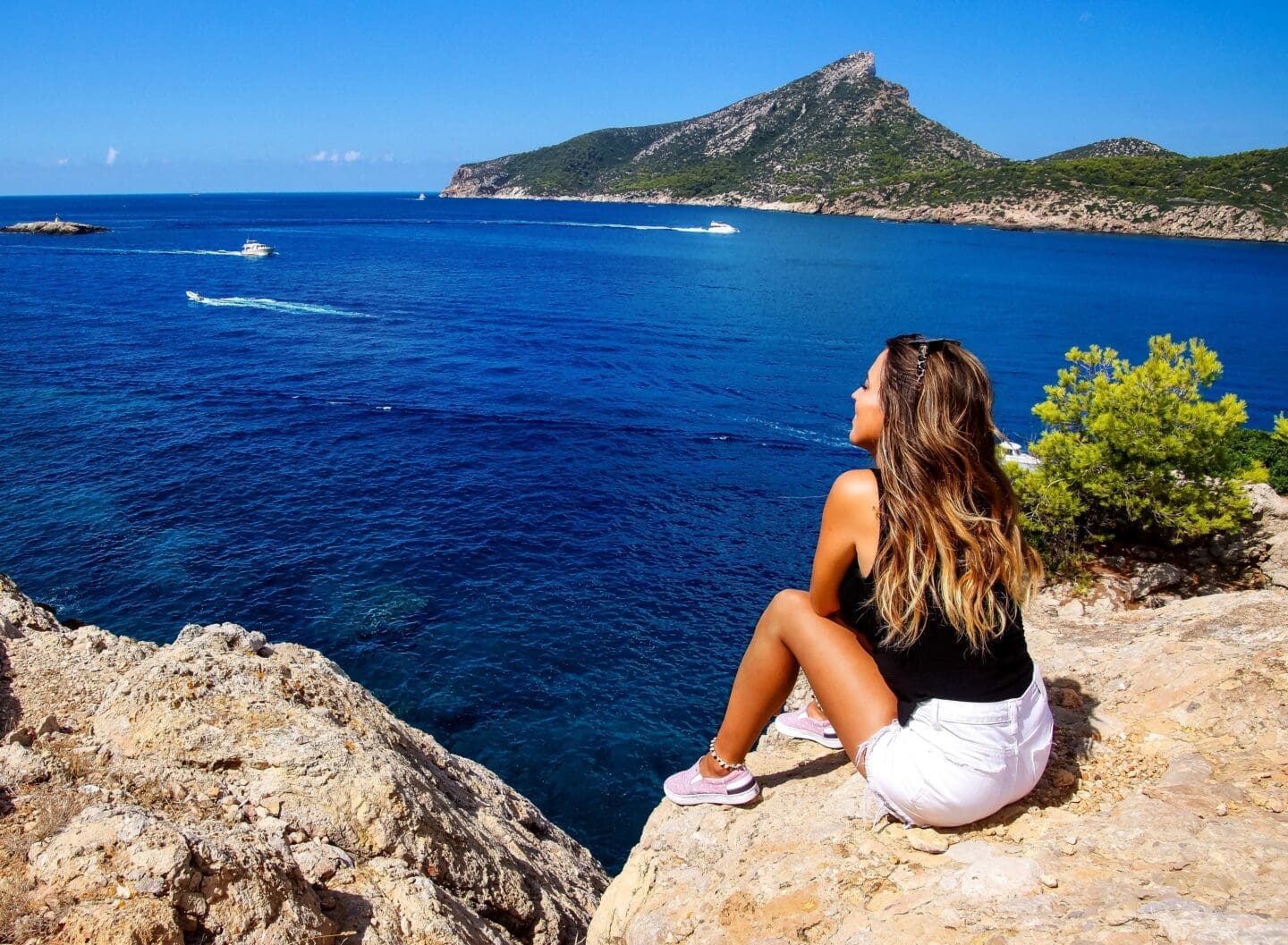
Mallorca, with its azure waters, golden beaches, and rich cultural tapestry, has long been a dream destination for many. But as every traveler knows, with great beauty comes great responsibility. As someone who’s lived, loved, and traveled across this Mediterranean gem, I’ve been on a mission to explore it sustainably. In this guide, I’ll share my insights on eco-friendly tips for Mallorca for accommodations, green travel tips, and local businesses that echo the spirit of sustainable practices. Join me in this green journey, as we aim to ensure that the splendors of Mallorca remain intact for generations to come.
Eco-friendly Travel Mallorca
- Eco-Friendly Accommodations
- Travel Green
- Support Local and Sustainable
- Be a Responsible Traveler
1. Eco-Friendly Accommodations
- Eco Finca Hotels : Experience Mallorcan tradition and modern luxury in one. These are not just any hotels but restored traditional Fincas that have adopted sustainable practices. From solar power to organic farming, these hotels combine luxury with love for the environment.
- Green B&Bs : Many bed and breakfast accommodations in Mallorca have embraced green practices. They focus on reducing waste, conserving water, and often source local and organic produce for their meals.
- Eco-Friendly Hotels in Mallorca : I’m excited to share with you my curated list of the finest eco-friendly hotels in Mallorca. These gems don’t just offer luxurious experiences but also celebrate eco-conscious living, a cause close to my heart.
Personal Tip : Finca Hotel Es Llobets in Algaida is a personal favorite. Their commitment to sustainability, from rainwater harvesting to locally sourced food, truly impressed me.
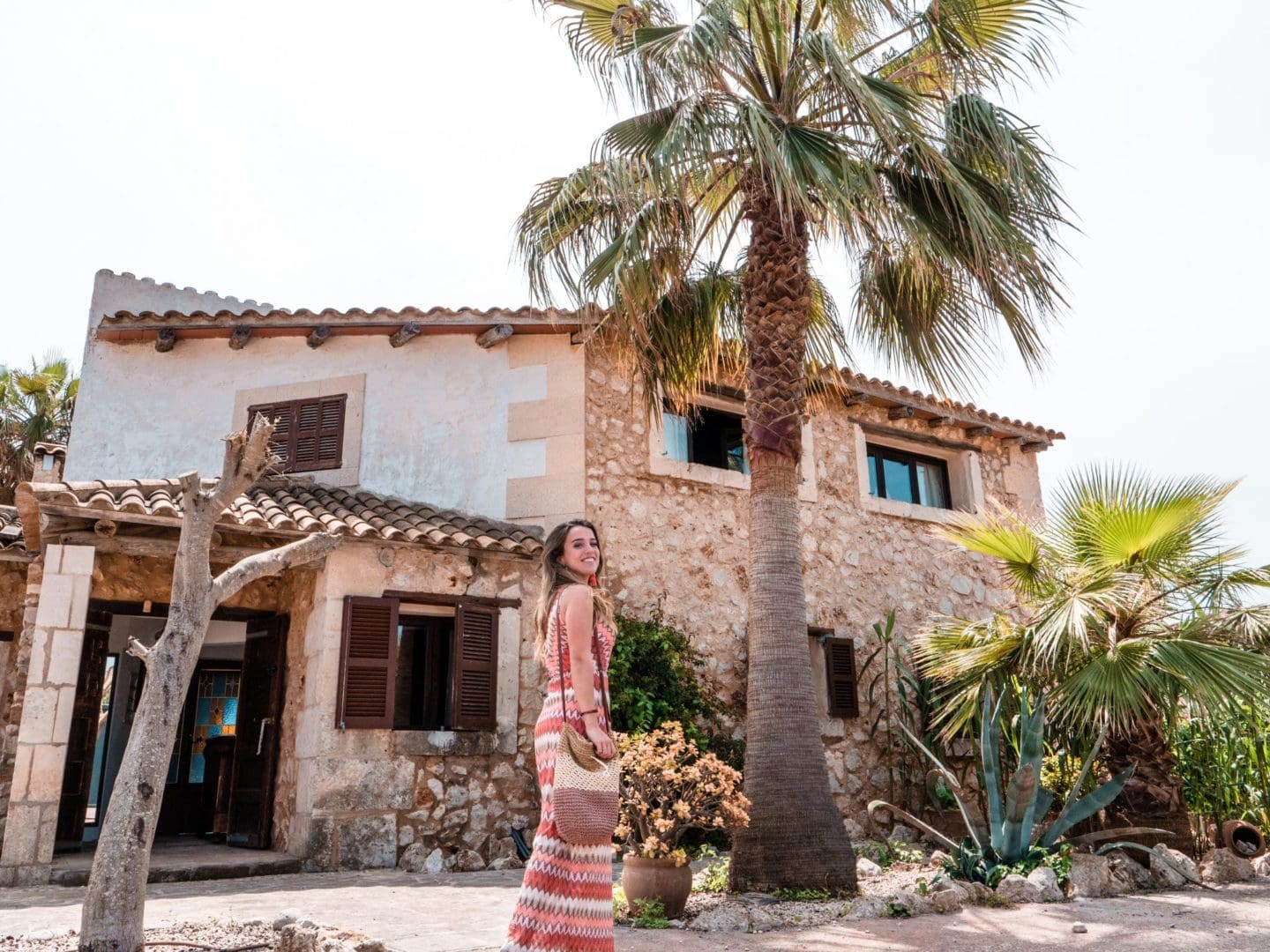
2. Travel Green
- Public Transport : Mallorca’s public transport system is efficient and reduces the carbon footprint. The historic train from Palma to S óller is not only an eco-friendly mode but offers scenic views.
- Biking : Exploring Mallorca on a bike is both eco-friendly and a delightful experience. Rent a bike in Palma and cycle your way through the historic lanes or along the coastline. Are you looking for responsible gear? Make sure to visit My Cycle Closet in Alcudia . They recently opened and they have the most unique pieces.
- Walking Tours : Opt for walking tours in towns and villages. It’s a great way to soak in the local culture, interact with locals, and reduce environmental impact. ♥ Curious about the most beautiful villages ? We’ve made a list .
Personal Tip : Try the walking tour in Alcúdia . Wandering through its medieval walls, I’ve discovered quaint cafes and artisan shops that would’ve been missed otherwise.
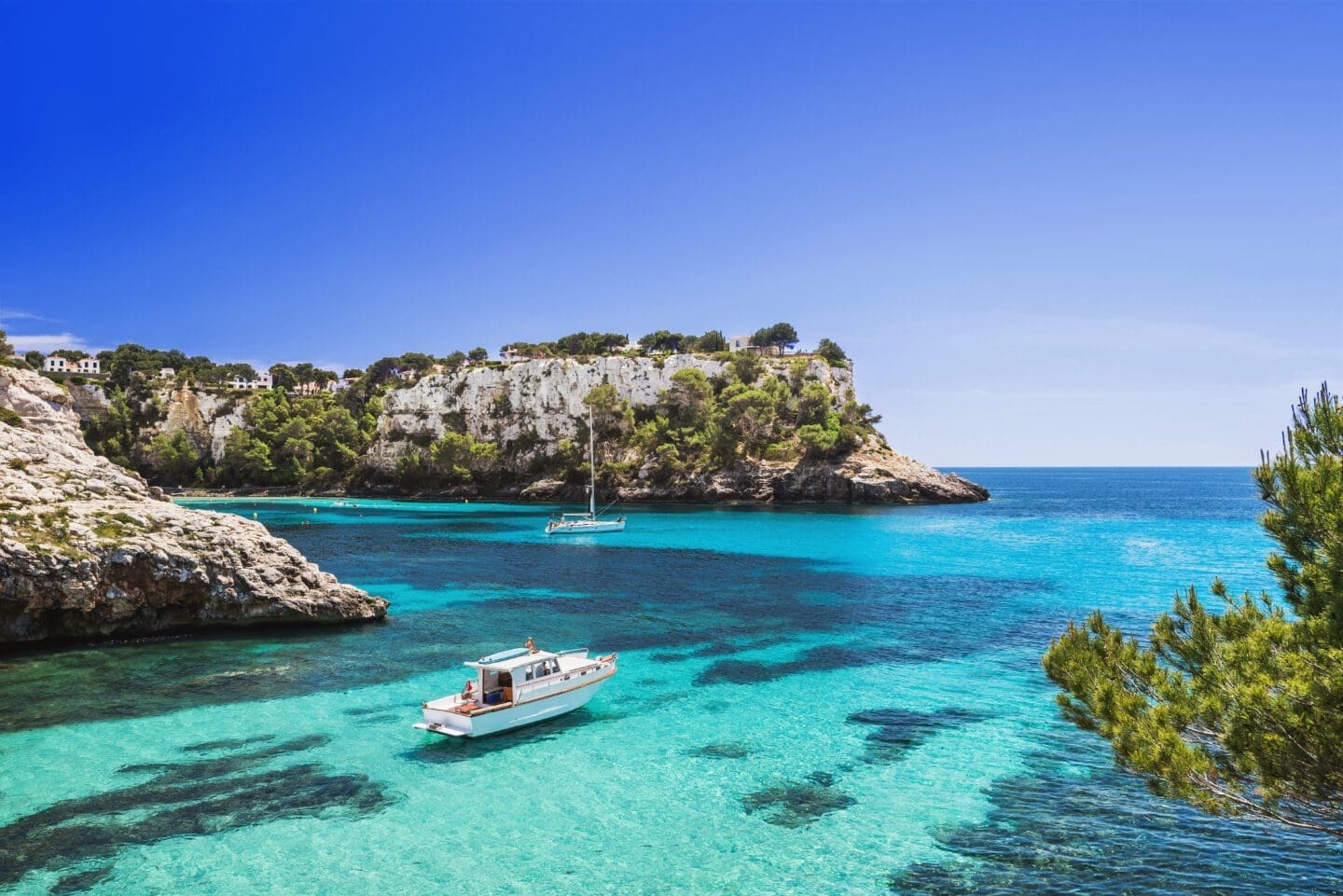
3. Support Local and Sustainable
- Local Farmers’ Markets : Instead of supermarket chains, buy your fresh produce from local farmers’ markets. It’s fresher, organic, and you support the local community.
- Sustainable Dining : Many restaurants in Mallorca are embracing farm-to-table concepts. They source ingredients locally, ensuring freshness and reducing carbon footprints.
- Eco-friendly Products : When shopping for souvenirs, look for artisans who use sustainable materials. It’s a great way to take back a piece of Mallorca while ensuring its beauty remains undisturbed.
Personal Tip : The Restaurant Diferent in Cala d’Or has a fantastic sustainable menu. Their fish dishes, sourced from local fishermen, are a must-try!
4. Be a Responsible Traveler
- Leave No Trace : Whether you’re at the beach or hiking up the Tramuntana mountains , ensure you leave no waste behind. » Discover the 10x most beautiful beaches
- Conserve Water : Mallorca faces water shortages. Be mindful of your water usage in hotels and restaurants.
- Learn & Educate : The more we know about the importance of sustainability, the better choices we make. Attend workshops or seminars on eco-tourism during your stay.
Conclusion | Eco-friendly Travel Mallorca
Mallorca is more than just a travel destination; it’s a living testament to nature’s grandeur and cultural richness. As we explore its wonders, let’s pledge to do so sustainably. After all, eco-friendly travel in Mallorca ensures that the magic of the island remains for a very very long time.
Read More: Discover the hidden gems of Mallorca with Dutchbloggeronthemove’s extensive guide
MORE LIKE THIS:
Lanzerac wine estate: a dreamlike escape in …, tulip season camping guide: according to a …, fornalutx travel guide: why fornalutx is a …, leave a reply cancel reply.
Your email address will not be published. Required fields are marked *

- Feb 15, 2023
The 10 Best Eco Hotels in Mallorca
Updated: Mar 5, 2023
From rural countryside retreats to luxury resorts, this article discovers the best eco hotels in Mallorca, Spain.

Mallorca, the darling of the Mediterranean, captivates every kind of traveler thanks to its sunny disposition, stunning beaches, and rugged mountain ranges. Best of all, there are plenty of incredible eco hotels in Mallorca to choose from, which means visiting this blissful Balearic island paradise doesn't have to impact the environment.
Whether you're visiting to go hiking, climbing, or cycling, or would just prefer to enjoy some downtime on one of the famous beaches, there's an eco hotel for you in this list. Best of all, Palma, the island's buzzing capital city, is never that far away, offering some of the best restaurants, bars, and nightlife in all of Spain. So let's jump in; here's our mpick of the 10 best eco hotels in Mallorca, Spain.
Jump Ahead: The Best Eco Hotels in Mallorca
LJs Ratxo Eco Luxury Retreat, Sant Joan
Ecocirer Hotel, Soller
Finca Son Palou, Orient
Es Racó d'Artà
Finca Can Feliu, Porreres
Hotel Palma Bellver by Meliá
Hotel Marina, Port de Soller
El Vicenç de la Mar Adults Only Resort
Sa Bassa Rotja, Porreres
1. LJs Ratxo Eco Luxury Retreat, Sant Joan
The first eco-friendly hotel on this list is LJs Ratxo Luxury Retreat, located in the countryside of Mallorca near Sant Joan. At just 20 minutes from Palma, it's both well-connected yet a world away from the island's busy capital. Here, you'll be able to immerse yourself in the rugged nature of Mallorca before retreating to the luxury of your eco retreat.
Expect earthy hues throughout, with one-of-a-kind furnishings carved from sustainable timber, antiques picked up from island artisans, and artworks from locals scattered throughout the rooms. You could laze a day away by the glorious swimming pool, or indulge in some treatments in the spa. And the sparkling Mediterranean is never far away if you fancy a dip or casting out on a yacht to explore the coast.
This entire eco resort is run on solar power, and features its own organic garden from which they source the ingredients for their mouth-watering array of food. There's also a strong encouragement from the team for guests to participate in local, eco-friendly activities - the hotel staff know the island inside and out. For a true eco-friendly hotel in Mallorca, look no further.

2. Cap Rocat
Cap Rocat is a former fortress, a UNESCO-protected site that is now the location of one of the most luxurious eco hotels in Mallorca. Perched on a private peninsula to the south of Palma, this stunning hotel enjoys scenic views over the bay, and is entirely surrounded by a nature reserve. A stay here is not only a sustainable one, but also peaceful, unique, and unforgettable.
Local architect Antonio Obrador was the one to convert this ancient Moorish citadel into the elegant hotel you'll find today. The unique design incorporates natural stone, marble, and timber ceilings with a neutral color scheme and bright rugs. The resulting atmosphere combined with the out-of-this-world location makes this hotel feel as if it was lifted straight out of a James Bond film. Services include an incredible infinity pool, an indulgent Hammam, gym, cinema, and it's own private sandy beach below.
What makes a stay at Cap Rocat even better is knowing that this is a hotel that takes its environmental impact seriously. Located in a protected reserve, and with the building also protected, it's easy to see why they do. You can expect robust waste, water, and energy management systems, as well as locally-sourced food, materials, and products. All of this just a 25-minute drive from the centre of Palma.

3. Ecocirer Hotel, Sóller
Nestled amidst the rolling hills and stunning vistas of S ó ller, Ecocirer hotel is a true gem of sustainable luxury. This eco hotel in Mallorca has embraced its natural surroundings and transformed into a bespoke resort that exudes comfort and style.
With a focus on reducing its carbon footprint, Ecocirer is powered by clean and renewable energy sources, such as solar power, and has incorporated a number of environmentally conscious practices throughout the hotel. From locally sourced bath products to organic linens and low-flow showerheads, guests can bask in the serenity of their rooms while enjoying the peace of mind that comes with knowing they're making a positive impact on the environment.
At Ecocirer, travelers are invited to immerse themselves in the breathtaking beauty of Mallorca, connecting with nature and experiencing the region's unspoiled landscapes and charming villages. Whether exploring the rolling hills on a hike or lounging by the pool with a glass of local wine, Ecocirer offers an escape from the hustle and bustle of daily life and a chance to connect with the beauty of the world around us. With its commitment to sustainability, Ecocirer is a true example of eco tourism at its finest.

4. Finca Son Palou, Orient
Located in the countryside with views over the magnificent Orient Valley, Finca Son Palou is a 14th-century estate that has been converted into one of Mallorca's best sustainable hotels. This is a perfect choice for those who want to explore the rugged beauty of Mallorca, with the hotel offering easy access to some of the best hiking and mountain biking trails on offer.
There's also plenty of other activities to do; growing all their own food, you can even help them pick the apples and cherries when it's time to harvest. Their extensive organic garden also provides nearly all of the ingredients for the local dishes on offer at the restaurant. With its historic country-manor feel and updated modern amenities, this is a top choice for those looking for an eco hotel in Mallorca.
But what is it about Finca Son Palou that makes it a sustainable oasis? There's solar power, and the hotel also employs a sustainable approach to water and waste management, using rainwater and greywater recycling systems. They are also committed to lowering their footprint through energy conservation and recycling. This tranquil countryside getaway is seriously tempting.

5. Es Racó d'Artà
This working farm estate has been a big part of agriculture in the area around Artà since the 13th century - now, reimagined as a sustainable wellness getaway for discerning travelers looking for a truly luxurious and eco-friendly retreat. Sequestered in the wild northeast corner of Mallorca in the Parc Natural de la Península de Llevant , you'll find Es Racó d'Artà hidden within about 540 acres of Mediterranean forest and farmland.
This is one of the largest estates on the island, and architect/designer Toni Esteva has surpassed all expectations when it comes to the interiors. The rooms and private casas are all decorated in a spartan aesthetic, matching the views of the craggy peaks that surround the hotel. Exposed wooden beams, white-washed wealls, and cool, earthy tones as well as woven and rattan textures create a simple yet comfortable hotel that you won't soon forget.
It's still a working farm as well; the restaurant has incredible yet simple Mediterranean dishes, sourced from as close to the hotel as possible. The hotel also boasts its own vineyard, makes olive oil, and has 4 million bees for honey. Sustainable practices such as water and energy conservation and robust recycling programs match the atmosphere of the hotel, which is also powered by solar and geothermal energy to boot.

6. Finca Can Feliu, Porreres
To another country estate for the next eco hotel on this list; this one just outside the town of Porreres near the center of Mallorca. Finca Can Feliu offers a little oasis of calm and tranquility, the perfect eco-friendly escape for those who want a taste of life in the quiet Mallorca countryside.
This 17th century farmhouse has been lovingly restored, and is now one of the island's most enticing boutique hotels. It still retains its historic charms, although with all the creature comforts you could want for a blissed-out stay. Best of all is that the estate is also famed in Mallorca for their production of organic wines and olive oil; you'll definitely get to sample their wares during your stay.
This agroturismo eco hotel in Mallorca is also serious about sustainability. All their food is locally-sourced and organic, they employ energy, water, and waste management systems to lower their footprint, and we've already mentioned their organic wine and olive oil that is popular around the island. All in all, an excellent choice for a green hotel in Mallorca.

7. Hotel Palma Bellver by Meliá, Palma
For savvy sustainable travelers looking for a hotel in the thick of the action in Palma de Mallorca, this is it. Hotel Palma Bellver is the best eco hotel in the capital, and it's not even close. As part of the luxurious Meliá brand, this hotel not only has a whole range of sustainability efforts, but also helps the environment and local communities by giving back through their social outreach.
The hotel features contemporary and elegant decor throughout its public spaces and guest rooms. Guest rooms are spacious and comfortable, with chic furnishings and pops of color and art. In short, it offers everything you'll need for a comfortable stay in the city.
As for its eco credentials, Hotel Palma Bellver makes use of renewable energy, focuses a lot on their waste management throughout their entire supply chain, and promotes sustainability to both their staff and guests of the hotel.

8. Hotel Marina, Port de Sóller
Located in the Port de S óller on the north coast of Mallorca, the eco-friendly Hotel Marina is a gem of a place to stay. This beautiful hotel boasts a stunning historic façade, carefully restored to its original glory to give a glimpse into Soller's rich cultural heritage.
The guest rooms at Hotel Marina are cozy and comfortable, with plush bedding, modern amenities, and large windows that offer stunning views of the surrounding Tramuntana Mountains. There's also a lovely swimming pool, plenty of green space, and a restaurant that serves up delicious Mediterranean cuisine from locally-sourced ingredients.
As a level 3 sustainable property on Booking.com, the Hotel Marina in Soller has taken considerable steps to reduce their impact on the environment. From reducing energy and water consumption, minimizing waste, and using eco-friendly products and services, to spreading awareness and giving back to social programs, this is a great choice for a green hotel in Mallorca.

9. El Vicenç de la Mar, Adults Only Eco Resort
Perched on the edge of jagged cliffs above a picturesque sandy beach, El Vicenç de la Mar is a stylish five-star hotel that is indulgent, sexy, and exuberant. From the heated rooftop pool and private cinema to its two restaurants overseen by renowned Michelin-starred chef Santi Taura, this is a one-of-a-kind hotel located close to the northern tip of Mallorca.
With such a wide array of amenities, El Vicenç offers a true haven for the mind, body, and soul. Bright and airy interiors exude an understated elegance, with exquisite light fixtures andd plush, ergonomic designer sofas. There's also plenty of greenery as well, matching the vibrant turquoise textiles that give the entire hotel a sophisticated beach-club vibe.
El Vicenç de la Mar captures the essence of an authentic seaside retreat. Best of all, it's also considered one of the more sustainable hotels on the island. Tours are organized with local providers, they employ extensive waste, water, and energy management systems, and there's even space out the front to charge your electric rental car.

10. Sa Bassa Rotja Ecoturisme, Porreres
Rounding out this list of eco hotels in Mallorca is Sa Bassa Rotja, a vast 100-hectare estate located in the eastern part of the island. With a rich history dating back to the 13th century, this country hotel is a fine choice for a sustainable stay. Whether you're sipping wine on the terrace, practicing yoga under the trees, or leisurely cycling on the quiet roads that meander through the property's orchards and meadows, relaxation here is inevitable.
The hotel is also home to a tempting dining room, at the helm of which is acclaimed chef Marti March. With a rotating weekly menu that showcases the best ingredients and dishes from Mallorca, it's a great way to spend an evening; especially after indulging in some top-notch treatments at the hotel spa.
Sa Bassa Rotja is also a fantastic eco hotel, and has taken extensive steps to minimize its carbon footprint. there's solar power, an organic garden where they grow their own fruit and vegetables, as uses rainwater harvesting and greywater recycling systems. They're also big on promoting sustainable tourism on the island, making them a fantastic choice for a sustainable getaway in Mallorca.

Recent Posts
The Best Eco Friendly Hotels in London: A Sustainable Guide
The Best Sleeper Trains in Europe
Eco Hotels in Tulum: 10 Sustainable and Beautiful Places to Stay
This article contains affiliate links to products, hotels, and tours. If you make a purchase or reservation, we receive a small commission.
- Nov 15, 2023

- Nov 7, 2023

- Nov 6, 2023


Why Mallorca Is a Must-Visit for Every Eco-Tourist & Nature Lover
Are you an eco-tourist looking for a beautiful, sustainable place to visit ? Mallorca is one of the islands that should be at the top of your list.
Mallorca, also called Majorca, is one of the most popular Spanish islands, attracting thousands of holidaymakers every year. Many people that are committed to sustainability find this place particularly attractive.
Last year, The Independent published an article showing that Mallorca is setting new sustainability standards in Spain . The community has instituted a plastic ban and extending bike routes. They have really raised the bar on sustainability and can be an example for the rest of Europe.
Mallorca is a Great Destination for Sustainable Travelers in Spain
There’s lots to admire about this beautiful island, including the affordable holiday resorts, lush beaches, delicious cuisine, charming towns and a quirky nightlife. While all of that already makes Mallorca a perfect holiday destination, the one thing that often gets overseen is the incredible nature that it has to offer. So, let’s explore it a bit further and find out why every nature-lover must visit Mallorca.

How to get around Mallorca?
Before we get into the incredible nature of Mallorca, we have to briefly cover how to get around it. Being the largest of the Balearic islands, it’s not that simple to get to some of the places or nature parks that we will talk about. For most travelers, ROIG car rental at Mallorca airport is the most convenient thing to do – you rent a car upon arrival, use it throughout the holiday and leave it at the airport before your departure.
Otherwise, you may have to use taxis or guided tours to get to your desired attractions, since public transport is quite limited in the island. And now, without further ado, let’s get into the natural wonders of Mallorca.
Natural parks and reserves
Visiting one of the local nature reserves and parks is the perfect way to not only witness the diverse landscapes of Mallorca but also the exotic flora and fauna that it is home to. For example, Parc Nacional de Cabrera is the only National Park in Mallorca, which consists of 18 karsified islands. Here, you will be able to spot unique wildlife, including Eleonora hawks, coral gulls, Balearic lizards, bottlenose dolphins and loggerhead turtles.
In addition to this, there are plenty of other natural reserves and parks in Mallorca that will take your breath away. La Reserva “Puig de Galatzó”, for example, is a nature reserve surrounded by mountain peaks, waterfalls, natural pools and forests, creating a truly magical yet tranquil atmosphere. S’Albufera Natural Park is one of the most popular parks located in the north of Mallorca – here, you will walk around a bio-diverse wetland with the views of incredible landscapes as well as a wide range of exotic birds.
Mountains and hiking trails
Mallorca is home to the highest mountain peak out of all Balearic islands, Puig Major, reaching a steep 1,436m in height. The mountain is located in the beautiful mountain range of Serra de Tramuntana, stretching across the Northwest coast of the island. Serra de Tramuntana is the perfect place for a day out hiking or biking, with magnificent views all throughout the trail, including dorrected hills, powerful cliffs, dramatic rock formations, numerous canyons and lakes.
Moreover, Mallorca truly is a hiker’s dream location, since besides the Serra de Tramuntana, the island has plenty of other hiking trails to offer. Some of the other greatest mountains to see include Puig de Sant Marti, Puig de sa Tudosa, Sa Penya Rotja and Puig de la Rateta. Each of these have beautiful hiking trails available, with stunning views, flora and fauna to witness while you’re there.
Rock formations and caves
Perhaps the most unique geological wonder that Mallorca has in store for its visitors is the wide range of incredible rock formations and hidden caves. The island is known for its limestone and dolomite formations dating all the way back to Mesozoic (170 million years ago) and Cenozoic (10 million years ago) times. These unique rock formations can be witnessed in various places across the island, however, perhaps the most impressive way to see them is by visiting one of the magical caves there.
Mallorca has over a whopping 200 cave systems scattered across the island. Unfortunately, most of them are not open for the public to visit due to limited safety, however, a few of them have been made available as tourist attractions: Drach Caves, Hams’ Caves, Campanet Caves, d’Arta Saves and de Genova Caves. Visiting one of them via a boat tour is guaranteed to be one of the most memorable experiences of your life, with a magical atmosphere and illuminated colours of the underwater lake running across them.
White sand beaches
It is no secret that Mallorca is the most famous for its powdery white sand beaches and turquoise blue waters. The beaches here are truly heaven-like and there are around 262 of them to choose from – varying from buzzing tourist beaches, secluded private beaches, sandy and pebble bays.. Not only that, the views surrounding the beaches are going to be incredible nearly anywhere you go, with mountain peaks and rocky cliffs overlooking the sea while you soak up the sun.
Picking the best beaches in Mallorca is no easy job, with each being lovely in its own way. However, here are some of the most popular beaches that get the most praise for their beauty by their visitors: Cala Formentor, Es Calo des Moro, S’Amarador, Cala Mesquida, Sa Calobra, Cala Pi, Cala Banyalbufar, Sant Elm, Es Trenc, Cala Torta and Es Caragol beaches..
Travel to Mallorca as a Sustainable Tourist
There are a lot of great things to take into consideration when you are trying to be a sustainable tourist . One of the most important things is to find the most eco-friendly places to visit. Mallorca is a great place to visit if you care about promoting sustainability.
Connie Geer is the Marketing/Business Development Director at Advanced Metal Etching . She specializes in content marketing, SEO, and lead generation.

You may like
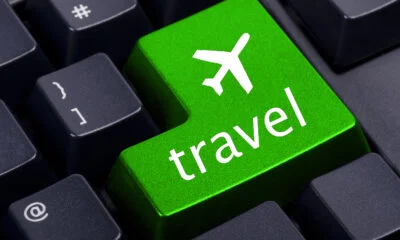
Tips For Eco-Conscious Travelers: How To Plan A Green Vacation
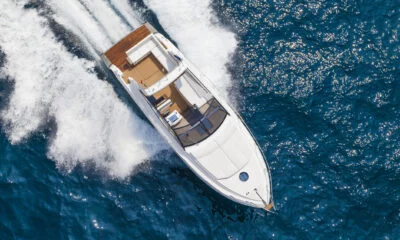
Experience Thailand at Sea Yacht Chartering as an Eco-Tourist
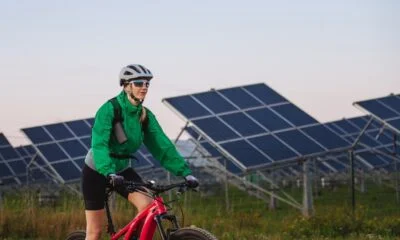
Solo Eco-Tourism Misconceptions That Need To Be Debunked
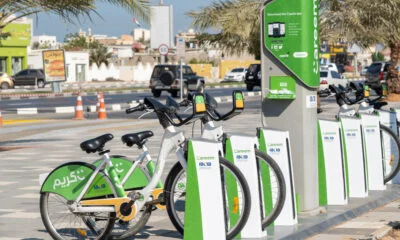
Insider Tips for an Eco-Friendly Dubai Vacation in 2024
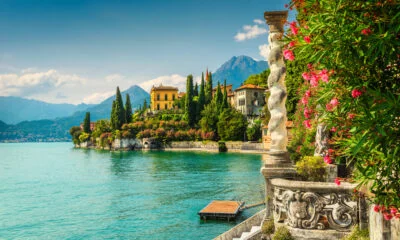
Embracing Eco-Travel in Italy: Finding Sustainable Villa Rentals
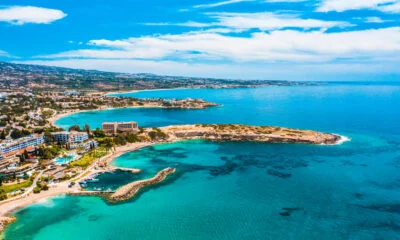
Embrace Sustainability: Eco-Friendly Travel to Cyprus
Like our Facebook Page

Solar Power Breakthrough Creates a Future Powered by the Sun

Should Green Influencers Use Alua To Build a Fan Club?

Jinko Solar’s Charitable Contributions Across the US

Your Dream of Having an Eco-Friendly Bathroom Is Within Reach

5 Ways Environmentalists Can Reduce Food Waste

A Look at Eco-Friendly Electric Semi-Trucks in 2024

Minimizing The Environmental Impact of Disposable Masks

Suneet Singal Discusses the Use of Sustainable Aviation Fuels

The Link Between Sustainable Farming & Biodiversity

Are There Still Benefits of Working in an Office?

What is the Eco-Friendliest Option to Wash Your Dishes?
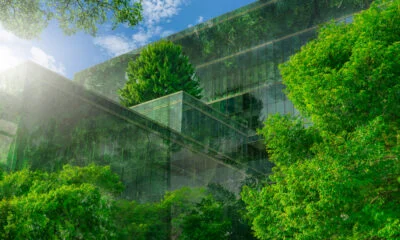
Building a Career in Green Construction: Tips and Insights

5 Ways Fleet Maintenance Software Can Help Businesses Be More Eco-Friendly
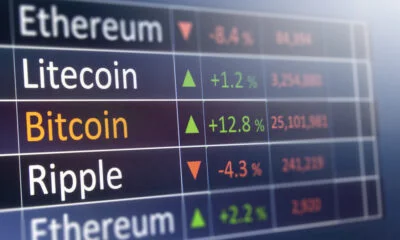
Addressing Pressing Ethical Concerns with Crypto Exchanges

- Dec 5, 2022
Discover This 4-Day Mallorca Eco-Adventure Itinerary
Updated: Aug 14, 2023
From solar-powered yachting, to family-owned ethical hideaways, this jewel of the Mediterranean offers so much more than first meets the eye, and houses a rich history and culture that will leave you adventuring for more!
Renowned for its immense beauty and captivating landscape, Mallorca offers stunning beaches, vast limestone mountains, distinctive architecture, and so much more. The Balearic island is a veritable paradise for those who love to travel, offering something for every kind of explorer. While we were here, we discovered a rich history and culture among endless natural beauty — with plenty of places that provided greener options for the eco-conscious traveller!
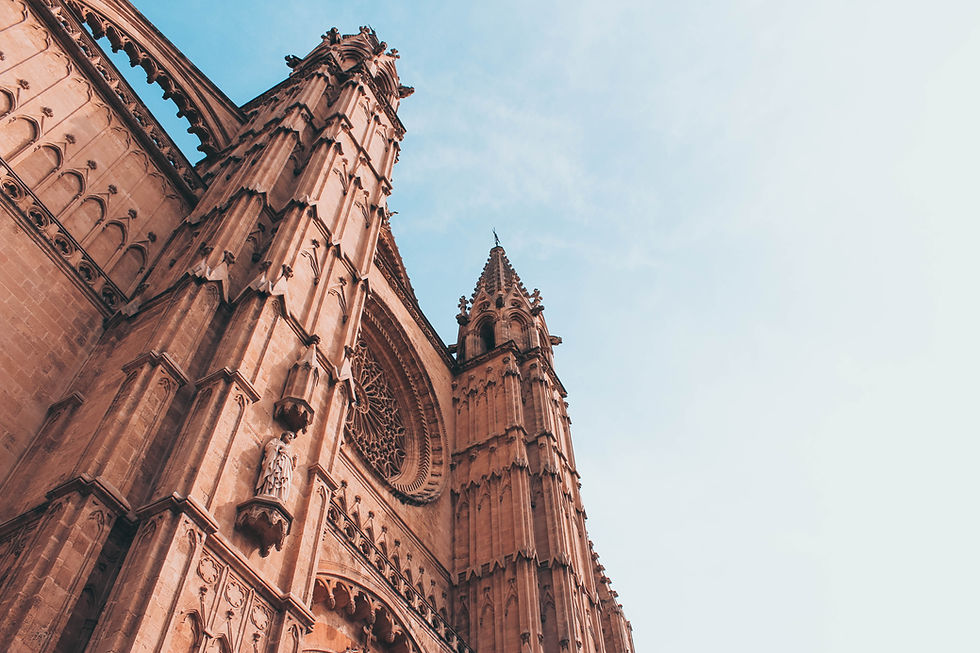
We started our journey in Palma, Mallorca’s gorgeous capital city. Here you’ll find cobblestone streets, stunning cathedrals, and plenty of vegan-friendly cafes. With rich history and endless sunshine, Palma serves as an incredible place to start your adventures through Mallorca.
Our first stop had to be Calixto Restaurant , where arguably the best paella in the region can be found. An aromatic rice dish originating from Valencia, paella has truly been perfected by Calixto, using only fresh and local ingredients. Be prepared to wait, as the paella is made to order — but it’s so worth it!

Palma is also the island’s shopping hub, with endless small boutiques and global brands alike. Next to Calixto, we found Suite 13 LAB , a boutique that offers sustainable clothing and accessories for both men and women by ethical brands from all over the world. They also have their own in-house brand, ensuring that all materials are recycled, organically grown, or responsibly sourced.
It was amazing to have a conscious spot to shop in after lunch, but we were still craving something sweet! So we stopped by a local ice cream shop to get a scoop before heading to do some sightseeing at the Catedral de Mallorca , one of the tallest cathedrals in all of Europe. Standing at 44 metres or 145 feet tall, it’s hard to miss, and is packed full of incredible history, from Gaudi’s Restoration , to the centuries-old artefacts displayed within its walls.

Thirty minutes from Palma and through the Serra de Tramuntana mountains, we revisited our home away from home, Ecocirer Healthy Stay in the little town of Sóller. An intimate, family-owned boutique hotel situated within a historic building from the 1900s, Ecocirer has now been fully restored with a guiding focus on sustainability. Guests are welcome to explore the courtyard, take a dip in the refreshing pool, or check out the sun deck during their stay, and there’s even a bike storage area for those who love cycling in the surrounding mountains in the off-season.

This was our second time visiting Ecocirer, and we were overjoyed to see how owners Barbara and Martin were doing! At breakfast, their sweet Retriever, Mango, met up with us for some snuggle times and belly rubs. We then feasted on some of Barbara’s amazing dishes, like a fresh cinnamon bun made without any refined sugar, and black charcoal toast with avocado and drizzled with cashew cream. The next day we were served a luscious yoghourt with berry compote and homemade granola, followed by silky tomatoes and olive oil on fresh seed bread. For the days we stayed here, we were happy to be full of fresh and healthy food.
To try delicious, wholesome food like this, you don’t need to wait to visit Mallorca, and can instead taste the Mallorcan spirit through Barbara’s latest cookbook, Breakfast Included , out now!
Silent Yachts
Mallorca is an island typically associated with vibrant, all-night parties, and luxury yachts dotting the coastline. One company, based near Palma, is disrupting the multi-billion-dollar yachting industry, to offer completely solar-powered luxury yachts!

Silent Yachts have spent the last 14 years developing yachts that are powered by solar energy, and are available in a range of models and sizes. The interiors are furnished using vegan textiles, lightweight and recycled countertops, and tree-less flooring materials that look like wood, without requiring the cutting down of trees and transport of timber. These luxury vessels are available for both purchase and charter, and are a great way to explore the surrounding seas while on the island.

On day three, we adventured across the island to the town of Santanyí, where on Wednesdays and Saturdays an EPIC street market takes place! From 9am to 2pm year-round, Santanyí’s market weaves throughout the entire town, selling local produce, crafts, furniture, decor, clothing, gifts, jewellery, traditional breads and pastries, and so much more. This is the best place to shop small and support local artisans!
While wandering around, we discovered the Grá Irish Gastropub , a fully vegan spot serving an eclectic mix of Irish beer, and popular foods with a Mallorcan twist. We ordered the quesadillas and Thai noodle salad and they were delicious after a full day of shopping and exploring!
For dessert, stop in any local café and ask where you can get a Granizado de Almendra! Totally plant-based, made using only almonds, almond milk, icing sugar, and ice, this is the perfect treat to cool you down on a hot day!

Cuevas del Drac
Heading north along the coast, we visited the town of Porto Cristo, to tour the Cuevas del Drac , or the Dragon Caves. Estimated to have been formed between 5 and 11 million years ago, these stunning caves are undoubtedly one of Mallorca’s top attractions, as they extend for almost 1,200 metres in length and extend 25 metres below ground level. Home to one of the world’s largest lakes, Lake Martel, the tour includes a boat ride across the lake with a live classical music concert.
This was truly a once in a lifetime experience! Sitting in a cave deep beneath the earth surrounded by million-year-old stalagmites and lights listening to classical music was just magical, and we highly recommended it!
Whether you’re looking for a laid-back beach getaway, an active hiking or diving trip, or something in-between, the beautiful island of Mallorca is a destination that truly delivers it all! Amazing scenery, delicious food, wonderful people, and rich cultures and heritages make each area and town special in their own ways. With plenty to do and a growing eco-tourism sector, there’s no shortage of planet-friendly ways to get around and make plenty of discoveries off the beaten path.
If you want to learn more about our Sustainable Travel Guide series or are interested in Sustainable Mykonos , then make sure you subscribe to the Going Green YouTube channel, and follow us on Instagram @goinggreenmedia .
Related Posts
Must-Visits for Being Plant-Based in Paris
Top 15 Eco-Stays Around the World
Your 18-Day Costa Rica Adventure Road Trip Itinerary of Dreams

We're Ben & Ciara
Going green media, we film green projects around the world that inspire action. from coral restoration projects, to vertical farms, and more join us as we work to amplify the voices, projects, and innovations creating a better, greener world., related topics:.

- Dec 1, 2023

The Coolest Off-Grid Stay in the Netherlands
- Nov 3, 2023


Ecotourism in Mallorca: an ecological journey to the jewel of the Mediterranean
In this article, we will explore the growing world of ecotourism in Mallorca and how this beautiful island is balancing tourism with conservation.
The island is known for its beautiful beaches and excellent weather throughout the year, but the island is much more than that. On this journey, you will delve into the natural secrets of Mallorca.
Ecotourism is transforming how travelers experience the natural wonders of the island. Mallorca stands out globally for its impressive diversity of ecosystems, golden sandy beaches, stunning coves, pine-covered mountains, rugged cliffs, and underwater landscapes. Additionally, it houses a rich natural and cultural heritage that attracts travelers committed to sustainability. The balance between sustainable tourism and development is an ongoing challenge. The regulation and management of tourist influx, as well as the impact of climate change on local ecosystems, are key challenges facing Mallorca.
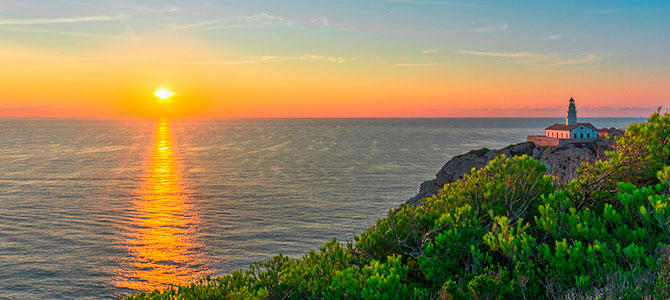
It is also home to a rich natural and cultural heritage that attracts travellers committed to sustainability. The balance between sustainable tourism and development is a constant challenge.
The regulation and management of tourist inflows, as well as the impact of climate change on local ecosystems, are key challenges facing Mallorca.
Sustainable tourism in Mallorca
In recent years, the island has experienced a revolution in its tourism industry. Travelers seeking authentic and environmentally friendly experiences have discovered a dream destination in Mallorca. The island has adopted sustainable practices and actively promoted the conservation of its natural treasures.
Eco-friendly vacation homes
At Vacalia , you can find a different type of vacation home focusing on ecology. Travelers interested in ecotourism can choose from various houses that implement sustainable practices, such as waste management and the use of renewable energy. These places are not only cozy but also integrate different ecological solutions, like chemical-free swimming pools.
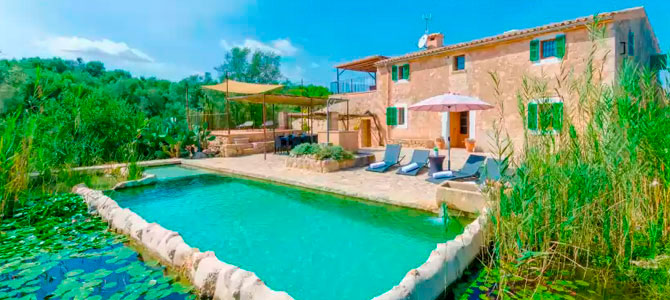
Examples of ecology in Mallorca
- Protected natural parks: Mallorca boasts several protected natural parks, such as Mondragó Natural Park and the Sierra de Tramuntana Natural Park. These places serve as havens for an incredible diversity of wildlife and offer unparalleled opportunities for birdwatching and hiking.
- Preservation of marine ecosystems: Mallorca’s waters host coral reefs and seagrass meadows. The conservation of these marine ecosystems is essential, and many local diving companies strive to protect them.
- Organic farming: Organic farming is on the rise in Mallorca, benefiting both its residents, local restaurants, and visitors.
- Clean and renewable energy: Mallorca is investing in renewable energy sources like solar and wind power to reduce its carbon footprint and move towards a more sustainable future.
- Sustainable gastronomy: Food in Mallorca is an experience in itself, and sustainable gastronomy is an integral part of ecotourism. Local restaurants make efforts to use local, fresh, and organic products, offering traditional Mallorcan dishes prepared sustainably.
- Ecological transportation: Environmentally conscious travelers can opt for bicycles and public transport to get around the island. Additionally, the use of electric and shared vehicles is encouraged to minimize the carbon footprint.
Ecological activities in Mallorca
- Hiking in the Sierra de Tramuntana: Explore the stunning UNESCO World Heritage-listed Sierra de Tramuntana through its numerous trails. Enjoy panoramic views and the freshness of pine forests.
- Sustainable cycling: Mallorca is a cyclist’s paradise. Rent a bike and explore the island in an eco-friendly way, enjoying its beauty while caring for the environment.
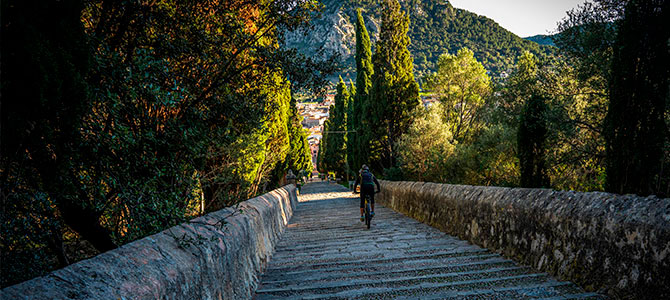
- Visits to eco-friendly vineyards: Discover Mallorca’s rich winemaking tradition by visiting vineyards practicing ecological viticulture. Taste locally-produced wines made from sustainably grown grapes.
- Birdwatching: Mallorca is a major stopover for migratory birds. Observe birds in their natural habitat in wetlands and nature reserves on the island. The preservation of these birds is vital for the island.
- Kayak exploration: Kayaking is an eco-friendly way to explore Mallorca’s coastlines. Kayaks emit no polluting gases and are silent, minimizing disruption to marine life and allowing visitors to experience the tranquility of the island’s crystal-clear waters.
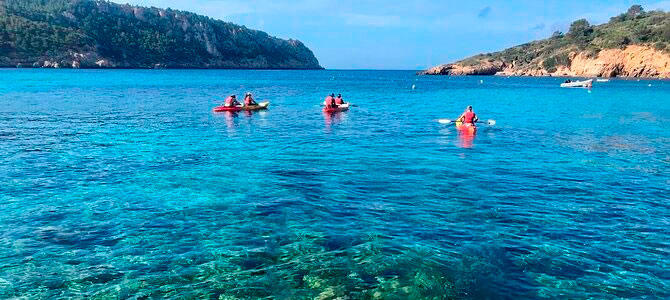
- Environmental education and awareness: Mallorca offers environmental education programs for tourists interested in learning more about the island and its environment. Visitors are also invited to participate in local conservation projects.
Commitment to a sustainable future
Mallorca has shown that tourism and conservation can harmoniously coexist. Ecotourism on the island offers visitors a unique and sustainable experience while protecting and preserving its natural and cultural environment for future generations. By choosing ecotourism in Mallorca, travelers can be part of this solution and contribute to the well-being of the planet.
Mallorca is a natural treasure inviting you to explore its wonders while joining the growing revolution of sustainable tourism.
Ecotourism in Mallorca creates local jobs and provides incentives for the conservation and restoration of natural areas, benefiting local communities.
This is a place where ecology and travel merge into an unforgettable experience that will leave you with lasting memories and a profound appreciation for the importance of protecting our planet.
Come and discover Mallorca sustainably and responsibly!
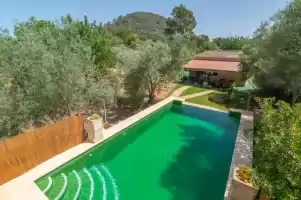
Llucmajor, Mallorca
- Air conditioning
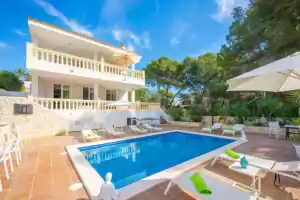
Capdepera, Mallorca
- ← Discovering the Hidden Treasure of Moraira
- What to visit in Gibraltar →

- Hotels in the City
- Hotels on the Coast
- Hotels in the Mountains
- Hotels in the Country
- Hotels for Families
- Group Bookings
- Discover Mallorca
- Unique Experiences
- Mallorca Life
- Summer in Mallorca
- Autumn in Mallorca
- Winter in Mallorca
- Spring in Mallorca
- Testimonials
- Newsletter Sign Up
Mallorca – aiming to be a global leader in sustainable tourism
- 2nd Jan '24
Mallorca has been attracting visitors from Europe and further afield for decades not just for its warm climate and stunning beaches but also for its history and culture and, in more recent years, to savour its award winning cuisine, walking and cycling trails and its swathe of new luxury and boutique hotels .
But how to protect this unique island paradise for future generations and create a sustainable Mallorca ?
With tourist numbers peaking at some 12 million in 2019 , the Mallorcan authorities already had a plan in place.
Sustainable Tourism Tax for a Sustainable Mallorca
Introduced six years ago, this tax (often referred to as ‘the eco tax’) requires visitors to pay between 25 cents and €4 euros per day, depending on time of year and type of accommodation. It has proved to be a tremendous success. These contributions from individuals amount each year to a very significant sum used to finance projects aimed at protecting the environment, restoring cultural heritage and promoting ecotourism on the island.
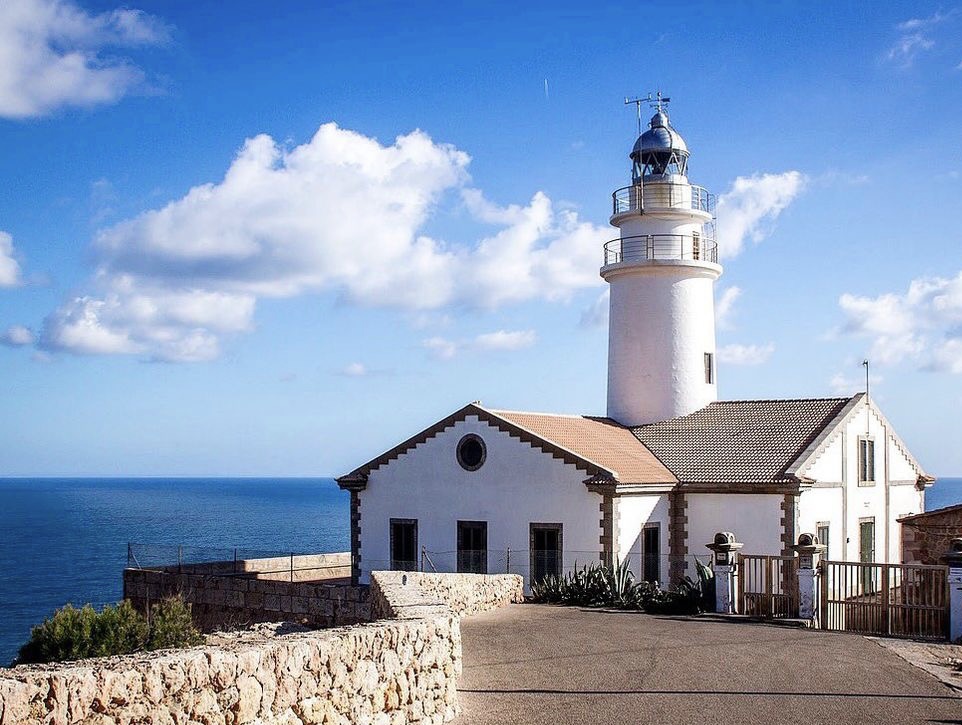
There are over 60 such projects underway in Mallorca including the restoration of the medieval wall around the town of Alcudia in the northeast of the island, improvements to water-treatment and desalination plants, better maintenance of drainage channels (known as ‘torrents’) which play a critical part in the island’s agriculture as well as restoration works on island landmarks such as the castle in Cabrera and the lighthouse in Capdepera.
Aiming for a plastic – free Mallorca
One of the boldest moves took place in March 2021 across the Balearic Islands with the ban of single-use plastics. No plastic glasses, plates, trays, cutlery, straws, coffee capsules, cotton buds or disposable razors or lighters can now be sold on the islands.
They have stopped short of plastic water bottles for the moment but this is where partnership with local organisations and private companies holds the key.
Philipp Baier, a local and owner of event company LifeXperience , was inspired to start cleanwave.org , a non-profit initiative aimed at tackling plastic water bottle consumption and waste. Around 1.5 million bottles of water were consumed per day in 2017 in the Balearics with less than a fifth recycled.
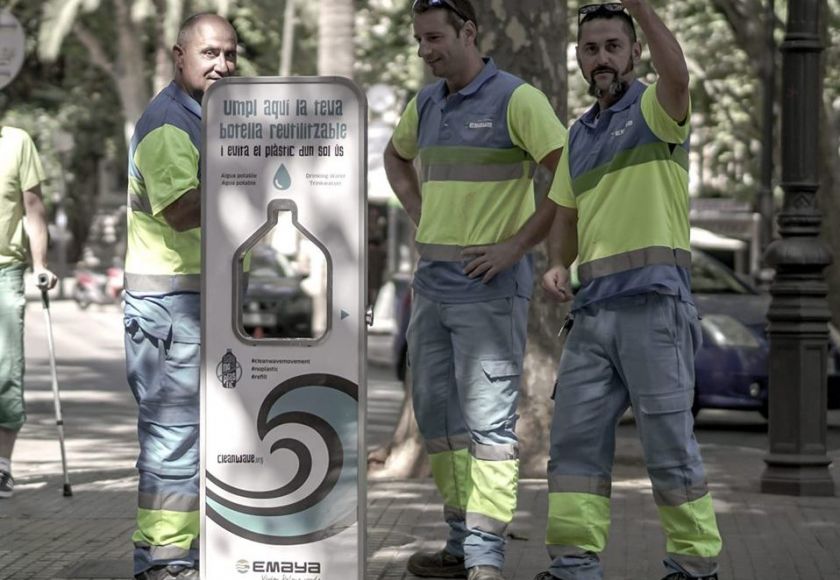
cleanwave.org grew out of the determintion of like-minded individuals, businesses, restaurants and hotels to tackle the problem and who now offer free water bottle refill stations islandwide. The local government have also come on board and are installing permanent water refill points across Palma and all the tourist hot-spots.
As regards plastic in the sea , Save the Med , a locally founded charity, has a mission to `enable the Mediterranean Sea to recover its rich biodiversity and to thrive in harmony with local populations ́ and, in addition to organising beach cleans etc , it also has a schools programme which educates the next generation in the importance of protecting the marine ecology of the island.
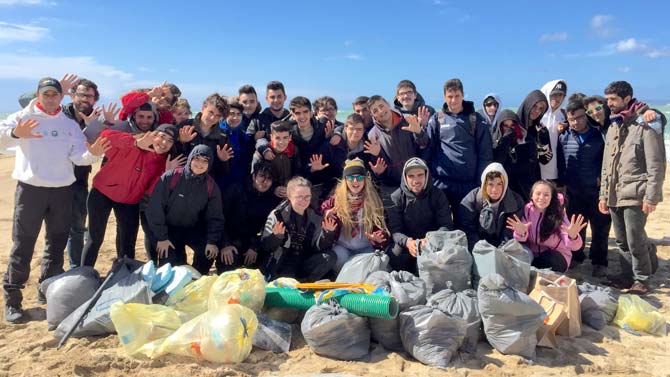
Hotels are doing their bit too. The Mallorcan hotel group, Iberostar is working with Wave of Change on the elimination of single-use plastics, the promotion of responsible fish consumption and coastal protection.
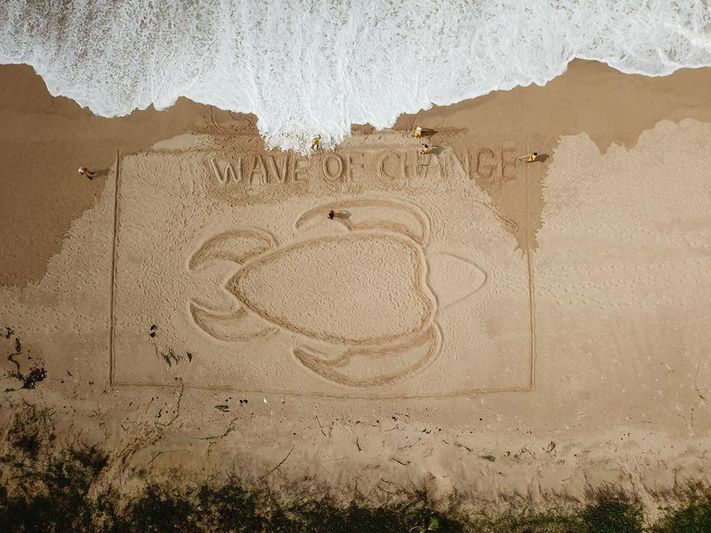
“Without sustainability there is no profitability, and without profitability we cannot be sustainable,” stresses CEO Sabina Fluxá “. All Iberostar hotels are now free of single-use plastic, just a few years away from waste-free by 2025 and carbon- neutral by 2030.”
In 2018, the Spanish hotel group Meliá , banned plastic and single use products and replaced them with biodegradable or environmentally friendly alternatives. Guests can participate in their Green Choice initiative by hanging a ‘Green Card’ on the door, meaning no need for bed linen and towels to be changed.
Making Mallorca a year-round destination
Spreading visitor numbers across the whole year serves to take pressure off resources and the environment during the high summer months and reduces excessive water , energy and fuel consumption during this high demand period. all contributing to a sustainable Mallorca.
With its mild climate, the push has been to promote the island as a year-round activity destination, particularly for runners, walkers and cyclists.
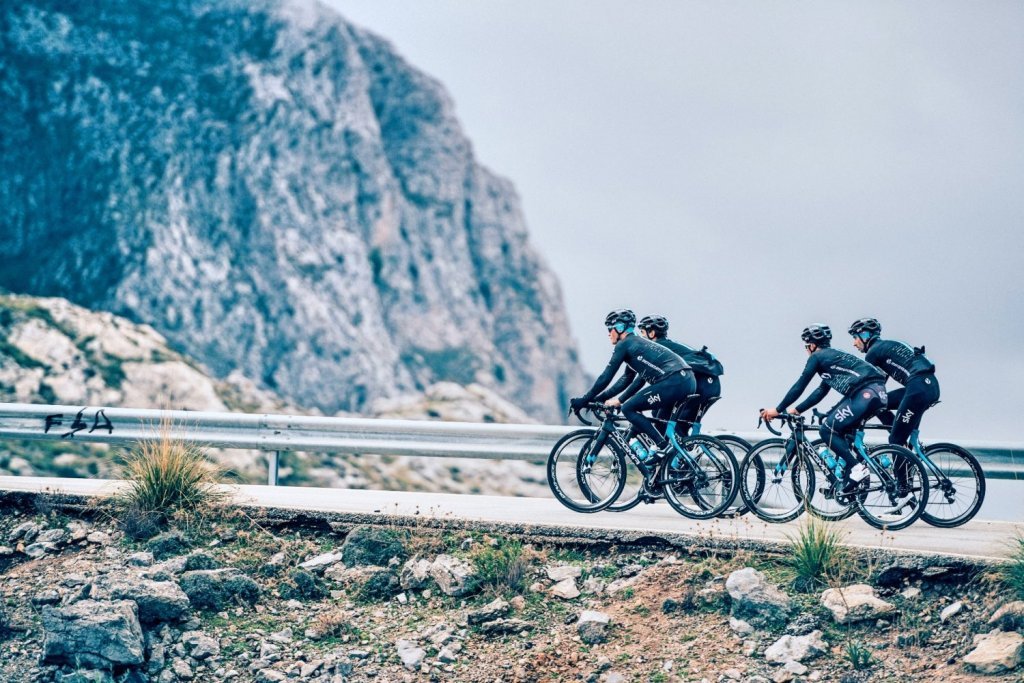
The Zafiro Marathon kicks this programme off in October and walkers and cyclists arrive in their thousands.
Many hotels now have secure bike storage facilities and repair workshops. Palma City Council is currently extending the city’s 90km cycling network, with plans to have 100km of bike lanes in and around the Mallorcan capital in the coming years.
The jewel in the crown for walkers is the famous GR221 walking route which goes from south to north along the Unesco World Heritage Tramuntana mountain range . The eco tax has funded the upkeep of this ancient 170km routeway, with its signature dry stone walls.
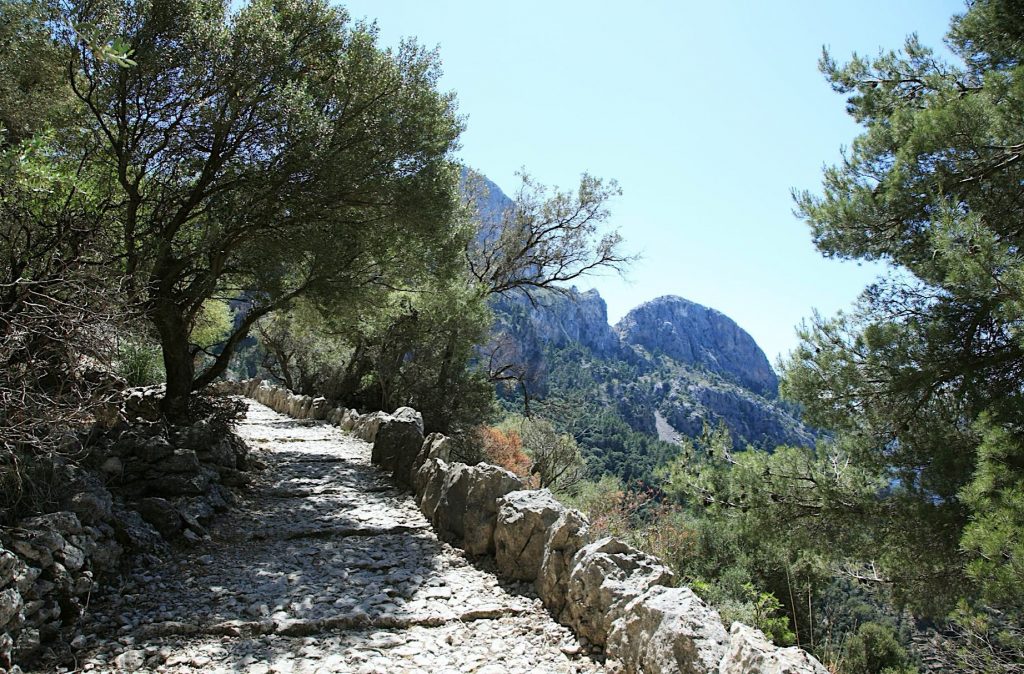
Refuges for walkers along the route are also benefiting . For example Ses Porqueres de Galatzo in heart of the Serra de Tramuntana , originally a cattle shed, is being developed into a refuge with dorm beds and a space for educational and cultural activities.
Solar Energy
With an average of 360 days of sunshine per year , few other places in Europe offer such potential for solar energy as Mallorca !
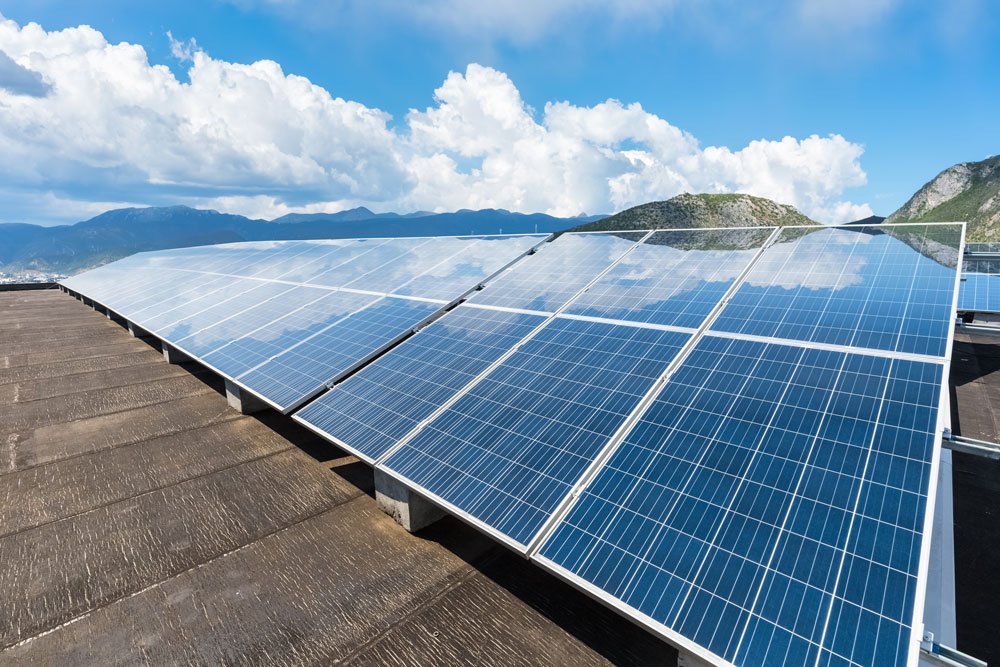
Some 260 million euros of investment is being made in photovoltaic installations (solar panels to you and me ) in the Balearics. Of the 55 projects, 46 of these solar parks will be in Mallorca. For example, Enel Green Power has completed its Sa Caseta plant in Llucmajor and their second plant Nou Biniatria is being constructed outside Alcudia.
Mallorca depends on tourism and is determined to build a better and more sustainable future for the island.
A sustainable Mallorca depends on a partnership of local government, private organisations, residents and tourists who together can combine their efforts effectively for a better and cleaner future.
Related Articles
Calvari steps in pollensa, lunch in palma, walk along the bay of palma, 5 best luxury countryside hotels in mallorca with great food., bellver castle.
Mallorca: A surprisingly eco-friendly travel destination
Disclosure: Bear in mind that some of the links in this post are affiliate links and if you go through them to make a purchase we will earn a commission at no additional cost to you. We chose these companies / hotels because of their quality and not because of the commission we receive from your purchases.
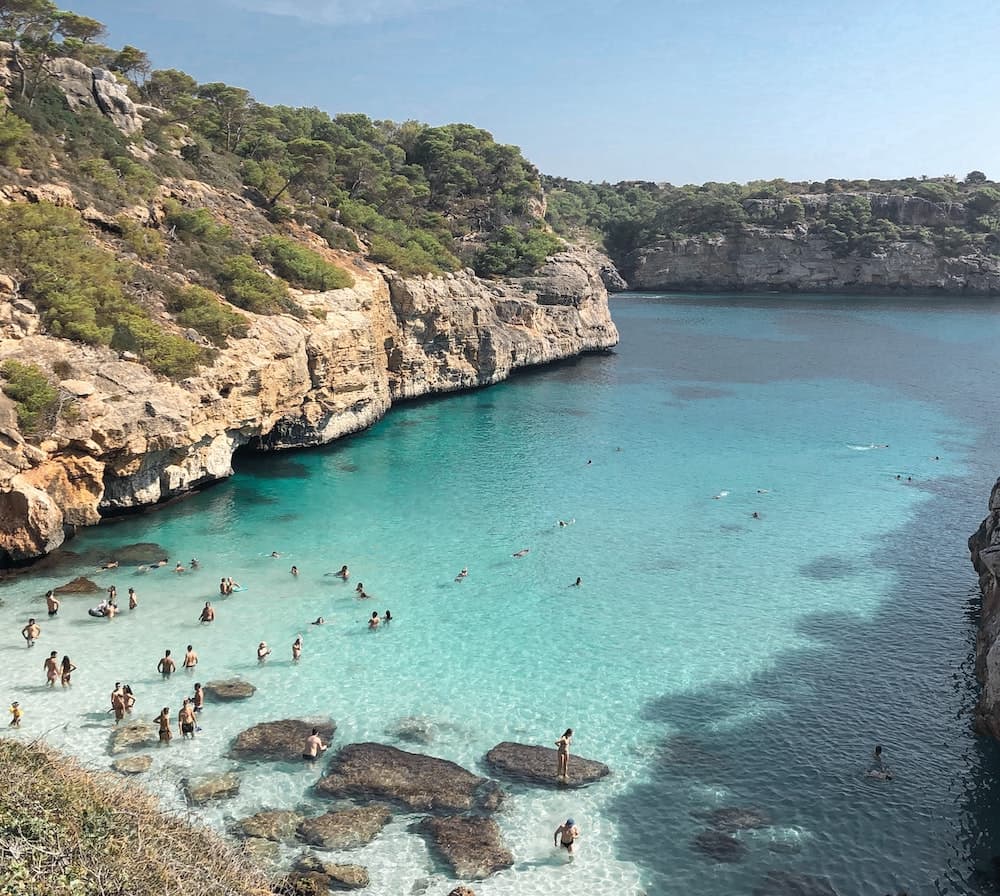
How Mallorca Aims To Become More Sustainable
Mallorca is a popular destination for its stunning beaches and gorgeous natural landscapes. However, as tourism has increased in recent years, the island has faced some growing concerns regarding its sustainability. To address these issues, the government of Mallorca has taken several necessary steps to make the island more environmentally friendly. Notably, they have imposed limits on the number of cruise ships that can dock in the port at any given time to reduce the strain on resources. Additionally, they have adopted new policies to encourage conservation and reduce waste. These policies include expanding recycling programs and encouraging residents and tourists to adopt more sustainable transportation methods like walking and biking.
How To Get Around Mallorca Without Harming the Environment
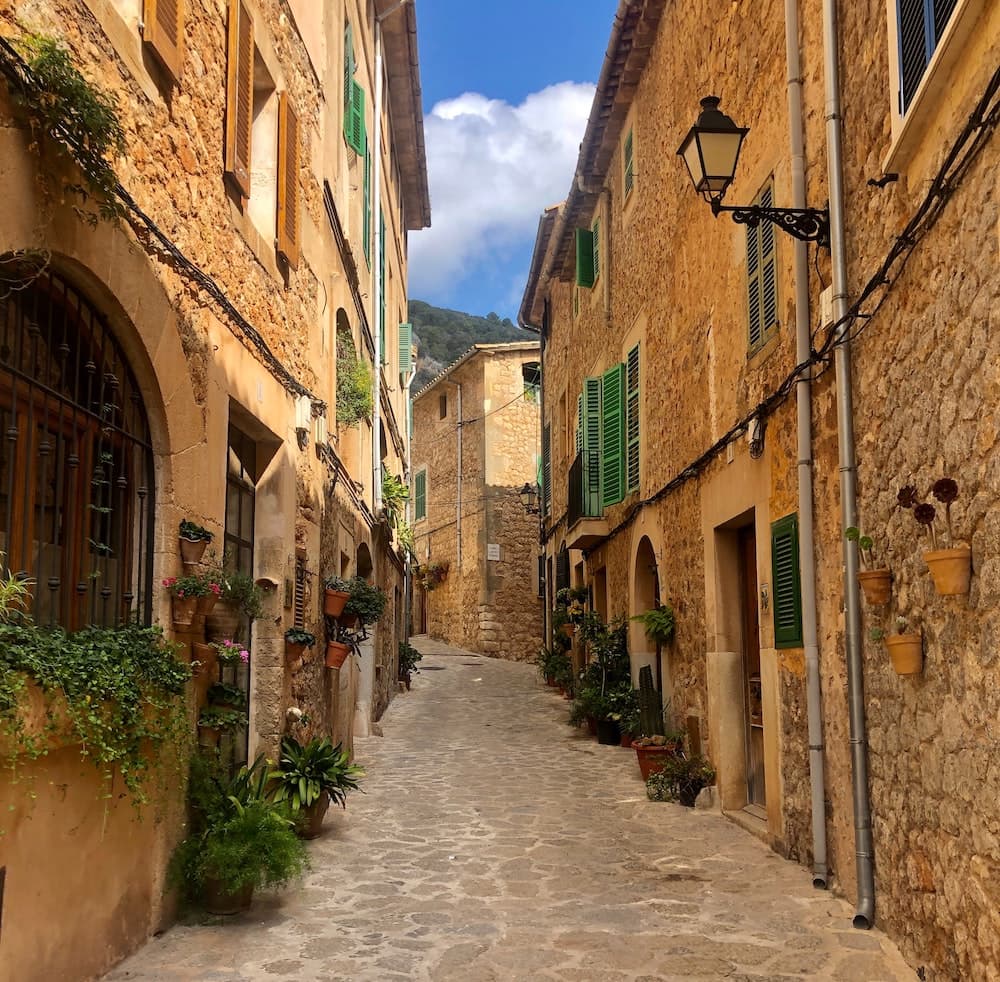
The Best Places To Stay in Mallorca for a Sustainable Holiday
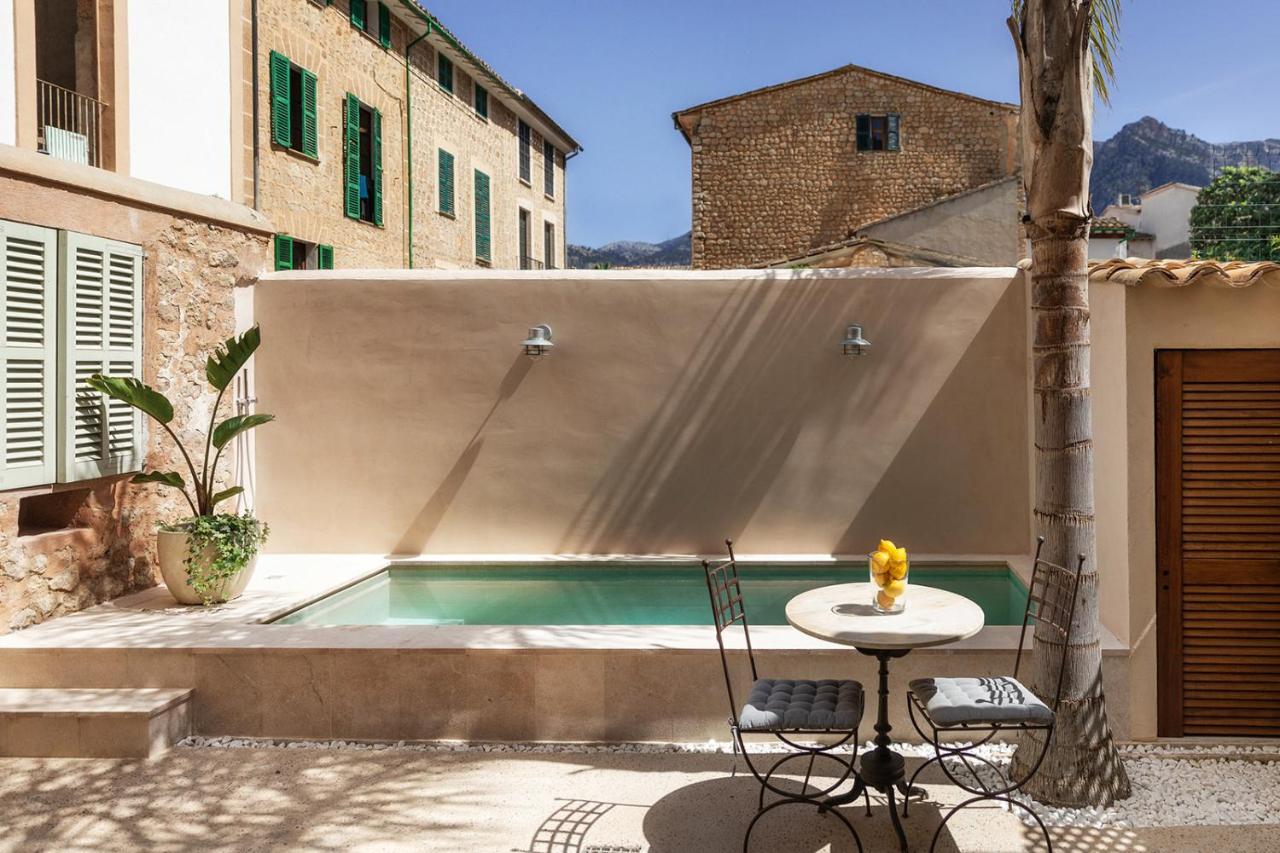
What To Do in Mallorca That Won't Damage the Local Ecosystem
Mallorca is a place rich in culture and activities that won't negatively impact the environment. Here are some ideas if you're looking for something more adventurous than snorkeling or hiking. Trust us, you'll be thanking us later! Visit the Hams Caves The Hams Caves are a must-visit destination for anyone exploring the gorgeous island of Mallorca. There are three different caves to explore, each with its unique appeal: the Round Cave, the Blue Cave, and the Classical Cave. The Round Cave is perhaps the most striking of the three, thanks to its beautiful botanical garden full of life and vibrant greenery. Visitors can stroll through winding pathways and spot an array of native birds while taking in the gorgeous scenery. The Blue Cave is another fascinating stop along the tour, featuring an impressive underground lake known as the Sea of Venice. Here, visitors can enjoy a captivating musical show as they take in the ethereal natural beauty all around them. And last but not least, there is the Classical Cave - a sprawling network of 12 galleries filled with fascinating caves and hidden pockets to explore. See Mallorca's Top Attractions on E-Bike Nothing beats the thrill of exploring a new city on two wheels. Whether pedaling through bustling streets or cruising down scenic roads, bike riding offers an unparalleled sense of freedom and adventure. If you're looking for an extra kick to your next urban cycling trip, check out the 3-hour e-bike tour in Palma de Mallorca. During this tour, you'll have the chance to explore some of the top attractions in this beautiful Spanish city. You'll journey through the winding streets of the Old Town and take in stunning views from Bellver Castle and the Basilica de Sant Francesc.
The Best Time to Travel to Mallorca
Mallorca is a year-round destination, but the best time to travel depends on your preferences. If you're looking to enjoy the island's beaches and outdoor activities, in that case, the best time to visit Mallorca is from June to September. However, if you prefer cooler temperatures and fewer crowds, late October through April is a great time to travel. Click here for more climate information about Mallorca.
Bottom Line
When you visit Mallorca, you're sure to have an unforgettable experience. This beautiful Spanish island has something to offer everyone, from stunning natural scenery to fascinating cultural attractions. And with a growing number of sustainable hotels and eco-friendly activities, Mallorca is quickly becoming one of the best destinations for eco-conscious travelers.
This article was last updated on November 01, 2022.
© 2010-2024 World Weather & Climate Information All rights reserved.
How Spanish islands like Ibiza and Mallorca aim to become a model of sustainable tourism

Feb 23, 2023 • 5 min read
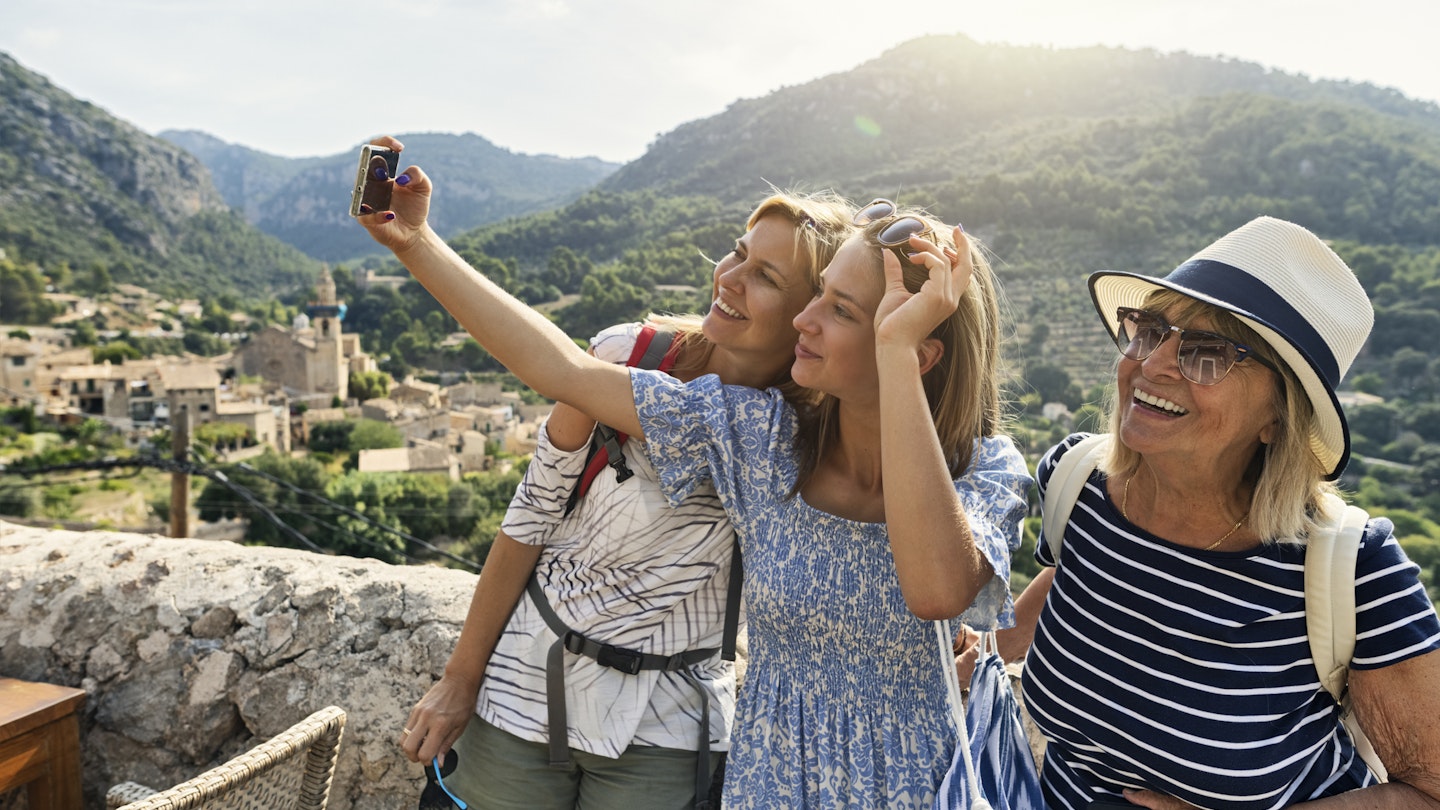
The Balearics wants to become the "world's first circular destination" © Getty Images
Loved for their shimmering beaches, sunny year-round climate and seductive hotels, the four wildly beautiful Balearic Islands make up one of Europe's most sought-after destinations, just off Spain's east coast.
But whether it's the party crowd flocking to Ibiza and Mallorca or summer sun-seekers descending on Formentera and Menorca , overtourism on these blissful Spanish islands has grown into a major concern in recent years. As a result, the Balearic authorities have taken a pioneering role in Spain by introducing a raft of new responsible tourism measures to become 'the world's first circular destination.' The goal is to achieve a more balanced and sustainable tourism model that also protects the islands' natural environment and the needs of the local population.
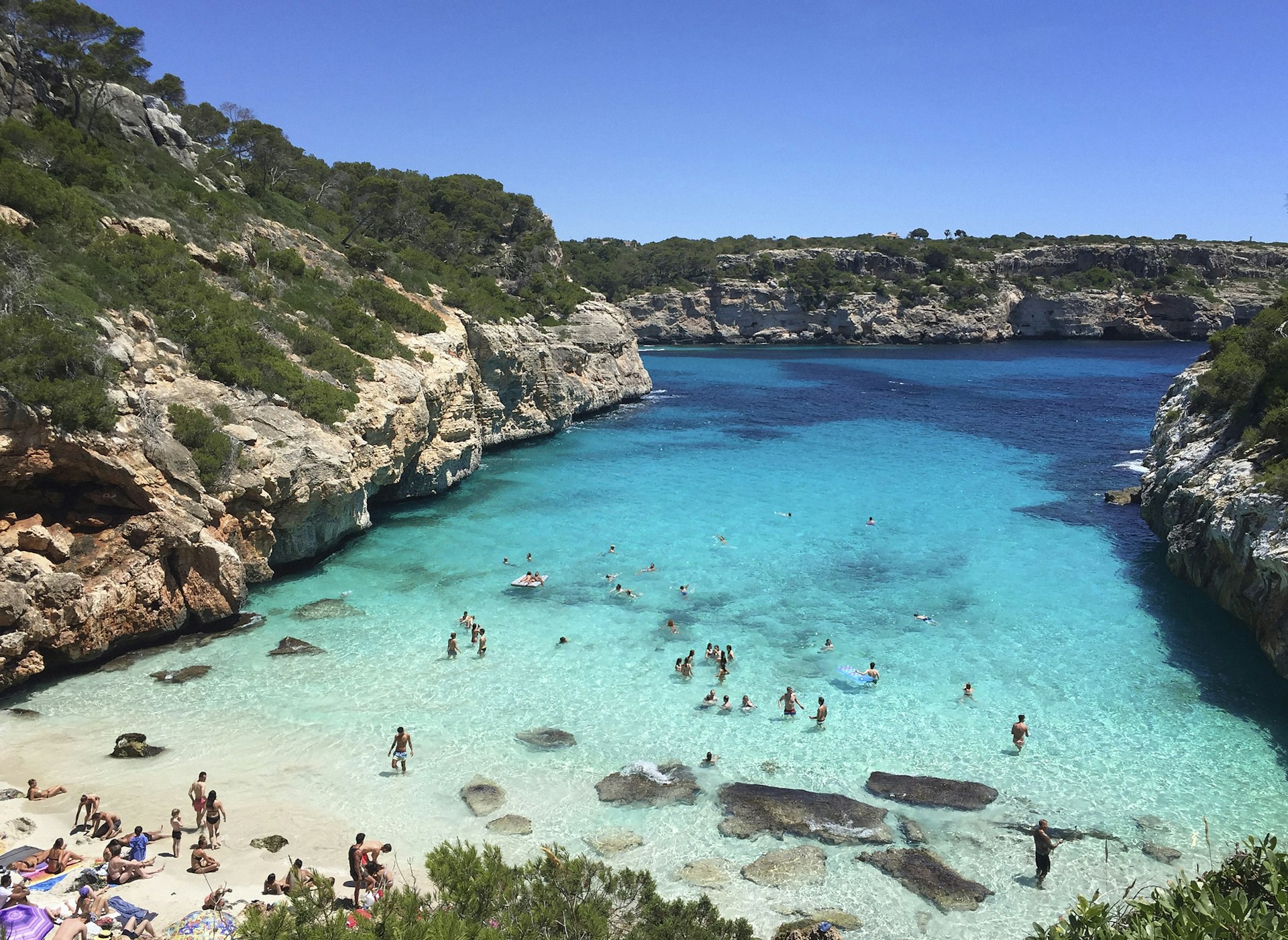
In 2022, the Balearics received about 16.5 million visitors, around the same number as pre-pandemic in 2019. For context, the whole of Andalucía, for example, welcomed about 30.7 million tourists in 2022, while Spain's eight Canary Islands had around 14.5 million tourists. Now, reducing summer visitor numbers, encouraging off-season travel and boosting in-depth cultural visits that benefit the islands' communities are all part of the Balearics' long-term plans.
Discovering the off-season beauty of Spain’s Balearic Islands
"Sustainability and the circular economy are at the very core of the Balearic Islands' tourism strategy. It is crucial that we protect the natural environment and cultural heritage of our islands, for both residents and future visitors to enjoy for years to come," Iago Negueruela, tourism minister of the Balearic Islands, tells Lonely Planet. "Our islands have so much more to offer than sun and beach, and we encourage tourists to visit outside of high season to experience our cultural, gastronomic and active offerings, thus spreading the flow of tourism throughout the year."
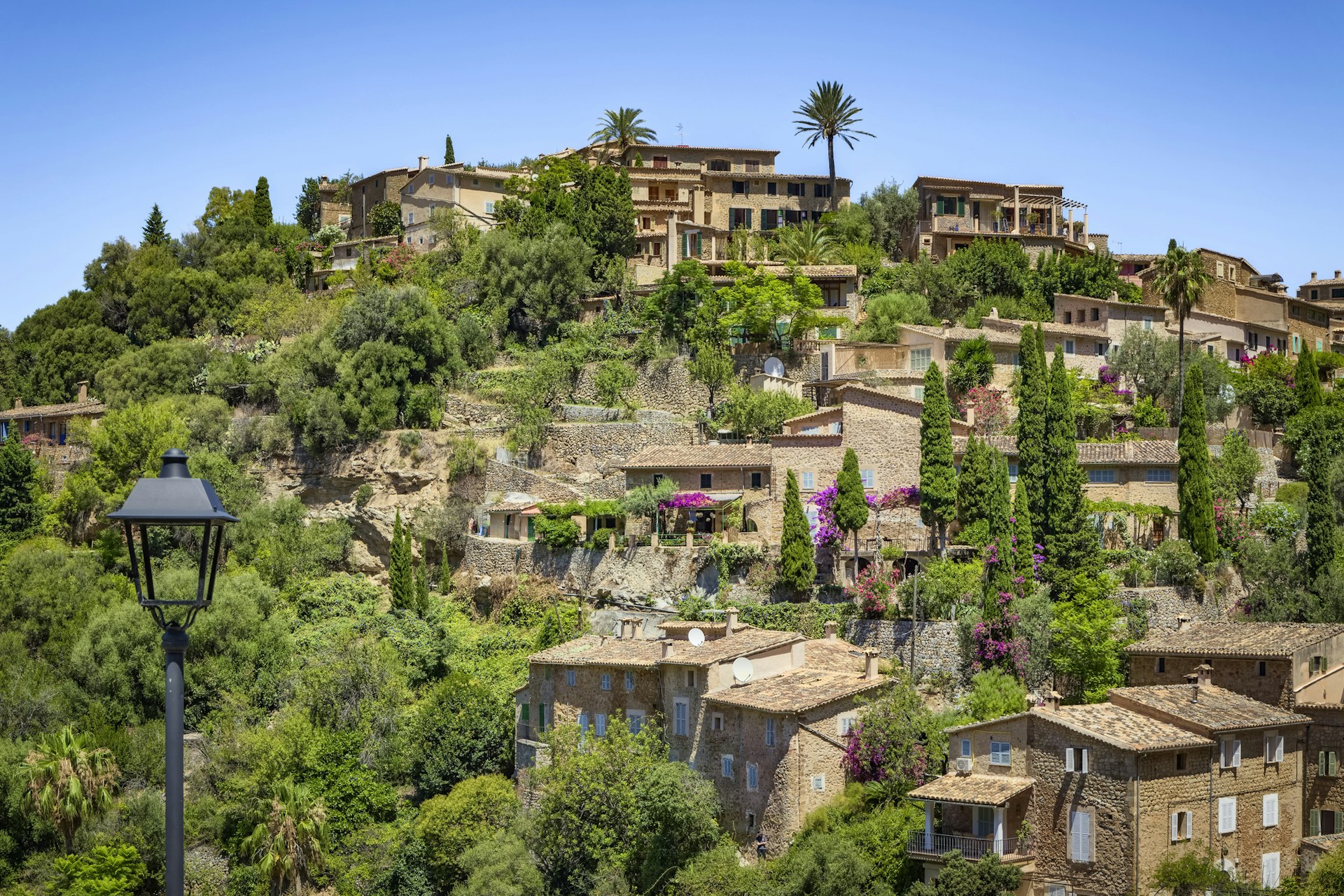
Staying overnight? You have to pay a tourism tax
Following in the footsteps of its mainland neighbor Catalonia , the Balearics became Spain's second region to introduce a tourism tax back in 2016. The Impuesto del Turismo Sostenible (ITS; Sustainable Tourism Tax) or ecotasa means a charge of €1 to €4 per person per night in tourist accommodation, which is channeled back into local conservation efforts, such as the preservation of the oxygen-producing posidonia seagrass that gives the Balearic Sea its famous turquoise sparkle and the restoration of various mountain lodges in Mallorca's rugged Serra de Tramuntana. It's a growingly popular approach – the Valencia region has just approved a tourist tax due to come into force in 2024, and several other popular Spanish destinations are rumored to be considering it, including San Sebastián, Málaga, Granada, Seville and Santiago de Compostela.
The 10 best beaches in Spain
Ban on new hotels and other tourist accommodations
Then in 2022, the islands brought in a ban on creating new hotels and other tourist accommodations (apartment rentals included) until at least 2026. Existing accommodation can now only extend or refresh its current buildings by 15% and always with the condition of reducing the number of beds by 5%. In Mallorca's capital Palma , Airbnb-style tourist apartments have been banned since 2018, amid growing concerns that rising rents have been pushing out local residents. Another key element is the protection of local workers in the tourist sector, with initiatives including a recent ruling that all four- and five-star hotels must have lift-up beds to help reduce injuries and overexertion among housekeeping staff.

Less pollution, less noise and alcohol limits
In a bid to preserve its natural spaces, Formentera (the go-slow Balearic sister still only accessible by ferry, off Ibiza's southeast coast) has been limiting vehicle access during high season since 2019. From mid-June to mid-September, non-Balearic visitors who want to drive a car or motorbike here must apply in advance for a permit and, if approved, pay a daily tax of €3 (minimum €15 total) or €1.50 (minimum €7.50 total) respectively; electric vehicles are excluded, while hybrids get a 50% discount. Menorca is now also considering a similar scheme that could begin as early as this summer, as part of the new Menorca Reserva de la Biosfera law approved in January 2023.
16 of the best things to do in Ibiza: fall under the island's spell
Elsewhere, to explore the Balearics' bird-rich sole national park, the Parc Nacional Marítim-Terrestre de l'Arxipèlag de Cabrera in Mallorca, visitors must also pre-book permits; just 200 to 300 people a day are allowed access and only to the main Illa de Cabrera, from Easter to October. In the party-loving hubs of Ibiza and Mallorca, limits on the number of alcoholic drinks that can be served at all-inclusive resorts have been in force since 2020. The islands are also actively increasing transport links outside summer, such as a recently launched year-round Vueling flight between London and Menorca. Meanwhile, some local hotels are already taking the plunge and staying open throughout the low season.
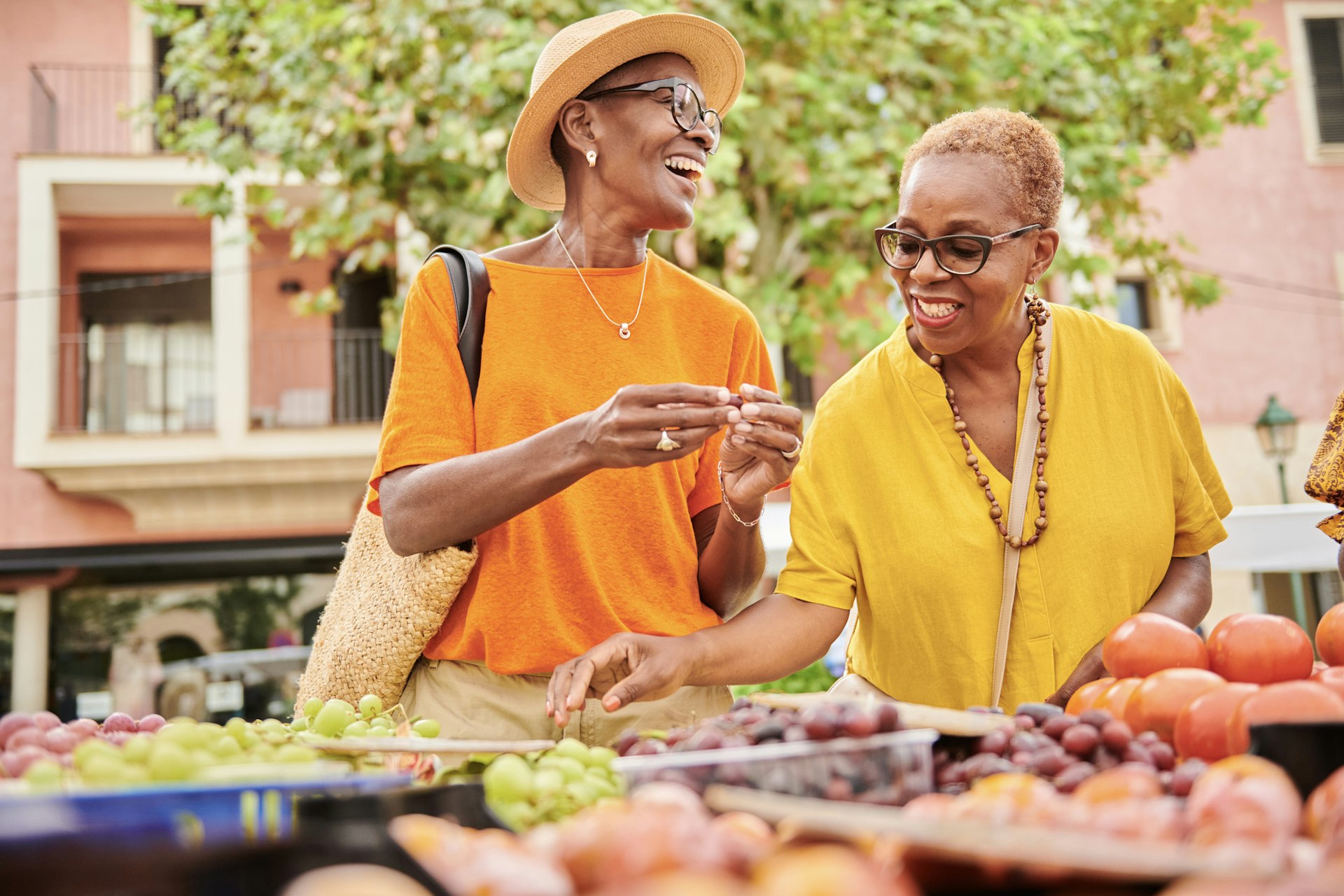
How you can contribute responsibly
For anyone traveling to the Balearics, there are plenty of ways to contribute responsibly. How about taking advantage of the islands' reliable ferry links with mainland Spain and skipping the flight? Or dining at independent restaurants celebrating Balearic cuisine and fresh on-the-doorstep ingredients? You can also shop at local farmers' markets and artisans' shops; choose low-impact activities such as hiking, cycling or horse-riding, ideally with an expert local guide; and learn about the islands' many unique traditions, from cheese-making to foraging botanicals for Ibiza's beloved hierbas tipple.
Tourist accommodation is a major part of the picture – seek out a responsible base that is genuinely committed to more sustainable tourism, which might include lovely rural agroturismes keeping local traditions alive or stylish boutique hotels reviving historic buildings while prioritizing eco-friendly initiatives.
Explore related stories
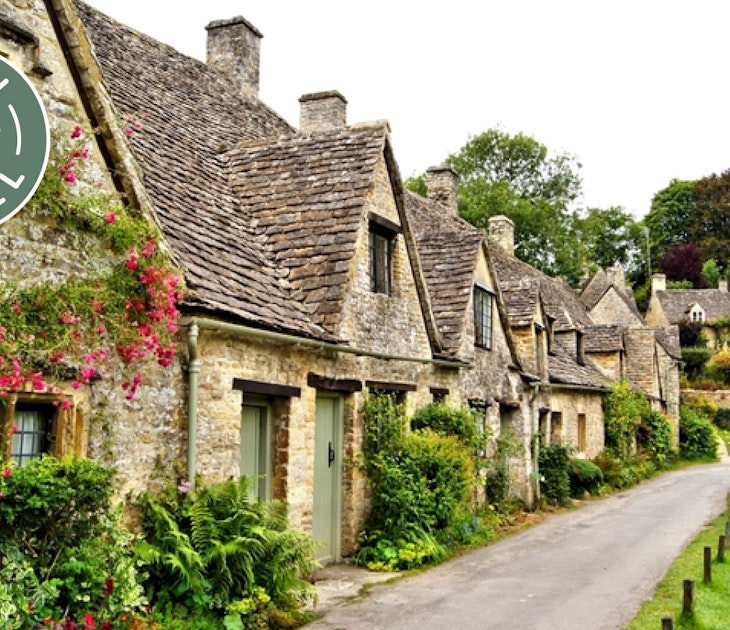
Jun 30, 2023 • 6 min read
Everything you need to know about walking the Cotswold Way.
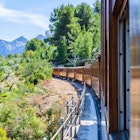
Apr 3, 2024 • 15 min read
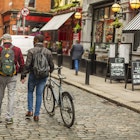
Mar 31, 2024 • 6 min read
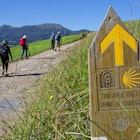
Mar 25, 2024 • 6 min read
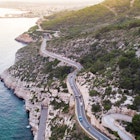
Mar 13, 2024 • 7 min read
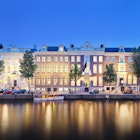
Mar 8, 2024 • 17 min read
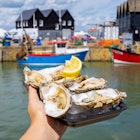
Mar 2, 2024 • 7 min read
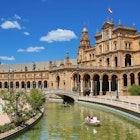
Feb 28, 2024 • 3 min read

Feb 13, 2024 • 7 min read
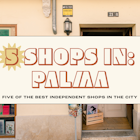
Feb 2, 2024 • 6 min read
European customers, please see our shipping page for details on Brexit.
This is a banner close
Log in or sign up
Username or email address *
Password *
Remember me Log in
No products in basket
Cora's 5 tips to travel conciously in 2020
In a time to too much carbon, Our co-founder Cora Hilts talk travel guilt and how she overcomes it. This is her 5 top tips to traveling conciously.
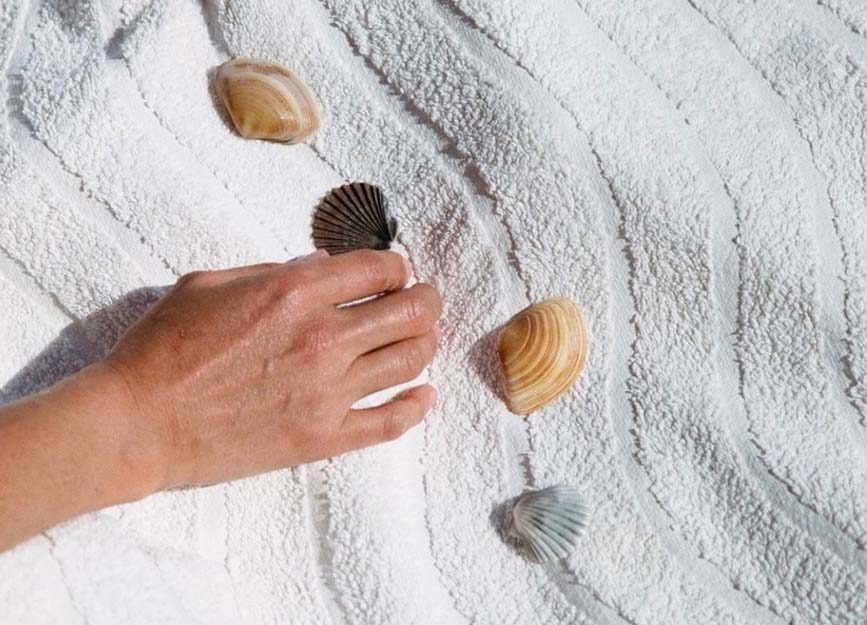
@cookieandkin
@the.golden.boheme
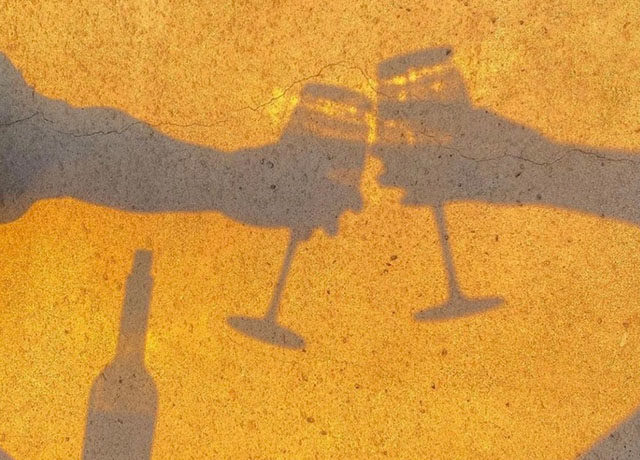
@analuiphotography
Our Four Favourite Eco Hotels in Mallorca
As travel becomes a bit safer, we are thinking a bit about how we will eventually go back to traveling as consciously as possible. After a bit of a rainy summer here in the UK, the sunny islands of Spain have been calling to us and we were thrilled to see so many incredibly eco-friendly hotels in Mallorca. We wanted to share our top five for anyone looking to support sustainable travel that really connects you to the local community and environment.
Trains are a beautiful way to travel and much much less polluting than cars or airplanes if you are Lorem ipsum dolor sit amet, consectetur adipisicing elit. A adipisci consectetur dolores dolorum ducimus eos excepturi expedita facilis fugit iste laboriosam perspiciatis quaerat quas rem repellendus suscipit vel, voluptas voluptatibus.
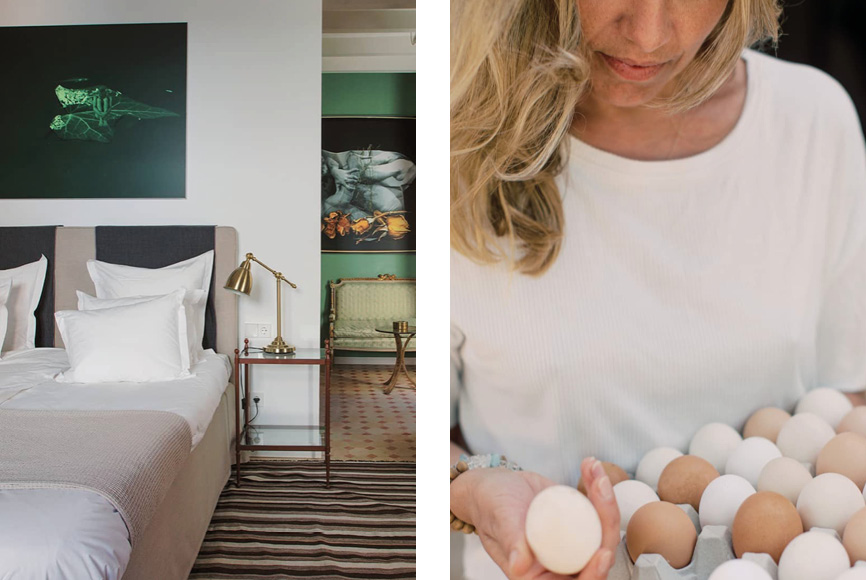
This small but absolutely beautiful hotel, located in the town of Sóller, is based completely on reconnecting to nature. They offer their guests a healthy vacation in an idyllic setting, incorporating sustainability and nutritious cooking. Ecocirer ‘s entire menu is organic and local, with amazing vegan and vegetarian options that change daily depending on what is fresh and ready in the garden!
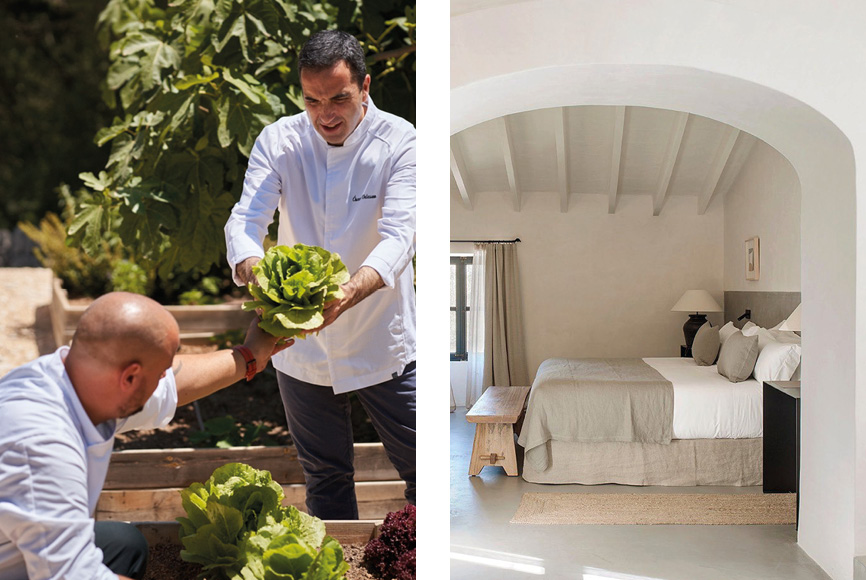
Finca Serena
This former farmhouse is tucked right in the middle of Mallorca on a beautiful rolling romantic estate. Finca Serena has a beautiful kitchen garden and orchards that supply a lot of the produce that the hotel uses. What they don’t grow is sourced organically and locally. The entire hotel and property is just beautiful, and even their water and pool are heated sustainably using solar power.
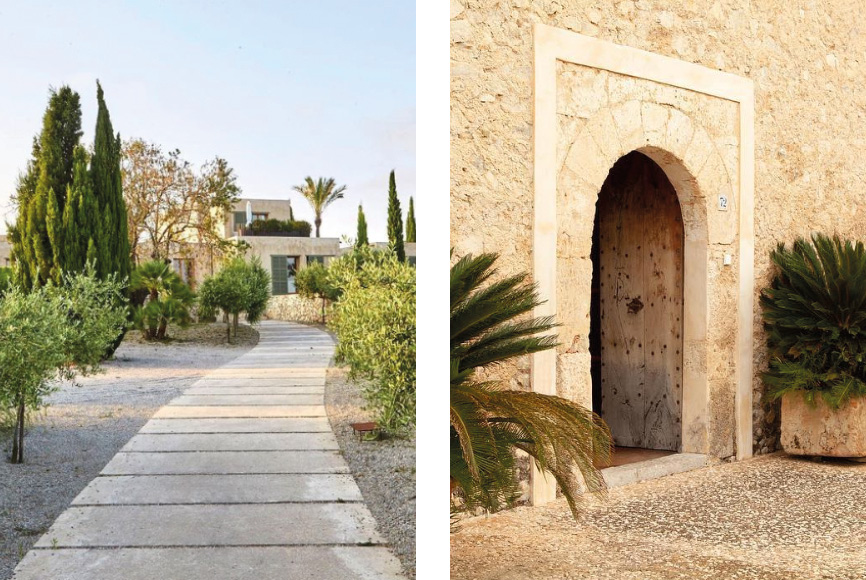
This 18th century farmhouse is set between Son Servera and Artá, only an hour away from Palma. Son Gener is a small hotel with gardens of almonds and olive trees that surround the houses. From the hotel, you have beautiful views of the surrounding hills and ocean in the distance. The restaurant is a must visit as it is completely organic and straight from the hotel’s own property. A major plus is the hotel has onsite chargers for electric cars!
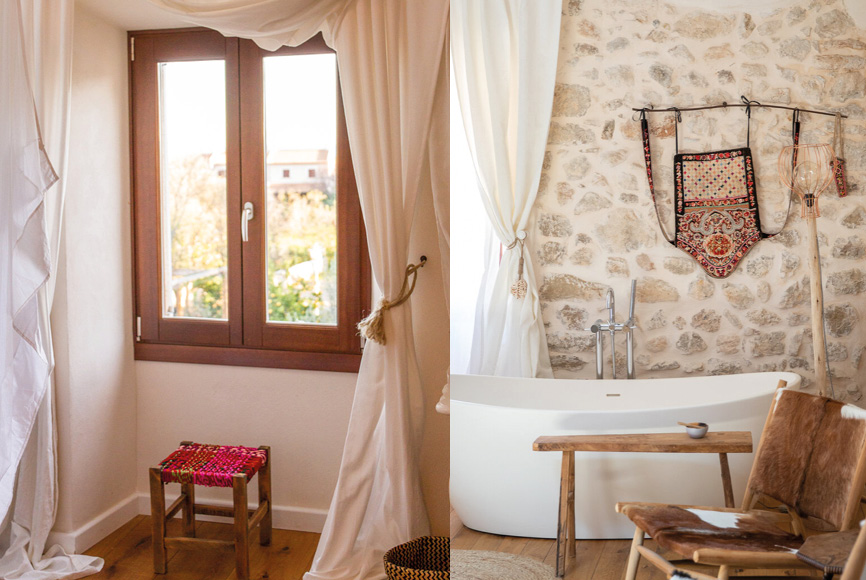
The Pink Pepper Tree
This 8 bedroom hotel is nestled at the edge of a rural village in the feet of the Tramuntana mountains the middle of Mallorca. If you are a big natural wine fan, The Pink Pepper Tree is the one for you, as they work with local and small wineries to bring their guests the best wine. You’ll find one of the owners Jacqueline creating incredible 4 course meals each week using fresh ingredients from their garden or the local market.
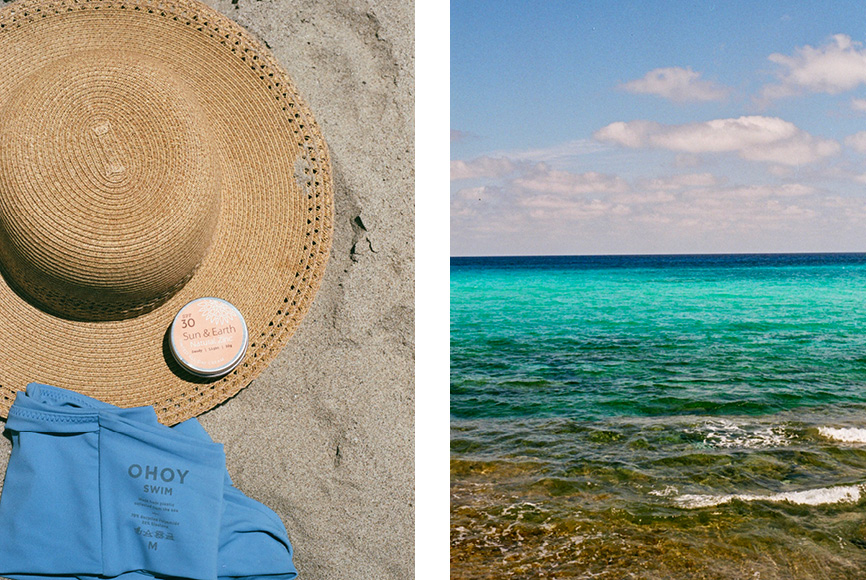
Related Editorial
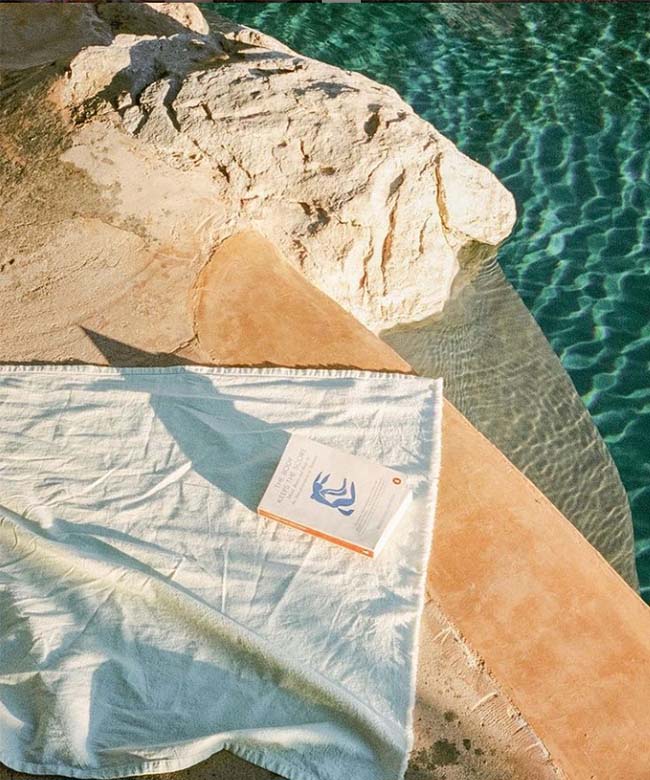
Our Favourite Eco Hotels in Ibiza
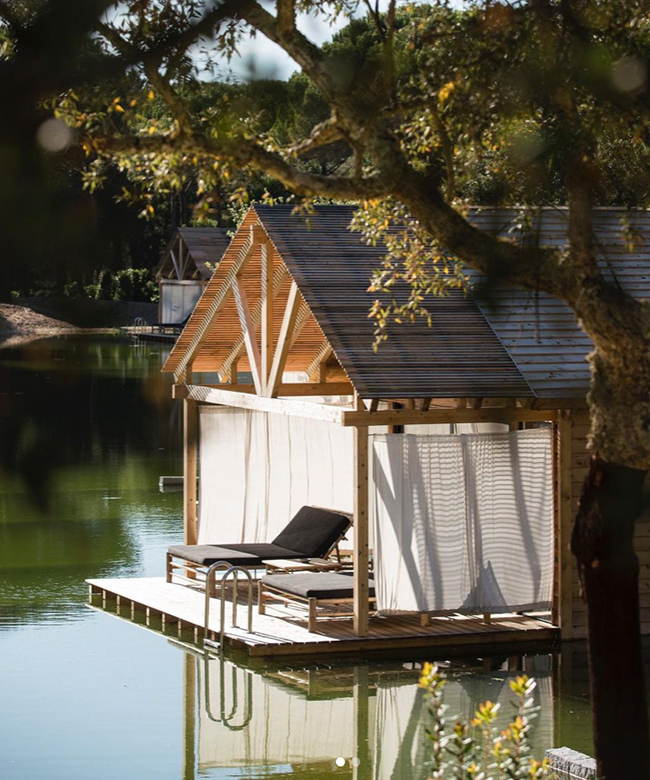
Our Favourite Eco Friendly Hotels in Portugal
Explore related.
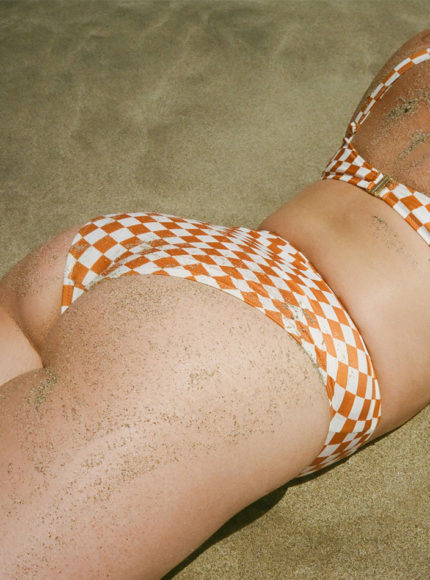
Tona The Label
Dolly high waist bikini bottom.
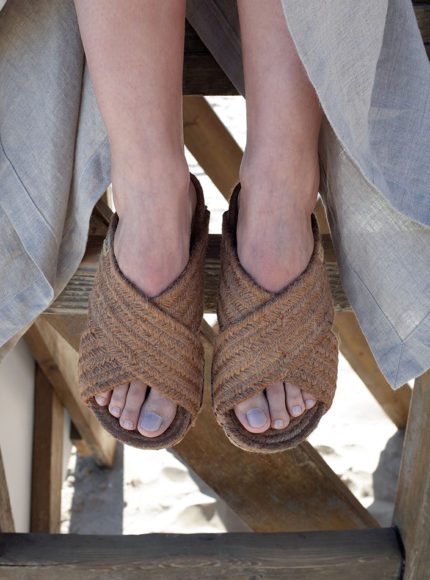
Accessories
Balears jute sandals in tostado, £ 148.
Reve En Vert is a sustainable luxury lifestyle website... customers are designers, architects, creative people who enjoy curating their spaces to feel like home. They appreciate high-quality, thoughtful
Rêve En Vert is the platform for sustainable living. We embrace brands that have the planet at the heart of their mission. Mother Earth is our flagship store.
Copyright 2024 Rev En Vert | Designed by Garden Studio
Sign up to our newsletter and receive 10% of your first order
- Our Climate Contributions
- Pricing Manifesto
- Returns & Exchanges
- Privacy Policy
- Terms & Conditions
- Change Currency (£)
Sorry, no results found. try searching for something else.
Join Our Sustainable Movement & Enjoy 10% Off Your First Order!
Sign up to the Rêve En Vert newsletter to get special access to pre-launches and exclusive collaborations and stay up to date with our content.
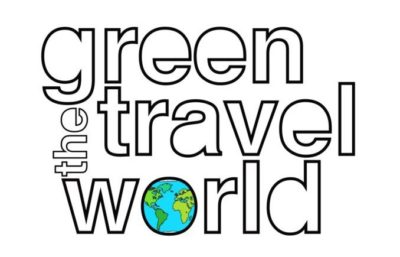
7 top eco hotels in Mallorca
What are the best eco hotels in Mallorca? Mallorca is probably best known for a party holiday and the Ballermann. But the island has much more to offer than just partying. Especially in the north there are very nice corners to explore. Furthermore there are many possibilities to travel sustainable and green. Therefore here are the best eco hotels on the sunny island.
Eco hotels in Mallorca
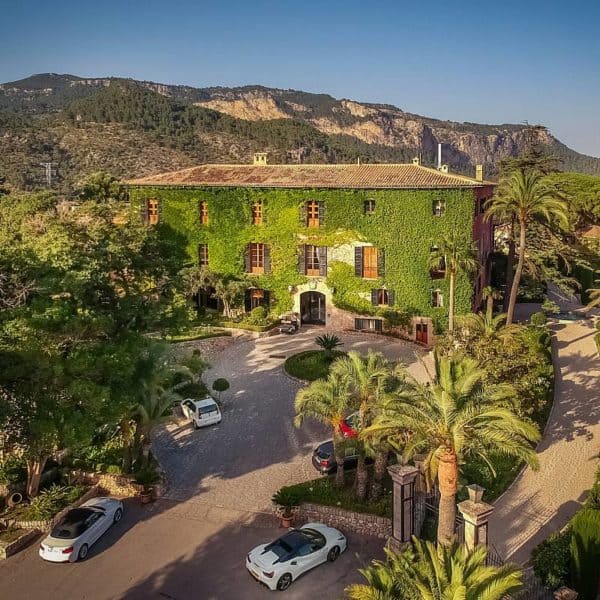
The Son Net Hotel convinces by elegant design in the nature. The hotel has its own garden and vineyards, so that meals are provided with fresh and local products. In addition, sheep, chickens and donkeys live on the premises and are integrated into the daily routine. Over the years the olive press used for the production of olive oil has been converted into a cosy restaurant. Speaking of olive oil: the hotel still purchases the oil from local traders, but the plan is to start its own production next year. Link: Son Net Hotel
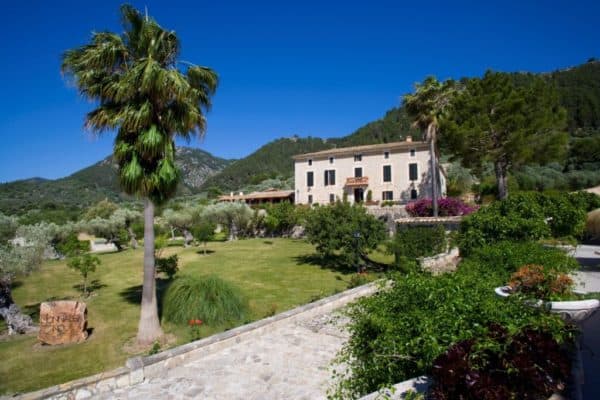
Monnaber Nou
In this hotel the lifestyle consists of health and sustainability. Energy is guaranteed by a photovoltaic system and local products are purchased for the kitchen. There are also beehives on the premises. Even the pool is ecological and is linked to the water consumption of the rest of the garden. A special feature of this hotel: they are committed to the reintroduction of endangered species, both tree species and animals, such as the Mallorcan sheep. Link: Monnaber Nou

Son Bernadinet
This hotel is entirely dedicated to the well-being of its guests. The beautifully designed pool and daily yoga classes invite you to relax. Children are very welcome. However, those who would like to enjoy some quiet hours can make use of the babysitter service. There is also an elegant solution for business meetings: simply rent the adjacent finca with pool. So business matters can be combined very nicely with leisure activities. The food offers an additional source of energy: the products are sourced from the hotel’s own organic garden and are therefore cultivated sustainably. Link: Son Bernadinet Hotel
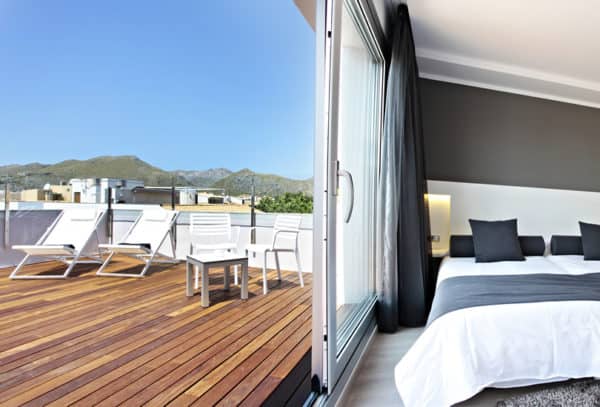
Marcalma Hotel
The Marcalma Hotel has already received a gold award for its philosophy of sustainability. With only 20 rooms, this eco-hotel offers an intimate atmosphere, far from the crowded tourist stream. Many green ideas are implemented for a sustainable lifestyle. The employees are all regularly trained in ecology and sustainability. In addition, mainly local products are purchased. Link: Marcalma Hotel
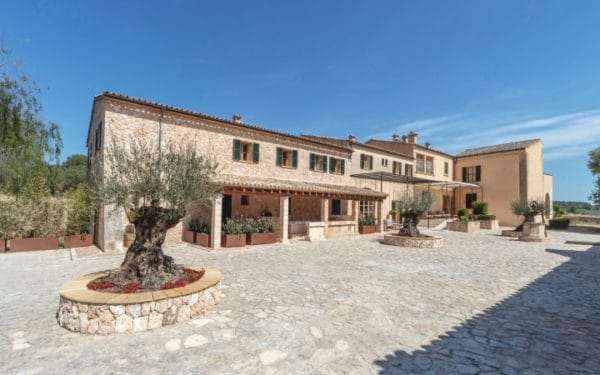
The old Mallorcan farmhouse has been transformed over the years into a welcoming and cosy ecological hotel. Here you can perfectly relax from the stressful workday in the middle of the green nature. Regional products are also bought here. There are even own gardens, which have been developed over the years. In the meantime more than 400 olive trees have been planted. link: Es Riquers
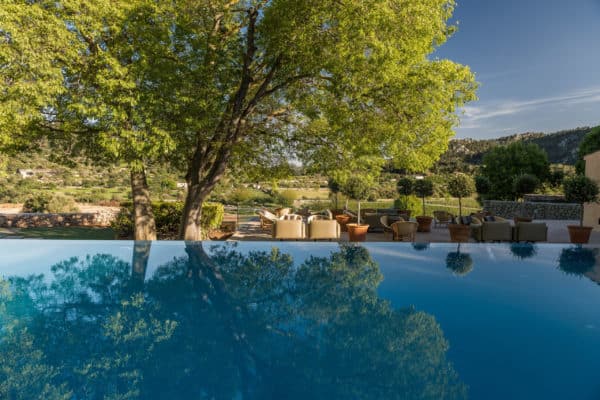
Son Brull Hotel & Spa
Here, too, we rely on regional cuisine. But this hotel goes one step further. You own a completely ecological farm. Above all, there are many fruit trees. Guests are welcome to pick their own fruit during the harvest season. This can of course also be consumed directly. There is no shorter and more sustainable way of transportation! Furthermore, the Son Brull Hotel wants to establish a “network” for seeds. Trees and vegetables will be planted on 40 hectares. The aim is not only to supply its own kitchen, but also to be able to supply other parts of Mallorca as a regional producer. Link: Son Brull Hotel & Spa
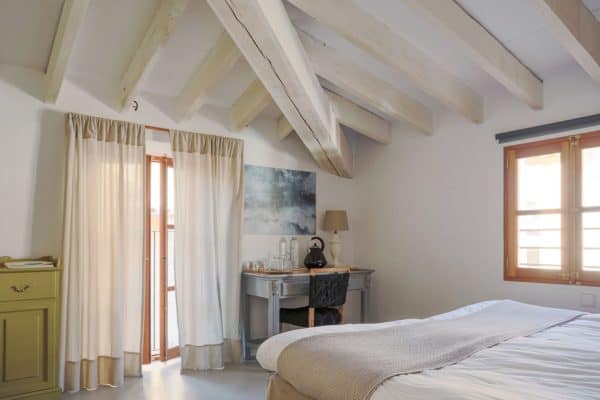
Ecocirer Hotel
The Ecocirer Hotel has a far-reaching guiding principle: we want to create a home for the future. Therefore there are many ecological ideas that are implemented in the hotel. So there is a healthy diet, which is mainly based on vegan and vegetarian food. The products are sourced from our own garden. The hotel itself is sustainably furnished in eco-design. According to the homepage 100% of the products are recycled in the hotel. This is what the future home can look like! link: Ecocirer Hotel
Addition: Sustainable shopping in Mallorca
Are you staying a little longer on the island, haven’t found any organic hotels on Mallorca that suit you or do you want to save a little money by cooking yourself? Then try organic supermarkets or local markets. There you will get your products mostly unpacked and fresh from the next farmer instead of imported. It also gives you more contact to the locals. Maybe they have some tips for you! Here are some organic supermarkets and local markets: Biodespensa, Bifokalem, Los Salbores del mundo, Santa Maria del Carmen, Possession of bile and many more!
Eco hotels in Mallorca are not your thing and you would rather explore Germany first?
Weitere Beiträge
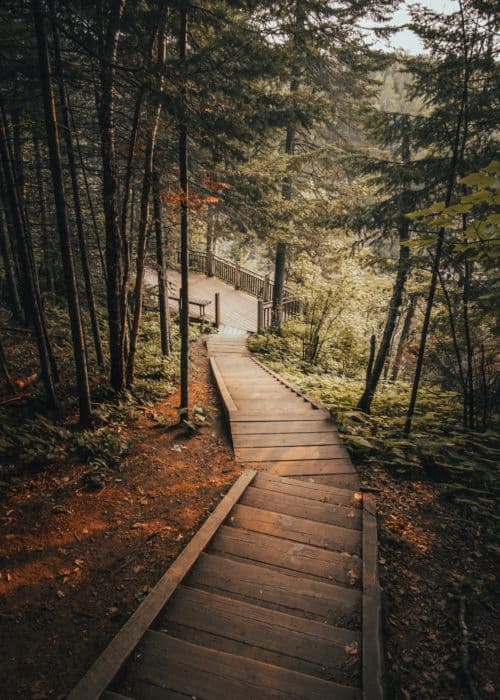
What is ecotourism?
Überblick zum datenschutz.
THE BEST Palma de Mallorca Eco Tours
Eco tours in palma de mallorca.
- Boat Rentals
- Gear Rentals
- Scuba & Snorkeling
- 5.0 of 5 bubbles
- Good for Kids
- Good for Big Groups
- Adventurous
- Budget-friendly
- Good for a Rainy Day
- Hidden Gems
- Good for Couples
- Honeymoon spot
- Good for Adrenaline Seekers
- Things to do ranked using Tripadvisor data including reviews, ratings, photos, and popularity.
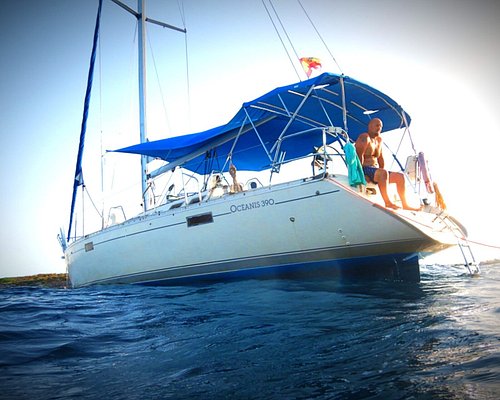
1. Sailin'Palma
2. Cruceros Dragonera
CAPTURE EVERY GOOD THING
But leave nothing but footprints, pick up trash you find, leave no trace.

Browse through organised Tours in Mallorca that are responsibly organised with the environment and sustainability in mind.
All providers that are listed here have committed to undertaking environmental measures in their operation.
Eco Rentals
Almost everyone on Mallorca holidays will rent something. Whether it's big or small it may have an environmental footprint. We gathered listings from local Rental places in Mallorca that care about the island and provide Eco friendly equipment you may need for your holidays.
Yachts and fun boats.
Cars, motorbikes, scooters, bicycles.
Kayaks, paddleboards, snorkel and diving.
Villas, apartments, rooms.
Eco Activities
With the growing number of Eco oriented businesses and residents there are plenty of activities that you can get involved in order to support sustainability and contribute to the better tomorrow of the island. Guarding turtle's nests, being part of the beach cleanup team or helping to spot plastic on a catamaran is just a few.
Find your Eco package
Look through easy categorised Eco Tours, Eco Rentals and Eco Activities on our website.
Contact your provider
Get in touch with provider of your Eco holiday package for booking either via website form or directly via phone or email.
Go & Enjoy
Get ready and Go! Rest assured that by choosing Eco services on our website you have already contributed to a better Mallorca.
Discover Mallorca at your own pace.
Self made Eco tours around the island are designed to be carried out on your own. The trails have been selected by our team and are supported by live GPS navigation system. Simply follow the trial on your mobile phone and rest assured you will never lose your way.
All live maps and guides are provided absolutely free of charge. We want you to discover the best of Mallorca.


Mass Tourism vs. Sustainable Tourism in the Balearic Islands. Measuring Social and Environmental Impact in Mallorca
Christopher J Moon *
Senior Lecturer in Eco-Entrepreneurship Management, Leadership & Organisations, Business School, Middlesex University, UK
* Corresponding author: Christopher J Moon , Senior Lecturer in Eco-Entrepreneurship Management, Leadership & Organisations, Business School, Middlesex University, UK. Tel: +4402084115409; Email: [email protected]
Received Date: 30 July, 2018; Accepted Date: 23 August, 2018; Published Date: 03 September, 2018
Citation: Moon CJ (2018) Mass Tourism vs. Sustainable Tourism in the Balearic Islands. Measuring Social and Environmental Impact in Mallorca. Tourism Hospit Ope Acc: THOA-118. DOI:10.29011/THOA-118.100018
1. Abstract
Mallorca is the largest of the Balearic Islands and enjoys significant economic benefits of tourism estimated at over €8bn per year [1]. However, this needs to be balanced with concern for social, economic and environmental sustainability [1] the impacts of which are largely undetermined. Recent Balearic government reports and statistics tend to focus on the economic impact of tourism [2]. This paper reviews the latest concerns about the environmental and social impacts of tourism on Mallorca and identifies gaps between the WTTC (2014) [3] recommended ESG framework and indicators referred to in the Govern de les Illes Balears Tourism Yearbook (GOB, 2015) [2]. The paper recommends ways in which these gaps can be bridged including which data can be gathered to better inform decisions. The focus of the research is Calvia municipality as this area has been criticised for its development policies in the past; and set a pioneering trend for using sustainable development indicators in 1995 though adopting Local Authority 21 indicators (LA21) based on the UN ‘Earth Summit’ convened in Rio de Janeiro.
2. Keywords : ESG Indicators; Mallorca; Social and Environmental Indicators; Sustainable Tourism
1. Introduction
Sustainable Tourism in Mallorca is under scrutiny due to the increasing numbers of tourists placing greater strain on local resources including energy and water; and acute problems over waste and pollution. The focus of this paper is thus on the measurement of social and environmental impacts and the need for sound indicators. Academics such as Royle (2009) [4] have used Richard Butler’s (1980, 2003) [5, 6] tourist area cycle of evolution as a basis for recognising the impact of mass tourism on the environment, culture and heritage of Mallorca. According to Royle, the emphasis on eco-tourism on Mallorca has had the bonus of attracting a different market sector; more interested in trips to forests, wildlife, walking, and golf and cycling. Plus, an added bonus might have been an increased spends per head from more affluent eco tourists.
For example, total annual income to the Balearic Islands from golf tourists rose from €198m to €234m between 2003 and 2008; and income from cycle tourists increased from €71m to €92m for the same period [7]. In fact, there has been a €187m turnaround campaign by the Government of the Balearic Islands (GOB) to change the face of parts of the island. However, one reporter for Reuters argues there is still little to suggest that resorts such as Magaluf are changing from ‘alchohol-fueled fleshpots’ [8]. What is clear is that the government needs to measure the impact of its policy; as Barcelo [2] starkly identifies above: there is an absence of reliable data to make decisions.
This paper identifies which indicators of sustainability have been used on the island thus far; and presents recommendations for new indicators as the GOB moves away from LA21 indicators (over 1,000) to Calvia 2020 objectives and beyond [9]. The paper provides implications for all islands grappling with the issues of mass tourism; and provides a basis for improved planning towards achieving 2030 goals [10]. The paper alsorecognises the significance of enterprise and entrepreneurship to building and maintaining a culture of innovation; including for responsible/sustainable tourism [11]. For an earlier review of Sustainable Tourism in Calvia see Dodds (2007) [12].
2. Background
The Balearic Islands, the most western archipelago in the Mediterranean, are made up of four main islands, Mallorca, Menorca, Eivissa and Formentera, as well as some one hundred other small islets. The island region boasts a diverse geography, with unique landscapes of vast beauty where seaside cliffs come together with beaches and white-sand coves.The Balearic Islands are the second most popular tourism destination in Spain, with over 11.6 million international tourists in 2015 [2]. The Islands are a leading cultural haven thanks to their rich architecture and heritage, which gives them a special personality and charm. This explains the innovative spirit that permeates the Balearic society and positions it as a benchmark for international culture. Mallorca is famed as a summer holiday destination but also unfortunately for ‘hordes of boozing Brits’. More intrepid visitors might be cyclists or hikers. Some visitors will know the names of famous celebrities that have homes on the Island such as tennis ace, Rafael Nadal, model Claudia Schiffer, or film actors Michael Douglas and Catherine Zeta-Jones.
More recently Mallorca was the location for The Night Manager TV series based on the book by John Le Carré (2013) [13]. However, very few visitors are likely to know about the history or cultural heritage of the Island or to have read Winter in Majorca by George Sand (1855) [14] or know about the Chopin museum or where Valldemossa is located. Indeed, very few visitors are likely to be familiar with the Islands detailed geography, maritime and trading relations, occupation by the Romans, the siege of Palma and the building of the Cathedral; or know how to find the ethnographic or archaeological museums, nor prehistoric sites.
3. Tourism industry
The tourism sector is the most important business sector in the Balearic Islands. Despite its limited surface area, the island boasts noteworthy climatic differences due to its relief and its location, leading to vastly diverse ecosystems and very different landscapes. This variety is manifest in three clearly distinguished areas. The first of these areas is the Serra de Tramuntana, an elevated mountain range that shapes the northern coast of the island. This area includes the highest peak in the entire archipelago, known as the Puig Major, which towers at a height of 1445m, as well as countless caves carved out of the rock, creating magnificent shapes sculpted by the wind, sun and water. In June 2011, the cultural landscape of the mountain was declared a World Heritage Site by UNESCO (figure 1.)
The next area is known as the Serres de Llevant, with small rounded hills that mark the landscape, creating white-sand coves and green pine forests. The third area is the Pla, or flatland, located between the two mountain ranges, with its own distinct morphological features, where the island’s rural charm has remained virtually intact.
The ecological wealth of the archipelago is the main economic asset of the Balearic Islands. The environment is the subject of various protection policies as the promotion of the rational use and saving of resources and the use of advanced treatment systems and waste disposal (figure 2).
In recent years, the Balearic Islands have been confronted with the challenge of sustainable and diversified growth. The objective of such challenge is to complement the ‘sun and sea’ supply [16] with new modes of tourism, so as to create a new demand for quality that still contributes to increasing tourist expenditure. The ultimate aim is to enhance the Balearic competitive edge by making use of innovative management methods and improving the professional training of the sector’s workforce.
The Balearic Islands were pioneers in the application of environmental management systems to the tourism sector, by introducing the EMAS system (Eco-Management and Audit Scheme). Among other initiatives, the EMAS system has implemented waste treatment by staff and clients, which entails the separation of hazardous waste for its transfer to specialised companies; water and energy conservation; the use of more environmentally friendly products, the use of biodegradable products; and bulk purchasing to reduce packaging. This campaign has also led to the installation of double glass in rooms and the shutdown of heating systems when guests are not in the rooms. Though, there is now a need to look beyond such tick box schemes [11].
One example of benchmark sustainable tourism management is the ‘Balearic Sustainable Hotel Network’, a non-profit organization made up of hotel sector companies that have made the commitment to protect the environment and that wish to promote the exchange of environmental experiences and contribute to sustainable development. For example, Garden Hotel is a family owned chain that has been awarded ‘Travelife Gold’ and has adopted a Zero km sourcing policy.
3.1. Rural tourism
Rural tourism has enjoyed remarkable growth since the mid-1990s. In 2015 rural accommodations opened are 222 and with the number of people estimated to be 4,327, the occupancy rate is 51, 43%, 35 points above the national average. In the Balearic Islands, this new form of tourism offers great potential, thanks to a number of qualities including: a good climate all year round; a qualified workforce; and a high daily expenditure.
3.2. Agri tourism
Unlike rural tourism, agritourism is based on a home with a limited number of beds, located in the countryside and at an agricultural farm, a livestock farm or a forest estate. These types of stays are generally longer and, therefore, generate greater revenues for the businesses. Moreover, this type of tourism affords guests the option of combining business with pleasure. Agritourism guests usually return for another holiday, and 60% of the time, they make their arrangements without going through intermediary agents.
The Balearic Islands have 248 agritourism establishments, and in 2014, the lodging capacity came to 3,886 beds (11.2% and 13.4% respectively from the previous year) (Figure 3).
The people of the Balearic Islands have an enterprising and innovative spirit. The Balearic Islands are the third autonomous region in Spain with the largest number of businesses per 1,000 inhabitants.
They are the headquarters of internationally renowned fashion and design firms that use quality production systems equipped with innovative, environmentally friendly technologies. The Balearics are home to powerful educational centres. In this sector, the role played by the Balearic Islands University [17] is essential, as it offers a wide variety of professional degrees to satisfy the needs for specialists in all areas of business and industry. Business Administration and Management, Economics, & Tourism have the largest number of students with 2,335 in 2015. One of the primary underpinnings of the Islands’ outreach to the knowledge society is the Balearic Technological Innovation Park [18]. The natural setting of the park is a privileged backdrop for R&D&i, which account for much of the park’s activity. The park also houses a technology business incubator, which serves professors, researchers and entrepreneurs with projects, offering them the opportunity to generate technology-based spin-offs.
Turistec (2018) [19] is a group of companies and institutions that produce and implement technological solutions for the tourism sector. This cluster brings together a knowhow equivalent to over seven hundred years of experience in the development and improvement of tourism destinations, and it is backed by an extensive portfolio of clients that includes leading companies in the hotel, air transport and maritime transport industries, tourism, leisure and culture, complementary services, travel agencies and virtually the industry’s entire chain of value. Headquartered in the Balearic Islands, this cluster is made up of 67 members, many of which are companies located in the Parc Bit. The bulk of the Balearic Islands’ companies are individual entrepreneurs (49% in 2015), followed by private limited companies (37%), while other business models account for the small remaining percentage. They are large international hotel chains, including Sol Meliá, Riu, Barceló and Iberostar, among others, are clear examples of the Balearic work model in the tourism sector.
3.3. Eco-entrepreneurship
The use of renewable energies is currently being promoted, with the aim of improving energy efficiency and introducing new sources of energy that enable the use of cleaner fuels. In the specific case of the Balearic Islands, the renewable energy technology with the greatest potential for development is photovoltaic’s followed by wind power. Biomass, due to its low energy output for the generation of electricity, has a potential for development in thermal applications. The aim is that in the long-term electricity production in the Balearic Islands comes from 100% renewable sources. Therefore, the attainment of environmentally sustainable transport would require the gradual replacement of liquid petroleum products with other environmentally sustainable fuels such as green tariff electricity, CNG and/or LNG and LPG. For this to be attained three courses of action can be taken into consideration.
• General use of electric vehicles for private road transport; the Balearic Islands are an ideal location for the development of this type of vehicle due to their geographical peculiarity and short distances.
• General use of industrial vehicles using natural gas or LPG/hybrid/electric vehicles for haulage.
• Research into the use of natural gas as an alternative to liquid petroleum products as fuel in the maritime sector, especially the commercial sector.
All of the above requires the development of a comprehensive infrastructure for recharging electric vehicles, the extension of the natural gas network throughout the region and an increase in the number of CNG, LNG and LPG filling stations. The application of the international and European regulations to climate change and the ensuing effects on the environment entail the implementation of initiatives that target compliance with the international and EC obligations regarding information, the commitment to reduce greenhouse gases, a control of atmospheric pollution and air quality, the steadfast commitment to more environmentally friendly energy sources and public transport. In this sense, according to the calculations of the European Union, the environmental sector is generating more jobs than the automobile and pharmaceutical industries. The global market for environmental products and services is projected to double from US$1,370 billion per year at present to US$2,740 billion by 2020 [20].
3.4. Current tourism economic data
In 2015 some 68 million tourists visited Spain and figures were expected to exceed 70 million in 2016. The Balearic Islands are the overall top choice of tourist destination (22% of Spain’s total in 2015) with 8.3 million registered overnight stays, principally from Germany (38%) followed by UK (28.1%).
This places pressure on the Balearic Island government (GOB) to support the building of more holiday accommodation. Yet, Palma is set to be the first city in Spain to ban rental of flats to tourists due to over-tourism concerns [21].The latest available official statistics [2] from The Institute for Tourism Studies (IET), the Statistical Institute of the Balearic Islands (IBESTAT) and the Balearic Ministry for Innovation, Research and Tourism, through the Spanish National Tourism Survey (Frontur) for tourist arrivals data and the Tourism Expenditure Survey (Egatur) indicate that tourists to Mallorca expended €8.124.448 of a total of €11.420.745 i.e. 92% for the Balearic Islands as a whole.
Such is the concentration of expenditure on Mallorca this also places pressure on the Balearic tourism authorities to ensure that the economic benefits of tourism are put to good use; providing jobs to local people, funds for infrastructure projects, conserving heritage, and supporting community projects. This is an economic issue as local people could be left unemployed and or priced out of owning their own property. However, this is also a sustainability issue as tourism in the long term relies on maintaining its image as a destination of choice for its unspoiled beauty. Thus, tourism needs to be ‘responsibly’ managed to ensure that the environment is not damaged and is protected for future generations. And decisions on tourism will increasingly need social and environmental data to be fully informed and impact evaluated.
Gabriel Barceló iMilta, Govern de les IllesBalears (GOB, 2015) [2] recognises the government has a commitment to promoting the development of socio-environmental statistics in this regard as an essential tool for strategic planning across the region. The aim would be to integrate this information into the operation of public administration and use it as a key element in developing and evaluating public policies, enabling tourism in the islands to be transformed into sustainable tourism.
3.5. Responsibility to generate and analyse socio-economic and environmental data
The first issue is whose responsibility is it to generate the data on sustainable tourism and manage tourism responsibly? Is it the tourist? Is it the tour operator? Is it the owners of holiday properties? Is it the local or national government? Is it the indigenous population? In one sense the responsibility is shared by all these parties. However, ensuring that this responsibility is acted upon can be fraught with difficulty. Many tourists might be just interested in having a good holiday away from the pressure and strains of everyday life, enjoying the sunshine and wanting to relax on the beach or in the hotel pool [16]. The availability of affordable hotels, food, restaurants, cafes and bars might be a prime consideration in their choice of holiday destination rather than answering questions on their social and environmental habits.Tour operators and the owners of holiday properties might simply be responding to this demand. Local citizens might blame the tourists or the government for the negative consequences of mass tourism [22]. The local and national government has an obligation to care for the environment (through environmental protection legislation) but what about the social and cultural environment? Do they have a duty towards sustainable tourism? Should this duty be codified and action towards meeting sustainability targets be measured and accounted for? What guidance is available to do this?
3.6. The problem with economic indicators
At a global level The World Travel & Tourism Council (WTTC, 2016) [1] is the global authority on the economic and social contribution of Travel & Tourism. WTTC promotes sustainable growth for the sector, working with governments and international institutions to create jobs, to drive exports and to generate prosperity. Nevertheless, despite gathering data on Travel and Tourism for 25 years their reports are still dominated by data on economic impact (see Figure 4).
According to WTTC, the direct contribution of Travel & Tourism to GDP is calculated to be consistent with the output, as expressed in National Accounting, of tourism-characteristic sectors such as hotels, airlines, airports, travel agents and leisure and recreation services that deal directly with tourists. The direct contribution of Travel & Tourism to GDP is calculated from total internal spending by ‘netting out’ the purchases made by the different tourism industries. This measure is considered by WTTC to be consistent with the definition of Tourism GDP, specified in the 2008 Tourism Satellite Account: Recommended Methodological Framework [23].
4. Results for Spain 2016
The basic message of the WTTC report cited above is that ‘Money Travels’ and ‘Travel Pays’. However, by focusing solely on economic indicators this overlooks key data on social and environmental impact. One of the key contentions of this paper is therefore that the WTTC should integrate economic impact with social and environmental impact producing annual triple bottom line reports from which governments and tourism agencies can make more informed decisions. Further, that by providing such data on a global level will allow national governments and local and regional governments a consistent methodology for comparing practices; and recognising the increasing significance of performance in this regard (Figure 5).
4.1. Social and environmental impact indicators
During 1995, in collaboration with the Ministry of Commerce and Tourism, the Calvia Town Council introduced the Calvià: Local Agenda 21, based on the ‘Rio 92 Summit’, aimed at defining a new integral long-term policy to reorganise tourist and local development on a sustainable basis (see appendix 1.).
Appendix 1 : Calvià: Local Agenda 21: A sustainable strategy for a tourism destination In the South West of the Mediterranean is placed Mallorca. On the western coast of the Island of Mallorca, is situated the Municipality of Calvià. Calvià has a surface of 145 sq. Km and 56 Km of coast.
80% of the Municipality are natural areas. Its coastline with 5 lineal Km of sandy beaches and numerous cliffs has an important environmental value. As tourism municipality Calvià is a privileged area in terms of facilities and infrastructure with many sport resorts, 5 marines, maritime promenades, 4 golf courses and leisure centres. Calvià has 40.000 inhabitants and more than 1.6million visitors each year.
The tourist development of Calvià, the most important in the Balearic Islands, began with the first boom of international tourism in Spain at the sixties. Since then, especially in the first two decades, the model of tourism development has been based on short-term interests, unlimited building out oftune with local conditions, and an unsustainable exploitation of exceptional natural resources.
It was only at the end of the eighties that the effects of this inharmonious development became apparent. The [impact] of sun and beach type, the keystones of an activity that helped to finance the development of the Island, are degraded, the demand is falling off, and more significantly, the quality, not only in terms of tourism spending, is in decline. Calvià grew from 3.000 to 40.000 inhabitants. In the eighties the Town Council of Calvià adopts a double policy: on one hand it has made an exceptional effort of investment to reduce the debt carried over from the earlier years, and on the other, it implemented a policy of town planning designed to uphold new tourist operations in the hope of modernising, improving and diversifying the local tourist industry. At the same time, the effect become evident: the deterioration of the environment and of the landscape, gross overcrowding of the tourist zone, the difficulties of bringing the installations to update, a steady decline of the allure of the region and the threat to local development which is heavily dependent on the tourist sector.
In the nineties, the town hall of Calvià launched a series of programmes designed to improve the environment, reorganise the flow of visitors, reclaim the coastal area and clear out the huddled town centre, even demolishing hotels that were offensive to the environment. This plan was called “Calvià for Excellence”. And at the beginning of 95 in collaboration with the Ministry of Commerce and tourism, the Town Council decided to unify the tasks in hand, freezing the approval of new urban-plans, and introduced the Calvià: Local Agenda 21, based on the Rio 92 Summit, aimed at defining a new integral long-term policy to reorganise tourist and local development on a sustainable basis , and in which the key factor for future projects is the environment.
A key factor of the local agenda has been to bring together the viewpoints, right from the start, of the different sectors with interests in the zone. Several channels of participation have been envisaged for this purpose: for general matters, The Forum of Citizens; for thematic affairs, Special Commissions; and even on subjects of general interest, polls and consultations of the public. The most important aspect for the final strategy of the Local Agenda 21 is that it counts on the widest possible voluntary support of the population. The method used by the experts is the one known in the planning sphere as “methodology of alternative scenarios”, widely used in long term planning because of its descriptive capacity and for the possibilities which it offers to compare possible future alternative situations, to which can be reached through the application of different policies.
In this way, three alternative scenarios emerged from each one of the key topic areas: the present one, and two future scenarios; the tendency one and the one known as integral rehabilitation scenario, which emerge is the correction of the undesirable tendencies by the introduction of suitable decisions. For each one of the areas the same methodology has been applied in order to get an identical result.
Using more than 1000 indicators, this methodology has allowed us to identify which sectors are in a balance situation and which ones in an unbalanced situation.
10 Strategic Action Lines
1. To Contain the Human Pressure, Limit the Growth and Help Integral Rehabilitation of the Territory and Its Coastline.
2. To Support the Integration and the Quality of Life of the Resident Population.
3. To Preserve the Natural and Marine Heritage.
4. To Recover the Cultural- Historical Heritage.
5. The Integral Rehabilitation of the Urban Areas.
6. To Increase the Quality of Calvia as A Tourism Destination: To Substitute the Growth for Sustainable Development and Look for the Increase of the Tourism Expenditure.
7. To Improve The Quality of the Public Transport and to Promote Cycling and Walking.
8. A Sustainable Management of the Environmental Key Factors: Water, Energy and Waste.
9. To Invest in Knowledge Resources, to Dinamise and Diversify ahe Economic System.
10. Innovation of the Municipal Government and the Widening Of Joint Public-Private Capacity of Investment.
From the 40 initiatives the Forum of Citizens agreed to begin with 15 initiatives they considered urgent.
1- To ensure sustainability of the Municipality through the main Urban Plan.
2- Stabilizing in 10 years the drinking water consumption to 1997 levels.
3- Elaboration of a local plan to save energy.
4- Impulse to save up, recycle and reuse of solid waste; fixing aims to separate waste at short, medium and long term.
5- Set up of a pilot project for rehabilitation of quarries due to the closing of the Dumping site for rubble; and separation, recuperation and recycling of material before March 1999.
6- Begin public actions to transform the situation of public transport before December 1998-07-16.
7- A Moratorium for 5 years of important works on the coastline as well as road infrastructures of high impact.
8- Conclusion of the “Calvià Walk Way” in 5 years.
9- Housing Plan “To live in Calvià” Construction and/or funding 150 homes/year.
10- Pilot action to conserve the beaches in a natural way before June 1999.
11- Creation of a helpline to start business before 31 December 1998 and widening the stimulation measures to small and medium size enterprises.
12- To start a working plan to dynamise the rural world and constitute an award and a call for proposals “Rural initiatives in Calvià”.
13- Environmental audit of the Municipal building before 31 December and engagement of future facilities “eco-responsible”.
14- Creation of the archaeological site “Puig de Sa Morisca”. Start before 31.12.1998.
15- Creation of an office in Calvià: Local Agenda 21; to assess the citizen’s promotion and awareness in the saving up of resources.
The Observatory for the Local agenda 21 proposed to collect and offer summarised, periodical and easily understandable information on the evolution of Calvià at social, economic and environmental level, taking as a reference the sustainability of development and local quality of life. Comparing to 1997, in 2000 the indicators and the initiatives that have been again measured, the results indicates that Calvià on the one hand has improved in the Areas of Cultural heritage, Economy and Tourism, and in Local town planning system, but on the other hand still have the Areas of Natural and rural land and marine systems, and key environmental sectors (transport, water, energy, and waste), which need to be improved. But in general the global evaluation has improved.
As a mature tourism resort in the Mediterranean all parts of the project could be applied in the Mediterranean region, from the methodology used to the environmental decision taken. We believe our case could serve as an example for emerging tourism municipalities and also for mature ones, on how not to repeat unsustainable practices and how to integrate local population in the process.
Comparing1997 to 2000, results indicated that Calvià on the one hand had improved in the areas of cultural heritage, economy and tourism, and in the local town planning system; but, on the other hand, still had the areas of natural and rural land and marine systems, and key environmental sectors (transport, water, energy, and waste), needing to be improved. Since then there has been much debate on how to evolve the system of reporting and which new indictors should be used. The authors of this paper thus look to more broadly used indicators in the travel and tourism industry.
WTTC (2014) [3] report on trends, outlook and guidance for Environmental, Social and Governance Reporting (ESG) indicating that transparent public reporting on material environmental, social and governance (ESG) risks, opportunities and performance is now both a common practice within, and even an expectation of, companies across all sectors, including those in travel & tourism. Nevertheless, although WTTC (2015) [24] shows that reporting in general has increased within travel and tourism, in number of actual reports published, this indicates quantity rather than quality.
Govern de les Illes Balears, (2015) [2] do provide an annual report of tourism. This Tourism Yearbook is produced by the Regional Ministry of Innovation, Research and Tourism as a compilation of the main indicators for tourism in the Balearic Islands. Indicators include: rural tourist accommodation not just hotels and apartments; golf courses not just bars and restaurants; passenger arrivals by sea not just by air; flight origin not just destination.
For example, the distribution of accommodation in (figure 6) reveals that, although hotels H account for 53%, other types of accommodation include: hotel apartments HA; tourist apartments A; hostel residence HSR; holiday villages CV; hostel HS; rural hotel HR; and city hotel HC. This distribution is also broken down by municipalities which aid an understanding of the spread of different types of accommodation across the Island.
Nevertheless, such aggregate statistics do not provide the necessary level of detail to fully inform decisions. For example, from the above figures agro-tourism AG, guesthouses CH, campsites TC, holiday villages CV, Fonda F, and inland tourism TI (in pre-1940 properties) are not adequately represented. Thus, other than aggregate statistics there is a need for more depth of understanding of social and environmental impact to inform practice.
Another perspective is to field information from sustainability narrative generated from events and interviews across the Island. For example, “Dreaming Mallorca” took place Oct 16-18 [25], near Selva, the ancient capital of Mallorca in the middle of the country.
Satish Kumar, editor of Resurgence Magazine, and Vandana Shiva, Indian environmental activist, invited a group of international visionaries to brainstorm with a group of 100 or so Mallorcans from all walks of life on the question of how to achieve a sustainable Mallorca. The group included various NGO’s, farmers, business people, including the tourist industry, foreigners having settled on the island, filmmakers, journalists from Eco-habitat and Namaste, two eco-magazines-a famous Mallorcan comedian and clown, and even a deep-sea diver wanting to build an ecovillage on the bottom of the sea.
The visionaries included Susan George from Attac France, Herbert Girardet, leading UK ecocity designer, José Bové, peasant leader from France, and Ross Jackson, Denmark, one of the leaders of the global ecovillage movement. The group considered a series of problems:
• An economy 85% total dependent on tourism, with entry through the enormous Palma airport (ca. 12 million per year).
• High energy dependence on gasoline and coal coming from distant places by ship. Mallorca has the highest number of cars per person in the world.
• 99% of the food is imported. Traditional agriculture and fishing are disappearing.
• Most wastewater is dumped directly into the ocean.
• Land is very expensive; and ownership is concentrated, with many absentee landlords.
Various ideas were generated to tackle the above problems such as: land reform along the lines of what Denmark has, where owners have a residential obligation and must cultivate the land following perm culture principles.
An airport tax and donations, with the money used to make Mallorca greener and cleaner, for example with improved waste water treatment. To introduce more wind and solar energy, and micro hydro systems in the mountains, to provide electricity for households and electric cars; and thereafter for drip irrigation in the plains and valleys. That tourism could be focused on longer stays, retreats for seniors, health tourism and bicycle tourism. Also, some hotels might be transformed into eco villages with pools, village centres, etc.
However, whilst such events can galvanise the human spirit and inspire various stakeholder actions, they do not provide the scientific basis or statistical platform upon which to base governmental decisions on tourism sustainability in general. Interestingly the group even felt that certain data was being repressed. From a methodological point of view, such a phenomenological approach can be highly illuminative for brainstorming creative approaches to tackling social and environmental issues but lack the level of assurance needed on which to base national or regional decisions. What is needed is a model for transforming from mass tourism to sustainable tourism such as that provided by the author in (figure 7).
Appendix 2. Data needs for sustainable tourism to 2020 and 2030, author table.
5. Conclusions
Mass tourism is alive and well in Mallorca. And the main driver of tourism policy still appears to be economic impact. However, there are signs that particular localised initiatives are having an impact in changing policy and action in regard to social and environmental concerns. Calvia municipality is a good example of how concerns over the poor image of Magaluf in the press, and a refocus on improving the local environment can have an effect on the quality of tourism experience provided [9].
Nevertheless, apart from LA21 and other such initiatives there is little direct evidence of the use of social and environmental indicators influencing Balearic government policy on tourism as a whole. For example, eco and sustainable tourism is still considered a marginal rather than mainstream activity across the Island.
If social and environmental indicators were more widely adopted then this would encourage more tour companies, accommodation providers and activity leaders to endorse these values and promote more proactive changes in lifestyle.
6. Recommendations
The main recommendation of this paper is to improve the quality of data capture on social and environmental impact across the Island. This would include more active collection of statistics on energy consumption, water consumption, the reduction of waste, and recycling. However, there needs to be an improved system to report and recognise such performance in order that tourist businesses across the Island regard this as more than window dressing. Island Sustainability indicators can be developed attuned to the most critical issues affecting the Island. Large and small businesses can thus integrate the indicators into policy and practice. And the best performers and those demonstrating new and creative ways to improve can be recognised in Island events and publications.
By adopting a consistent metric across the Island and including baseline and improvement statistics in the annual yearbook of tourism this will help to stimulate change. Yes, the Island needs to attract tourists for a longer season, even all year round, but sustainability means much more than increasing numbers of tourists and per capita spend. The sustainability agenda means developing new ways to convince tourists to take a more responsible approach to their entire holiday. This is likely to include more walking, hiking and cycling, and spending more time visiting nature and cultural attractions than drinking by the pool, but also needs to include a much higher regard for reducing energy, water and waste. Some suggestions for indicators are:
How many charging points are there on the Island for electric vehicles?
How many eco-friendly cars are being booked on the island and what CO 2 is being saved?
How many tourist accommodations have solar panels or other renewable energy systems?
What water saving measures is being adopted by tourist accommodations?
What incentives are provided by Balearic government and municipalities to encourage cycling across the Island, hiking, and use of public transport to and from the airports and during vacations?
What measures are taken to reduce waste packaging, litter and graffiti?
What is the increased uptake in alternatives to mass tourism such as visits to museums, galleries, cathedrals, villages, farms, etc?
What alternative tourist destinations are being taken up and why? How many are attending retreats, craft and art classes, music and other festivals, in or out of the city?
What new and smart measures are being taken across the Island to raise awareness of social and environmental impact; and how many new smart ideas are being implemented to improve sustainability e.g. education, ICT, etc?
The Balearic government can also set an example as a role model for sustainability by collecting data on its own performance including: number of employee journeys undertaken by car share, number of eco-friendly government vehicles being purchased, procurement of local organic produce for staff restaurants, office recycling rates, energy savings in buildings or CO 2 targets met. KPIs can even be integrated into official and officer performance plans and appraisals; and updated made available to the public.
7. Acknowledgement
Removed for anonymity
8. Biographies
9. Prizes awarded
• “Sustainable European Cities Award 97”. Brussels, November ´97. Awarded by the European Commission (DG of Environment) and the “Sustainable Cities and Towns Campaigns”.
• “Good practice for improving the quality of town life”. Dubai ´98. Selected by the United Nations.
• “Green Globe Award”. London, World Travel Market, November ´98. Awarded by the ”World Travel and Tourism Council” –WTTC.
• “Award for the best initiative, work and municipal effort in support of the environment”. Barcelona, March ´99 Awarded by Arthur Andersen and Expansion.
• “World project, Expo 2000 Hannover”. Hannover, March 2000.
Figure 1 : 3D image of Mallorca, Google images, 2018.
Figure 2: Protected natural areas in the Balearic Islands [15].
Figure 3: Growth in agritourism establishments. Ibestat, 2014 [15].
Figure 4 : Model of Travel & Tourism contributions, WTTC, 2016 [1].
Figure 5: 2016 Annual Research: Key Facts, Spain, WTTC, 2016 [1].
Figure 6 : Distribution of accommodation capacity according to type of establishment in Majorca, Govern de les IllesBalears, 2015 [2].
Figure 7: Transformational model of sustainable tourism, author figure (Appendix 2 ).
1. World Travel & Tourism Council (2016) Economic Impact. Spain.
2. GOB (2015) Anuari, El Turisme a les IllesBalears, Govern de les IllesBalears.
3. World Travel & Tourism Council (2014) Environmental, Social & Governance Reporting in Travel & Tourism: Trends, Outlook and Guidance.
4. Royle SA (2009) Tourism Changes on a Mediterranean Island: Experiences from Mallorca, Island Studies Journal 4: 225-240.
5. Butler RW (1980) ‘the Concept of a Tourist Area Cycle of Evolution: Implications for Management of Resources’, Canadian Geographer 24: 5-12.
6. Butler RW (2003) ‘Modelling Tourism Development: Evolution, Growth and Decline’ in S. Williams (ed), Tourism: Development and Sustainability, Volume 3 of Tourism: Critical Concepts in the Social Sciences, London, Routledge, 124-140.
7. CITTIB (2008) El Turisme a les IllesBalears: DadesInformatives 2008, Palma, Conselleria de Turisme.
8. Dowsett S (2016) Spain looks beyond record visitor numbers to boost tourist spend.
9. Calvià City Council (n.d.) Calvià Local Agenda 21: Best Practices Database,Calvià, Spain, Calvià City Council.
10. UN (2015) Transforming our world: the 2030 Agenda for Sustainable Development.
11. Batle J, Orfila-Sintesa F & Moon CJ (2018) Environmental management best practices: Towards social innovation, International Journal of Hospitality Management 69: 14-20.
12. Dodds R (2007) Sustainable Tourism and PolicyImplementation: Lessons from the Case of Calvia, Spain, Current Issues in Tourism 10.
13. Le Carre J (2013) the Night Manager, Penguin Books Ltd.
14. Sand, G. (1855/1998) winter in Majorca, forward and translation by R. Graves, Palma de Mallorca, CollecciónForadada.
15. IBESTAT (2014) Les IllesBalearsenXifres, Institute d’Estadística de les IllesBalears, Palma, IBESTAT.
16. Aguiló E, Alegre J & Sard M (2002) The Analysis of Tourist Demand as a Criteria in Destination Positioning. The Persistence of the Sun and Beach Tourist Model in the Balearic Islands, Palma de Mallorca, Universitat de IllesBalears Dept de Economia I Empresa.
17. UIB (2018) Universitat de les IllesBalears.
18. ParcBit (2018) http://www.parcbit.es/wparcbitfront/
19. Turistec (2018) http://turistec.org/
20. Coldwell W (2018) Palma de Mallorca to ban residents renting apartments to tourists.
21. ILO (2008) Green jobs Facts and Figures, International Labour Organisation.
22. Pack SD (2006) Tourism and Dictatorship: Europe’s Peaceful Invasion of Franco’s Spain, Basingstoke, and Palgrave Macmillan.
23. UN (2008) Tourism Satellite Account: Recommended Methodological Framework 2008.
24. World Travel & Tourism Council (2015) Travel & Tourism 2015 connecting global climate action.
25. Jackson H & Jackson R (2008) Dreaming Mallorca.
© by the Authors & Gavin Publishers. This is an Open Access Journal Article Published Under Attribution-Share Alike CC BY-SA : Creative Commons Attribution-Share Alike 4.0 International License. With this license, readers can share, distribute, download, even commercially, as long as the original source is properly cited. Read More .
Tourism & Hospitality: An Open Access
- About Journal
- Aims and Scope
- Board Members
- Article in Press
- Recent Articles
- Articles Search
- Current Issue
We use cookies for a better experience. Read privacy policy . Manage your consent settings:
Manage Your Consent:

IMAGES
VIDEO
COMMENTS
2 - Shop local brands. Mallorca is a vibrant island in many ways, not least because of the people. And many of its people are doing incredible things. There's no shortage of sustainable Mallorquin brands for fashion, footwear, cosmetics and more.
Eco-friendly ways to travel in Mallorca . Mallorca's capital Palma is a breeze to get around on foot or bicycle as it's so comfortable. You can use Bicipalma to hire bikes from various spots across Palma, or there are plenty of private companies from which you could hire segways too. You can also use the EMT bus network within the city.
Mallorca offers a range of opportunities, including olive oil and wine tastings, farm tours, and cooking classes, allowing tourists to immerse themselves in the local food and farming culture. In 2020, a study revealed an 8.5% increase in eco-tourism in the Balearic Islands, to which Mallorca belongs.
Nestled in the Mediterranean, Mallorca — the largest island in Spain's Balearics — is known for its breathtaking landscape, which includes dramatic mountains, beautiful Spanish architecture, and secluded coves. Also called Majorca, Mallorca is a prime destination spot for any eco-conscious traveler.
Are you looking to be an eco-friendly tourist? You aren't alone. The number of eco-tourists has surged in recent years and the market is projected to be worth nearly $334 billion by 2027. One of the most important things that you can do as an eco-tourist is choose the right destination. Mallorca is a great place for eco-friendly travelers to ...
Join me in this green journey, as we aim to ensure that the splendors of Mallorca remain intact for generations to come. Eco-friendly Travel Mallorca. Eco-Friendly Accommodations; Travel Green; Support Local and Sustainable; Be a Responsible Traveler; 1. Eco-Friendly Accommodations. Eco Finca Hotels: Experience Mallorcan tradition and modern ...
Sa Bassa Rotja, Porreres. 1. LJs Ratxo Eco Luxury Retreat, Sant Joan. The first eco-friendly hotel on this list is LJs Ratxo Luxury Retreat, located in the countryside of Mallorca near Sant Joan. At just 20 minutes from Palma, it's both well-connected yet a world away from the island's busy capital.
These experiences are best for eco tours in Majorca: 2 Hour Deluxe Segway Tour from Palma; Llaut boat. Explore south beaches; Rapita, Es Trenc & Es Carbó; 1.5 H Electric Kick-Scooter Tour; See more eco tours in Majorca on Tripadvisor
Mallorca is home to the highest mountain peak out of all Balearic islands, Puig Major, reaching a steep 1,436m in height. The mountain is located in the beautiful mountain range of Serra de Tramuntana, stretching across the Northwest coast of the island. Serra de Tramuntana is the perfect place for a day out hiking or biking, with magnificent ...
With plenty to do and a growing eco-tourism sector, there's no shortage of planet-friendly ways to get around and make plenty of discoveries off the beaten path. ... eco-tourism; travel; plant-based; mallorca; balearic islands; travel guide; spain; shop small; Related Posts See All. Must-Visits for Being Plant-Based in Paris. Top 15 Eco-Stays ...
The balance between sustainable tourism and development is a constant challenge. The regulation and management of tourist inflows, as well as the impact of climate change on local ecosystems, are key challenges facing Mallorca. Sustainable tourism in Mallorca. In recent years, the island has experienced a revolution in its tourism industry.
Sustainable Tourism Tax for a Sustainable Mallorca Introduced six years ago, this tax (often referred to as 'the eco tax') requires visitors to pay between 25 cents and €4 euros per day, depending on time of year and type of accommodation. It has proved to be a tremendous success.
The island has a long history of sustainable tourism, and today there are plenty of ways for travelers to enjoy their time in Mallorca without harming the environment. If you're looking for an eco-friendly travel destination this year, Mallorca should be at the top of your list. Here are eight reasons why:
Enjoy the Eco Charter Experience in Mallorca with free cancellation up to 24 hours in advance and the option to reserve now and pay later, ensuring flexibility for your travel plans. This activity focuses on nature immersion and sustainable tourism , offering a unique opportunity to connect with Mallorca's stunning natural beauty.
In 2022, the Balearics received about 16.5 million visitors, around the same number as pre-pandemic in 2019. For context, the whole of Andalucía, for example, welcomed about 30.7 million tourists in 2022, while Spain's eight Canary Islands had around 14.5 million tourists. Now, reducing summer visitor numbers, encouraging off-season travel and ...
Our Four Favourite Eco Hotels in Mallorca. As travel becomes a bit safer, we are thinking a bit about how we will eventually go back to traveling as consciously as possible. After a bit of a rainy summer here in the UK, the sunny islands of Spain have been calling to us and we were thrilled to see so many incredibly eco-friendly hotels in Mallorca.
Browse through Eco holidays activities in Mallorca with zero or minimal impact on the environment. Eco Tours listed here are designed for tourists who seek an Eco alternative for their vacations and wishes to contribute to conservation and nature preservation projects in Mallorca.
Mallorca is probably best known for a party holiday and the Ballermann. But the island has much more to offer than just partying. Especially in the north there are very nice corners to explore. Furthermore there are many possibilities to travel sustainable and green. Therefore here are the best eco hotels on the sunny island. Eco hotels in Mallorca
Eco Tours in Palma de Mallorca. THE BEST Palma de Mallorca Eco Tours. Eco Tours in Palma de Mallorca. Enter dates. Outdoor Activities. Filters • 1. Sort. Map. All things to do. Category types. Attractions. Tours. Day Trips. Outdoor Activities. Concerts & Shows. Food & Drink. Classes & Workshops. Shopping. Transportation. Traveler Resources.
We specialise in providing Eco Tours and Eco Rentals but also will hook you up with providers of Eco activities. Skip to main content CAPTURE EVERY GOOD ... Mallorca Eco Travel. C. del Conquistador, 10 Palma 07001. tel: +34 604 378 208 email: [email protected] web: www.mallorca.eco.
If you're in need of some slow living, look no further than this eco-friendly, healthy, and sustainable hotel in the mountains of Mallorca. Ecocirer, arguabl...
This paper reviews the latest concerns about the environmental and social impacts of tourism on Mallorca and identifies gaps between the WTTC (2014) [3] recommended ESG framework and indicators referred to in the Govern de les Illes Balears Tourism Yearbook (GOB, 2015) [2]. ... According to Royle, the emphasis on eco-tourism on Mallorca has had ...
Coasteering is ideal for nature lovers. Coasteering is a very original, exciting and sustainable way to explore the coast of Mallorca.And that's why this experience is on our list of eco tours in the Algarve. If you are looking for some adventure, then this sustainable tour to explore the Algarve coastline is the perfect activity to do.Coasteering involves swimming, climbing, cliff jumping ...
18 July 2023, Spain, Palma de Mallorca: Etienne from Biberach drinks water in hot temperatures on the beach of Arenal. For the north and east of the Spanish Mediterranean island of Mallorca, the ...